AP course offerings reduced
By Everett Lakey
The school will replace multiple Advanced Placement (AP) classes from the curricula of the Math, World Languages and History Departments with honors courses in the 2024-2025 school year.
AP Economics, AP French Language and Culture and AP Human Geography and Urban Studies are being replaced by Honors Economics, Honors French IV and Honors Urban and Ethnic Studies, respectively, according to Faculty Academic Committee (FAC) Chair and Science Teacher Heather Audesirk. Audesirk said the decisions to replace these courses were made by individual teachers and departments, rather than the school administration.
“I believe that the reason for changing from AP Econ to Honors Econ was to allow the teachers to utilize the full class year to teach content rather than losing the last month or so to reviewing for and taking the AP exam,” Audesirk said. “For AP Human [Geography], the course didn’t truly follow the AP curriculum to begin with, and the school was hoping to offer an Honors Ethnic Studies class, so the change seemed like a natural move that suits the curriculum that is actually being taught and the interests of the school and students.”
Head of Upper School Beth Slattery said the transition to honors courses was inspired by teachers feeling discontented with the restraints inherent in AP curricula.
“It feels like the dominoes are falling because a lot of our teachers feel the AP curriculum is really limiting,” Slattery said. “[The] standard curriculum hasn’t always evolved in the ways that I think some of our teachers would like to teach. I’m personally not a fan of APs, and that’s just my own particular preference because I think our teachers can design better classes than the College Board.”

51 percent of senior class applies to same 14 schools in ear l y round
By Hannah Shahidi
The Class of 2024 received their early admissions decisions last December, with 51 percent of the students who applied early applying to the same 14 schools, according to the Deans’ Office. There were 206 total students in the class who applied either Early Decision I (EDI), Restrictive Early Action (REA) and Single Choice Early Action (SCEA) to various colleges. The school could not provide exact statistics regarding the early rates of the senior class.
The schools include the eight Ivy League schools in addition to Duke University, Georgetown University, the Massachusetts Institute of Technology, Northwestern University, Stanford University and the University of Chicago, according to Head of Upper School Beth Slattery.
Slattery said students’ decisions regarding where to apply early are often influenced by the previous class’s matriculation.
“Last year’s class did so well, and that emboldened people,” Slattery said. “When one class does well, the next class thinks everybody will get in. The other thing is that more than half of [the] class applied early to 14 schools, and those 14 schools are
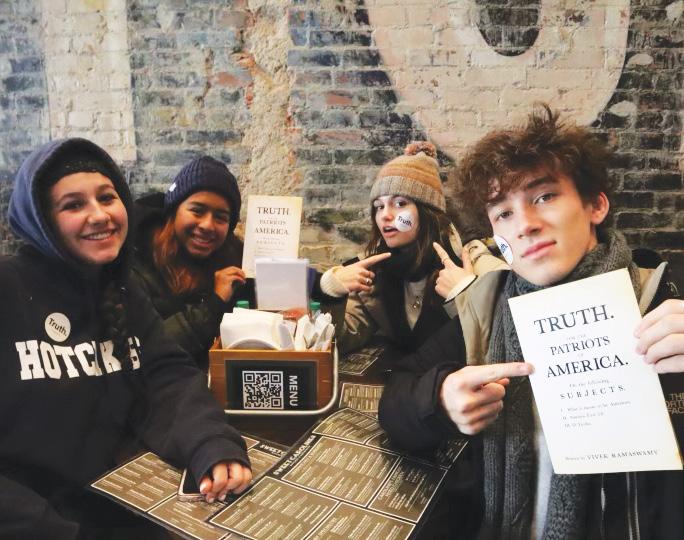

the most selective schools in the country. Most of these places, even if they’re nice to us, are not going to take 20 kids.”
Slattery said for some students, applying to top colleges is not a good use of the early decision process and ends up making the regular round more competitive.
“For plenty of those kids, those schools are legitimate options, and it just didn’t work out,” Slattery said. “But for some kids, it was not a good decision, and they went against advice. It’s going to make regular [decision] a challenge because there’s lots more people left in the pool.”
Slattery said grade inflation may have taken place over the past four years.
might think you’re eligible, but you don’t stand out as much.”
School designates holiday
By Connor Tang
The school announced that it will designate Lunar New Year as a day off for students and faculty in an effort to be more inclusive of hundreds of Asian American Pacific Islander (AAPI) students at the school, according to Head of Upper School Beth Slattery. The 2024 Lunar New Year holiday falls on a weekend, meaning students will not be given a day off, but a one-day break will occur in January 2025 and every year following for the forseeable future.
The administration’s action comes amid a similar decision made by the Los Angeles Unified School District (LAUSD), which passed a resolution that recognized Lunar New Year as a holiday for all students, according to Slattery.
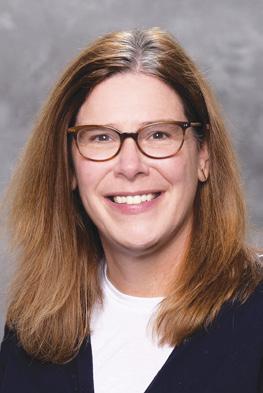
“There’s an argument to be made that grades could have felt inflated during the four years,” Slattery said. “Grades were certainly inflated during COVID, and I feel like the year we came back, they were also inflated. We froze grades last year, so I wonder if, for a lot of kids, their grades were better than they might have been. If your Grade Point Average [GPA] is really high, you
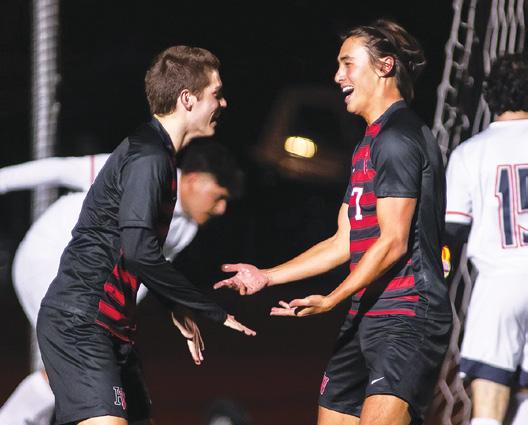
According to a Chronicle article from December of the 20222023 academic year, the school made the decision to add weighted GPAs back to transcripts to help students distinguish themselves in college admissions. The school had removed weighted GPAs for the Classes of 2022 and 2023. They reintroduced them onto transcripts for the Class of 2024 along with unweighted GPAs, making this year’s seniors the first in two years to apply to college with both GPAs on their transcripts. Despite this, Cuseo said the change had no impact on admissions during this year’s early cycle.
“The colleges have access to the same information that they always have,” Cuseo said. “We are just now making it easier for them to use whatever [GPA] is going to be most helpful. There is no world in which they didn’t care as much about rigor. They figured it out on their own when we didn’t provide [weighted GPAs] and they figured out unweighted [GPAs] on their own when we didn’t provide that.”
Although Lunar New Year festivities differ between cultures, people who celebrate typically spend the holiday together, eating cultural foods and partaking in traditional activities. In acknowledgment, Slattery said she wanted to provide students with a day off to allow them tocelebrate the holiday.
“There’s a threshold about events like that for a large segment of our population that would involve some kind of observance during the day,” Slattery said. “People may travel, want to spend the day cooking or want to be together. We have a large [AAPI] population, so it felt compelling.”
Slattery said the idea was first brought up a couple of years ago when students at the Middle School decided to speak with administrators about the possibility of designating the day as a holiday.
Chazzy Cho ’25, one of these students, was one of several leaders of the Asian American Culture Club (AACC) when he was at the Middle School. Cho decided to push for the day off for Lunar New Year alongside his co-leaders, Lauren Park ’25 and Hudson Chen ’25. •
• Continued on A2
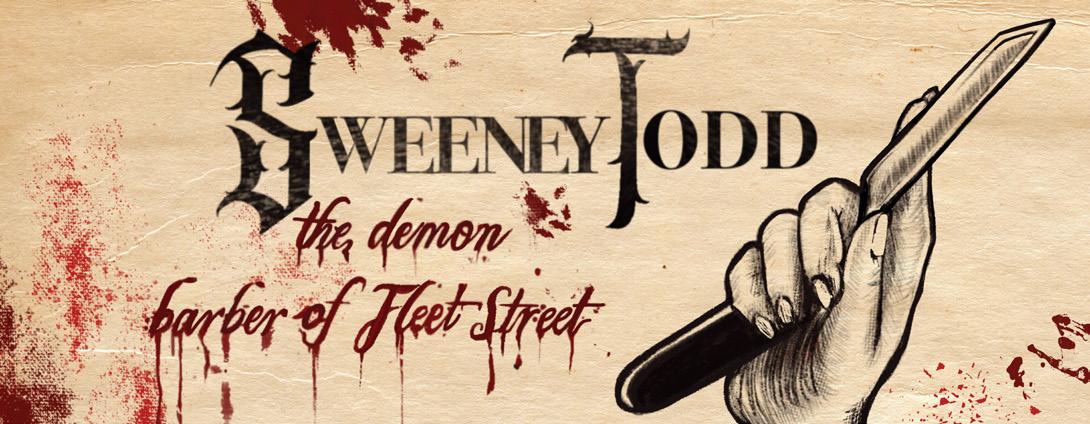
 SENIOR STATS: Seniors focus on a lecture in Advanced Placement (AP) Statistics after receiving college decisions. From the Class of 2024, 206 students applied Early Decision, Restrictive Early Action or Single Choice Early Action.
HANNAH SHAHIDI/CHRONICLE
SENIOR STATS: Seniors focus on a lecture in Advanced Placement (AP) Statistics after receiving college decisions. From the Class of 2024, 206 students applied Early Decision, Restrictive Early Action or Single Choice Early Action.
HANNAH SHAHIDI/CHRONICLE
Continued on A4 Harvard-Westlake • Studio City • Volume 33 • Issue 5 • February 1, 2024 • hwchronicle.com INTHIS ISSUE • Continued on hwchronicle.com D2 Fantastic Fortunes: Community members discuss their changing relationships with spirituality in a modern age. Buy your Ticket: “Sweeney Todd” is holding performances Thursday, Feb. 8, Friday, Feb. 9, Saturday, Feb. 10 and Sunday, Feb. 11 in Rugby Theater. Reserve a free ticket using the QR code. Kickin’ It: After winning the Mission League, Boys’ soccer hopes to dominate in search of a CIF title. Investigating Iowa: Student journalists travel to Iowa to interact with citizens and report on the 2024 Iowa Caucuses.
L. Wood
B7 A3
Beth Slattery
School honors holiday
• Continued from A1
Cho said he was inspired to do so after seeing the school's lack of acknowledgement for the holiday.
“It was in ninth grade during the Lunar New Year, and all [the administration] did was send an email,” Cho said. “I looked at the schedule because there was a Flex Day the week after Lunar New Year. I was thinking, 'Why couldn't they just move it up, and show more appreciation for all the Asian students at the school?'"
Park said they then presented their case to the administration. The students waited, and after a year without resolution, they followed up with their case in their sophomore year with the Assistant Head of School for Community and Belonging Janine Jones, who then pitched it to the upper school administration. Another year later, the administration officially designated Lunar New Year as a holiday.
Park said Jones' help was crucial in connecting them with the upper school administration, and that she is thankful for Jones' commitment to upholding diversity, equity and inclusion (DEI) principles.
"Jones was a huge advocate in all the DEI work that we were involved in," Park said. "When we brought [our proposal] up to her, she guided us through the process of how we could get it approved and who the right people were to go to on campus. I'm really grateful for her."
Cho said he is grateful for Chen and Park, who helped advance the idea, and the administration, for inspiring and executing their ideas through a long process.
“None of this would’ve happened without [Chen] and [Park], so they deserve credit,” Cho said. “I’m also appreciative of the administration. We were able to give them the idea, but there's a lot of consideration that goes into schedule changes and getting days off. It’s awesome, and I’m proud.”
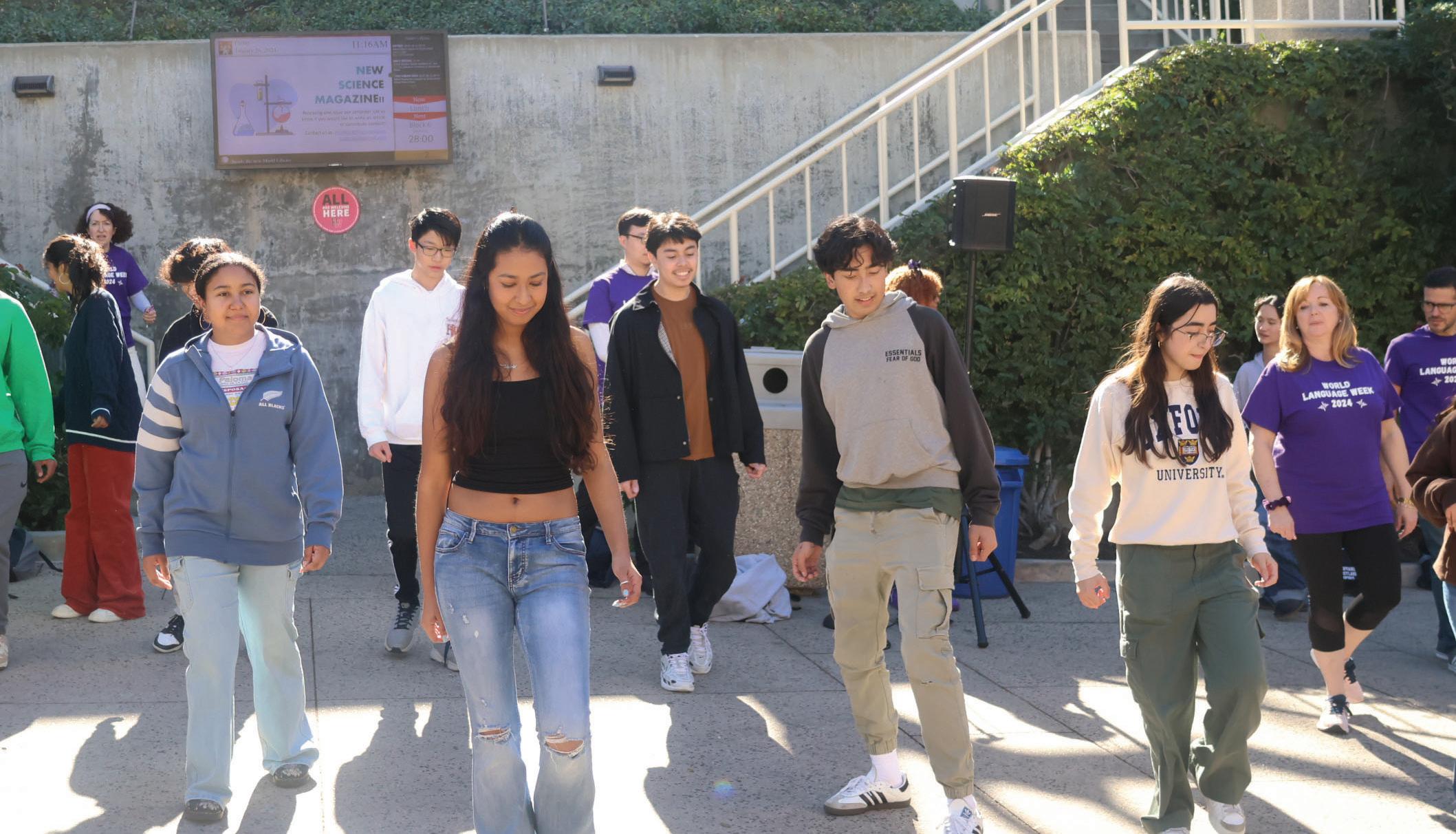
World Languages Department introduces annual World Language Week festivities
By Nathan Wang
The World Languages Department hosted its first-ever World Languages Week celebration Jan. 22-26. Throughout the week, the World Languages Department, in partnership with Student Leaders for Inclusion, Diversity and Equity (SLIDE), organized cultural activities on the Quad and curated music playlists featuring different languages and cultures. The World Languages Department also arranged cultural clothing themes throughout the week.
The week featured activities such as face painting, salsa and Bachata dance, Afro-Caribbean Bomba, traditional Armenian dance, Chinese singing and more.
Upper School World Languages teacher Sephora Escarpeta-Garcia said she took inspira-
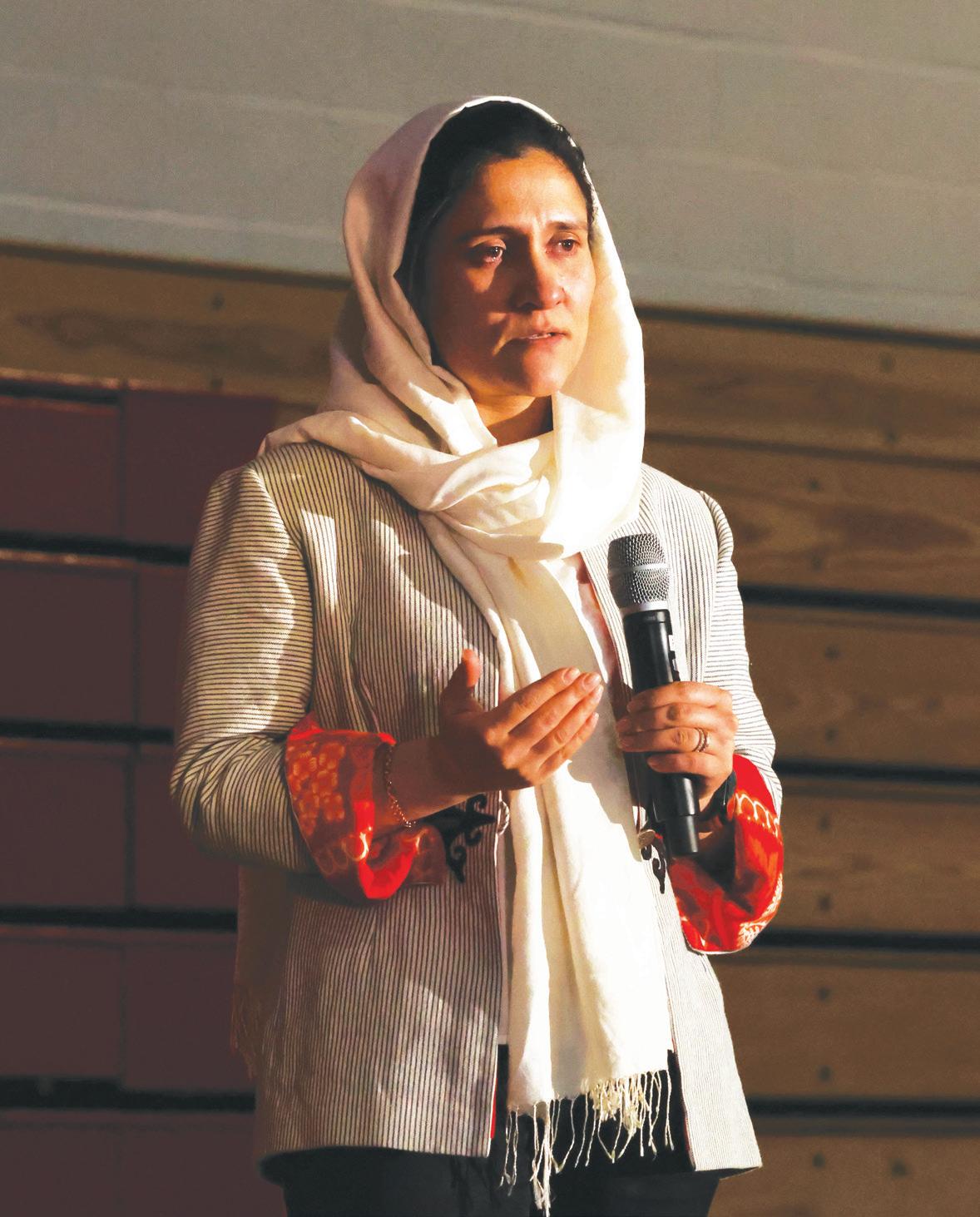
tion for World Languages Week from seeing a lack of confidence in sharing different cultures.
“I wanted [World Languages Week] because, as language learners, sometimes we're afraid to share cultures,” Escarpeta-Garcia said. “I want [our students] to not only find their voice in their culture but also come out of [their] shyness. I want us, as a department, to what we do in our classes. We have a lot of fun in our classes, and we do a lot of activities across the languages. We wanted to bring those voices into the community.”
Escarpeta-Garcia said the World Languages Department also aimed to emphasize the school’s cultural diversity.
"[The celebration] had a cultural focus,” Escarpeta-Garcia said. “It's not just the languages that we teach here. We have a lot
of kids from very diverse cultural backgrounds, and I'd like to see them find a safe space where they can express themselves in whatever language or culture they practice at home.”
As a part of World Languages Week, most language teachers provided extra credit for student participation in the festivities.
Avery Kim ’25, who participated in cultural dancing activities, said he gained a greater appreciation for numerous cultures that are often underrepresented in his daily life.
“I joined in on the World Language Week celebration because I initially saw my friends participate in it,” Kim said. “After dancing for a little bit to music and having fun, I realized the value of celebrating the diversity of the school’s culture. It is a special thing to be able to
celebrate so many cultures and languages because outside of my Chinese class and at home, I don’t feel connected to many other cultures.”
The Armenian Club shared Kham-Khama, a traditional dance from Western Armenia. Armenian Club leader Eric Vartany ’24 said the dance on the Quad was an opportunity to highlight Armenia’s cultural sophistication.
“It's really interesting because every culture has its dance, music and everything,” Vartany said. “Dance is just one way to explore and indulge in a new culture. It's a great opportunity to share culture with the rest of the student community that might not know too much about Armenian culture. We're a small people, but we'd like to take up this opportunity to make our culture heard.”
Girls’ education activist presents
By Zoe Goor and Kayla Graff
Girls’ education activist and co-founder of the School of Leadership, Afghanistan (SOLA) Shabana Basij-Rasikh spoke about her mission of teaching Afghan girls at this year’s Brown Family Speaker Assembly on Jan. 8.
The speaker series, which was started 22 years ago by Linda and Abbot Brown (Russell '94, David '96), provides the school community with opportunities to hear from renowned speakers and panels.
Basij-Rasikh grew up under the first Taliban regime in Afghanistan, where girls were forbidden from attending school. Her family sent her and her sister to a secret school run by a former high school principal in her home. Basij-Rasikh said she understood from a young age the danger of seeking an education as a female under the Taliban’s regime.
“The woman in charge [of the secret school] had one message for us,” Basij-Rasikh said. “She would
say, ‘As soon as you walk out of this house, walk away as fast as you can. If you get caught by the Taliban, don’t bring them back [to the secret school]. Fewer people will be killed in your house. More people will be killed here.’ I cannot believe we understood that, but we did.”
In 2001, the Taliban was toppled, and girls were able to attend public schools. When she looked out at her classmates on the first day of school, Basij-Rasikh said she realized everyone in her grade was at least six years older than her. She said in that moment, she grasped the magnitude of her parents’ sacrifice.
“On that day, all I could feel was shame and gratitude and privilege,” Basij-Rasikh said. “All I wanted to do was leave and hug my parents because what I knew was that my life was going to be so different than my classmates.”
Basij-Rasikh went on to study at Middlebury College, where she co-founded SOLA in 2008 as part of her mission to educate Afghan girls. SOLA, a boarding
school for girls, was originally located in Afghanistan. The start of the Taliban's second regime forced them to relocate to Rwanda, where the school currently resides. Basij-Rasikh said SOLA aims to educate girls so they can improve the future of Afghanistan.
“The idea behind SOLA is that we can achieve true peace in Afghanistan by investing in the education of Afghan girls,” Basij-Rasikh said. “The true inspiration behind SOLA really is the power of girls.”
Basij-Rasikh said the issue of female education in Afghanistan should not fly under the radar.
“Afghanistan is the only country on Earth where girls’ access to education is illegal,” Basij-Rasikh said. "The world's attention matters."
Middle Eastern Student Association (MESA) co-leader Lila Daoudi ’24 introduced BasijRasikh at the beginning of the assembly. Daoudi said it is essential for students to be informed about global events.
Feb. 1, 2024 A2 News The Chronicle
CONNOR
THE FIGHT FOR RIGHTS: Shabana Basij-Rasikh was selected as the 2024 Brown Family Speaker for her fight for equal girls’ education.
TANG/CHRONICLE
A WEEK OF WONDER: The World Languages Department organized and hosted the first-ever World Languages Week. On the last day of the celebration, LatinX Hispanic Student Organization (LAHSO) co-leaders led line dances on the Quad for students to participate in.
NATHAN WANG/CHRONICLE
• Continued on hwchronicle.com
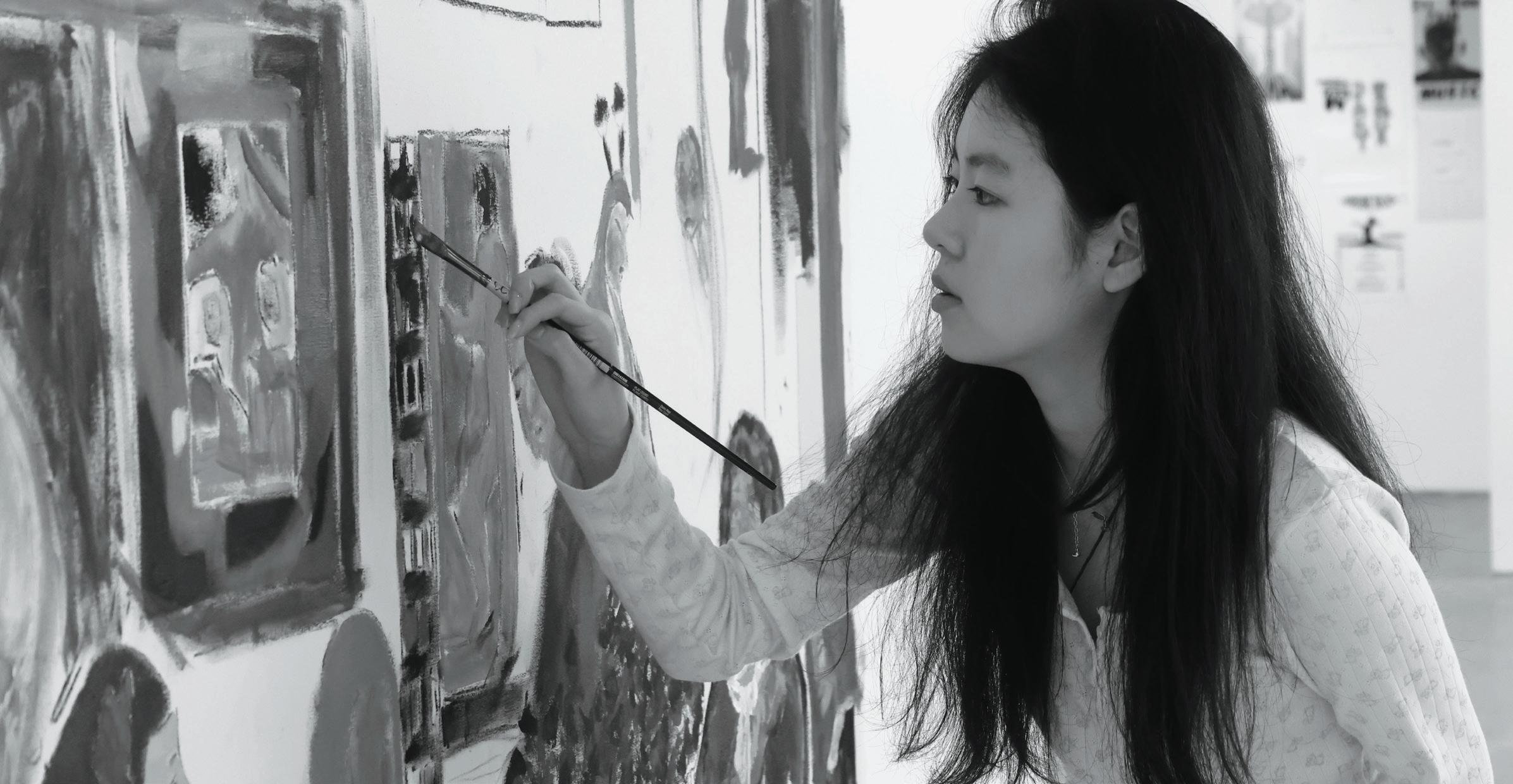
School hosts foreign exchange students from school in China for first time since COVID
By Connor Tang
Six high school students from China visited the school as a part of an exchange student program from Jan. 22 to Feb. 2. The students came from the World Leading Schools Association (WLSA), an international school in Shanghai that aims to connect with schools globally through education. Consequently, they organize annual exchange student programs to other countries’ schools.
In 2020, the school, in partnership with this global program, agreed to host WLSA students.
Shanghai and would send their own to China for an assortment of internships and programs. Patterson said the importance of interactions between the school and exchange students was one of the main reasons he wanted to restart the program.

Director of Kutler Center Jim Patterson has run the exchange program since the school first joined the global program with WLSA over 10 years ago. Before the COVID-19 outbreak, the school accepeted students from
“It’s great to have these kids, who come from a place that in many ways is completely different than living in LA,” Patterson said. “In many ways, they are living the same lives our students are, in terms of the their goals for college, university and their lives. It’s really an amazing opportunity to meet and really develop friendships with kids in other parts of the world.”
During their visit, the exchange students attended classes and experienced life on campus. They were encouraged to observe life at a foreign school and absorb
new learning methods. Outside of school, the students also attended school sports games, visited landmarks across the Los Angeles (LA) area and toured local universities.
The trip was organized by Patterson in accordance with the director of the exchange program Jessie Xie. Xie is also from Shanghai and serves as a college counselor for students at WLSA. Part of her job working at an international school involves helping students apply to colleges in the U.S.
Xie said the most exciting part of the exchange is seeing the students learn about new cultures in a foreign environment.
“They’re young and energetic,” Xie said. “It makes you happy that they love to learn. You’ll see that they’re curious about exploring a different environment and a different home.”
Lisa Suen, an exchange student, is currently a junior at WLSA. Suen said her experiences at the school made her feel that
Presidential Scholars nominated
By Sienna Dall’Olmo
Nine seniors were nominated for the 2024 United States Presidential Scholars Program. The program, established in 1964, was designed to recognize scholastic achievement among high school students in the nation. Since then, the program has broadened its scope to honor students’ artistic and technical talents.
The nominees are Presentations Managing Editor Kriste An ’24, Emily Ba ’24, Arin Budhiraja ’24, Aidan Deshong ’24, Ian Kim ’24, Alex Lee ’24 and Sophia Vourakis ’24.
Kim was nominated as a Presidential Scholar in the Arts.
High school seniors across the nation are invited to apply to the program based on their standardized test scores, and nominees are selected from each state. The National YoungArts Program selects up to 60 finalists from their competition to nominate for the Presidential Scholar Award in the Arts.
Deshong said though being nominated is exciting, it comes with a number of responsibilities.
“The Department of Education
sent me an email with no subject line,” Deshong said. “It’s cool to be nominated, but at the same time, I have this new responsibility to write a lot of essays, which is not the most exciting thing in the world.”
Kim said as a nominee for the Presidential Scholars in the Arts, the application process was personalized and focused on his connection to his pieces.
“I was one of 60 people who were nominated to be a Presidential Scholar in the Arts, and unlike the regular Presidential Scholar program, the nominees were taken from seniors who had won the National YoungArts Competition, which includes both visual and performing arts,” Kim said. “Being an extension of an arts competition, a lot of the application is writing about why you do art and the impact you want your art to have.”
Vourakis said although the nomination can be seen as a reflection of students’ consistent dedication to academic achievement, the award itself focuses on students as a whole.
“We all know the nominees are
bright and committed to academic excellence inside and outside of the classroom, not just on a standardized test,” Vourakis said. “In that respect, who the nominees are as individuals is, in fact, much reflected in their scores. Beyond the nomination stage, there are plenty of essays and consideration of the students’ personal interests and circumstances, so the actual award is focused on the whole person, not just on [their] scores.”
Deshong said although the nomination process is based on standardized testing and lacks personal aspects, it only reflects the academic commitment and ability of students.
“It looks like nomination depends only on standardized test scores, so I don’t think they represent much about people other than their ability to answer a specific set of questions on one Saturday morning,” Deshong said. “To be fair, there might be a decent correlation between being able to do that and being ‘academically excellent,’ whatever that means. But the nomination process needs a human component, and [so] it has one to narrow the list.”
Students take trip to Iowa Caucuses
By Jack Ryan
A group of students visited the 2024 Republican Iowa Caucuses from Jan. 13 to 15. They attended rallies of various presidential candidates, including former President Donald Trump, Florida Governor Ron DeSantis, former U.N. Ambassador Nikki Haley, and businessman Vivek Ramaswamy. The group also interviewed Iowan voters during the caucusing process.
Rowan McCarty-Simas ’24 said the trip made her more aware of the differences between Republicans and Democrats and caused her think about the direction the nation is headed.
she was better suited for school in the U.S.
“American schools suit me more,” Suen said. “Both the teachers and the people here are just different from Chinese tradition.”
Julien Liu ’25, who is American-Taiwanese and speaks fluent Chinese, volunteered to have Suen shadow him. He ensured that Suen knew how to get around campus as she attended all of his classes.
Liu said taking Suen around campus allowed him to learn about how high school education works in China.
“Their schools are very academic,” he said. “Harvard-Westlake is academic, but we’re balanced in our extracurriculars. Almost all of the students there study. They work hard, [and that] is normalized in China. Applying to college is usually harder for a Chinese international student, so they have to work two to three times as much to be recognized.”
“Although I grew up in D.C., I had mostly been surrounded by Democrats and Democratic policies,” McCarty-Simas said. “This trip was the first time I was really immersed in Republican politics and being in Iowa made me realize just how dedicated these voters are. I’d say it also made me nervous for the future of our country. Seeing the lengths these people would go to support people who often speak untruthfully was shocking.”
A video of Sara Segil ’25 gained attention on both the internet and from various news outlets, where she began to ask DeSantis, “Considering what happened in Perry and your support of gun violence,” before DeSantis cut her off and accused her of “learning to spew propaganda.”
Segil said the exchange caused her to see the differences in character between the candidates.
“I felt uncomfortable and left, but I think it was definitely interesting to see how different candidates answered difficult questions,” Segil said. “For example, earlier that day, a couple of people asked [Ramaswamy] some hard questions. And though he was obviously not very receptive, he answered courteously.”
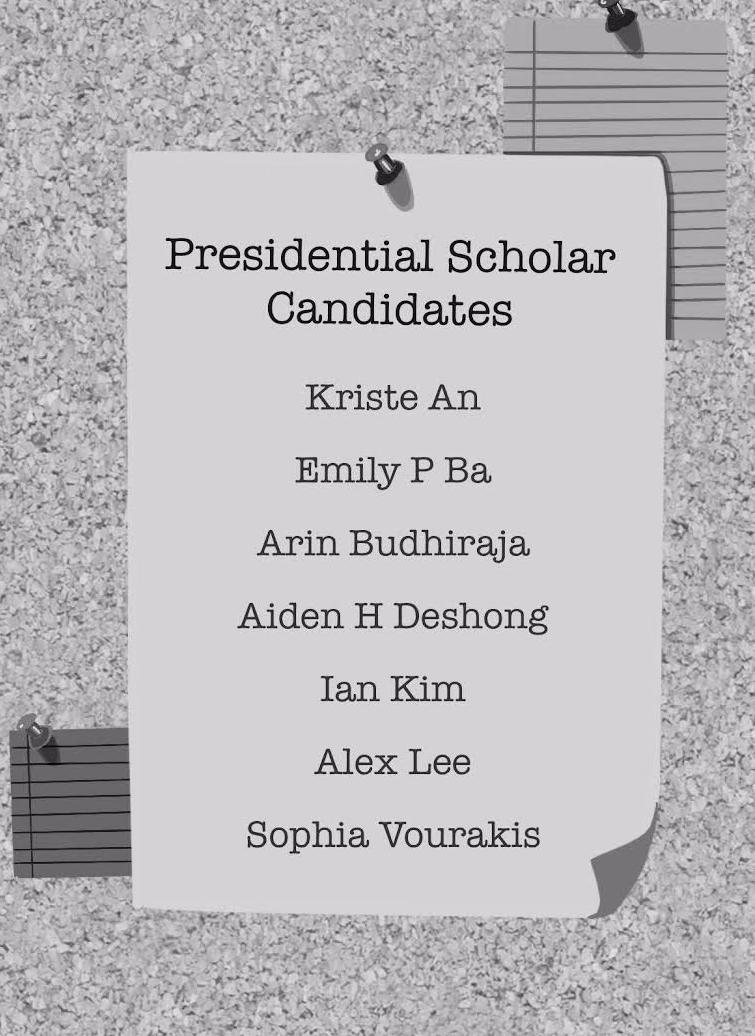 EXCHANGE EXPERIENCE: Lisa Suen, a foreign exchange student from the World Leading Schools Association in Shanghai (WLSA), paints on a collaborative canvas installed in Feldman-Horn Gallery. Suen is one of the six high school students the school hosted from Jan. 22 to Feb. 2.
CONNOR TANG/CHRONICLE
EXCHANGE EXPERIENCE: Lisa Suen, a foreign exchange student from the World Leading Schools Association in Shanghai (WLSA), paints on a collaborative canvas installed in Feldman-Horn Gallery. Suen is one of the six high school students the school hosted from Jan. 22 to Feb. 2.
CONNOR TANG/CHRONICLE
hwchronicle.com/news News A3 Feb. 1, 2024
Julien Liu ’25
ILLUSTRATION BY AVA HAKAKHA
Early Decision Insights
In addition, the school recently implemented maximums for the amount of Advanced Placement (AP) and Honors classes that students can take. The original policy went into effect at the beginning of the current seniors’ sophomore year. It allowed two, three and four APs for sophomores, juniors and seniors, respectively. The new policy, which went into place this fall, the Class of 2024’s senior year, changed the limit for sophomores to three APs and honors courses, while juniors and seniors can take a maximum of five APs and honors courses.
Cuseo said people view each admission cycle differently based on what schools students choose to apply to.
ferent schools,” Cuseo said. “But at the same time, when students have done well and have strong grades, it’s hard to say they don’t deserve to try for something hard. That conversation is about minimizing regret. For some students, the regret is gonna be that they didn’t get in, and for some, it’s gonna be that they didn’t go for it. It’ll be different for different students.”

“Overshooting is something the deans talked about,” Cuseo said. “We felt that individually, they could have made better, more realistic choices, but as a whole, they didn’t apply to a wide range of schools. Every year is usually a pretty good year, and people get into amazing places. But what determines the perception of the year is where and when people choose to apply.”
REA is non-binding, meaning that if a student is accepted early, they may apply to other schools in the regular round. ED, on the other hand, is a binding agreement, meaning that if a student is accepted, they must attend the college or university. Cuseo said part of her job as a dean involves making sure that students do not regret their choice of ED or REA.
“Before they submitted their applications, we did bring up to kids that they should look at dif-
The school uses a platform called College Kickstart to provide students with information about their college choices. It utilizes data from past students at the school and classifies schools into “likelies” where a student has a 75 percent chance of being accepted, “targets” where a student has a 50 percent chance of getting accepted, “reaches,” where a student has a 25 percent chance of being accepted and “unlikelies” where a student has a less than 1 percent chance of being accepted. President Rick Commons said it has become increasingly difficult to categorize schools into one of these four labels.
“Back in the 1990’s, when I was a college counselor, [the process] was much more predictable based on somebody’s record, grades, scores and activities,” Commons said. “Over the last several years, it has become almost impossible to know. We used to say ‘Here are your likelies, here are your 50-50’s, here are your reaches and here is what’s out of reach.’ We
could predict that, and the families and students could predict from [the information] that was there. So if a student didn’t get into a college that we had said is out of reach, we told you it was out of reach, and we were right on. If we said it was likely, we’d almost always end up with a yes. That’s become much harder, so it was a frustrating fall for all of us watching what has happened.”
Students who are not accepted during the early round are either denied or deferred. If they are deferred, they are reconsidered for the school during the regular round. Slattery said there were fewer deferrals this year because colleges are changing their approach to the admissions process.
“Another thing that was surprising to me were the denies,” Slattery said. “Part of that is a shift philosophically, and that doesn’t have anything to do with [the seniors]. I think that has to do with more colleges not deferring people they know they’re not going to take. I feel like people who got deferred might feel a little bit better because it probably was authentic, as opposed to some years where it’s just a courtesy.”
Students have the opportunity to apply Early Decision II (EDII) to a limited number of schools. Applications for these schools are usually due in early January, and students hear back in February and March. Cuseo said there is a common understanding among students that the deans are encouraging students to apply EDII.
“Advising kids about [applying EDII] is always hard because you don’t want to just grab onto whatever feels like a sure thing in the
aftermath of a disappointment,” Cuseo said. “There is a perception that the deans are pushing EDII. The truth is for some of these schools, EDII is the only way, and that was the conversation. It wasn’t that everyone had to EDII somewhere.”
Sophie Bobb ’25 was a sophomore when her older brother, former Sports Editor Jaden Bobb ’23, applied to college. She said seeing this year’s college results made her realize that her brother’s grade had performed extremely well.
“The fact that this year’s seniors didn’t do well makes me feel relieved because I had such high expectations, and I was getting kind of nervous because there’s no way I [could] live up to that,” Sophie Bobb said. “But now I’ve realized [the Class of 2023] was just a special case, and this year is more realistic. It’s helping me gauge what is realistic. I’ve learned a lot from them.”
you what you want to hear. It looks like managing expectations and maximizing opportunity.”
Commons said students are well-prepared to attend any school and should have the option to go to whichever university they want to attend.
“ What determines the perception of the year is where and when people choose to apply.”
Sharon Cuseo Upper School Dean
“I am thrilled for those who got good news and disappointed for those who did not,” Commons said. “I feel a sense of unfairness when students who are incredibly prepared and have worked hard don’t have the options that they deserve. As much as there was a lot of good news in the fall, there was also a lot of bad news. It feels to me that Harvard-Westlake students should be understood by all colleges to be better prepared than your average applicant, [but] I am biased. While it has always felt to me that Harvard-Westlake students should have all the options, the unpredictability of it is frustrating.”
Slattery said she hopes more students will listen to their deans’ advice so as to prevent unrealistic decisions.
“I wish more people would listen to the deans,” Slattery said. “Nobody delights in having it go poorly. That’s not fun for anyone. Deans don’t want to spend their winter break talking about this, and they love [their students]. So when they give advice about a school not being the best use [of an ED application], and people interpret as ‘You don’t support me,’ the truth is that support doesn’t look like telling
Slattery said she expects this year’s matriculation to end up similar to past years, despite lower acceptance rates in the early round.
“Ultimately, people are going to end up fine,” Slattery said. “There’s going to be people who get exactly what they wanted, people who didn’t get exactly what they wanted but got something good, people who got something good but are still disappointed and people [who] are understandably disappointed. That number of understandably disappointed people is very small every year. It’s all going to be okay.”
44
40
43
47
HANNAH SHAHIDI/CHRONICLE hwchronicle.com/news A4 News Feb. 1, 2024
L. Wood Rick Commons
Estimated percentage of students in the last 10 classes who were accepted in the early round of admission, according to the Deans’ Office. 2014 47 percent of students accepted 2015 43 percent of students accepted 2016 55 percent of students accepted 2017
percent of students accepted 2018
percent of students accepted 2019
percent of students accepted 2020
47
54
51
percent of students accepted 2021
percent of students accepted 2022
percent of students accepted 2023
percent of students accepted
An inside look into how the Class of 2024 performed during the early round of college admissions compared to previous years.
A1
• Continued from
MESA and Jewish Club co-host lunch town hall discussion
By Zoe Goor
The Middle Eastern Student Alliance (MESA) and Jewish Club hosted a town hall during lunch Jan. 23. Members were invited to share their feelings and experiences surrounding common issues, such as the Israel-Palestine conflict in the Middle East. This town hall marked the return of a series of similar events that Student Leaders for Inclusion, Diversity and Equity (SLIDE) hosted last year.
MESA co-leader Lila Daoudi ’24 said the goal of the event was to provide students with a space to share their concerns and help the administration address pressing issues.
“The goal is to promote joint discussions and creative solutions to issues that students at [the school] face,” Daoudi said. “We use these discussions to pose possible solutions and ideas to [the administration] to promote change at school.”
Jewish Club co-leader Noa Blackman ’25 said she was initially hestiant on how many people would attend the event.
“I was nervous that not enough people would come to the town hall,” Blackman said.
sphere at the meeting so students could feel secure sharing a diverse array of perspectives.
“I think it’s comparable to Peer Support in that students all rant about how they’re feeling and have their problems recognized,” Daoudi said. “We try to make it super casual and comfortable with all shares being anonymous.”
Raquel Moradi ’26 said attendees talked about spreading awareness on current issues and finding more places for students to have open discussions.
“We were talking about having a bigger community and safe space for everyone to share their opinions and schoolwide assemblies for important events in the world,” Moradi said. “We felt that a big issue was people being uneducated or unaware about certain world events. For example, the [School of Leadership Afghanistan] all-school assembly was great. Everyone learned so much, and it spread information about larger world problems.”
“ It’s a direct line to speak with [the administration] about issues that [we’ve] been facing.”
Noa Blackman ’25
“But we’re now thinking of doing a second one because of how successful and productive it was.”
Blackman said she hopes the town hall helped create a sense of unity between the two affinity groups.
“It’s supposed to be a time for affinity groups to get together and share things they’ve experienced on campus,” Blackman said. “As we’re discussing, the leaders [take] notes. These notes are given to SLIDE chairs [who] take these notes, put them into a presentation and share [them] with [the administration]. It’s a direct line to speak with [the administration] about issues that [we’ve] been facing.”
Daoudi said she worked to foster a comfortable atmo -
Moradi said she hopes the meeting will help the school address the misinformation present in many class discussions. “I shared some stories about getting misinformation in class and teachers spreading that to other students who weren’t aware of the truth,” Moradi said. “I hope that the school [will] spread more information on these global topics, and [that] students will further their knowledge in them.”
Upper School World Language Teacher and Jewish Club faculty advisor Simona Ghirlanda said she appreciated the town hall as it emphasized the shared ground between the Jewish and Middle Eastern communities.
“[The] Middle East, Israel the Jewish community are brothers, sisters, and cousins,” Ghirlanda said. “We have so much more in common than what divides us, whether we are Jewish, Muslim or Christian. We have so many roots in common that I think it should be a regular event.”

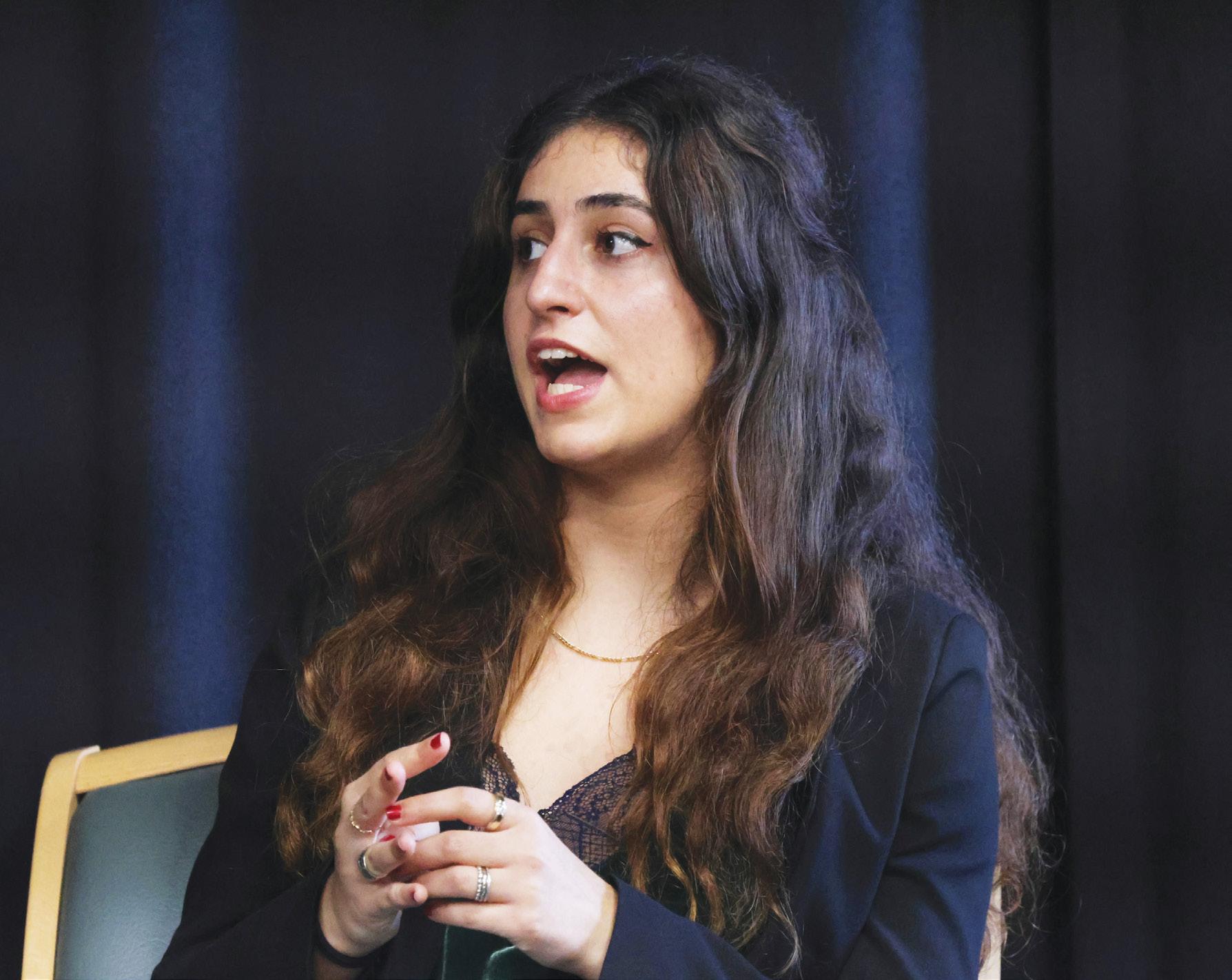
Former News Editor speaks to students about her new novel
By Nathan Wang
Former News Editor Saba
Nia ’19 spoke to students about her first book “Carpe Diem” at a Harvard-Westlake Student Alumni Association (HWSAA) Book Club event Jan 22.
After six years at the school, Nia attended Georgetown University as a pre-medical student studying psychology. In her sophomore year at Georgetown, Nia began writing “Carpe Diem” based on a creative story she had developed in eighth grade. “Carpe Diem,” which translates to “seize the day,” combines themes of Greek mythology, indigenous philosophy and different types of folktales.
Nia’s book takes place in the future on a fictional planet called Gaia, where the human race has become infertile due to a divine curse. The book explores the journey of a boy named Dante who must navigate life knowing he is part of the last human generation.
Nia said creating characters in her book allowed her to reflect on the valuable people in her life.
“Some of the characters rep -
resent a combination of different types of people I’ve met in my life,” Nia said. “For example, [the character] Rose. I called her Rose because some people in my life, who are really strong, are similar to her. It was a great way to look deep into my life experience.”
Nia said the challenging academic environment of the school encouraged her to take a risk in writing “Carpe Diem.”
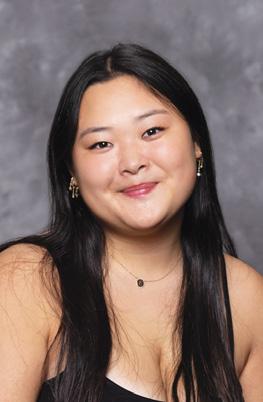
“I learned things at Harvard-Westlake that ended up helping me write and publish the book,” Nia said. “The biggest thing was just learning how to have a good work ethic. Being around a lot of brilliant people motivates you to always take risks.”
Nia said she decided to write the book after having to accept the chaos in her life that was caused by the global pandemic.
“I’m a very organized person, and I had all these ideas of how my college experience [would be],” Nia said. “When the pan -
demic happened, it was such a moment of, ‘I can’t control everything.’ I think that really fits in with the message of ‘Carpe Diem,’ like seize the day. I was like, ‘I’ve been trying to write this book, and I’m not even living the message [of it].’ The pandemic affected me so much, and I felt like I was just going to go for it, seize the day and write this book.”
HWSAA leader Ellie Whang ’24 said Nia was an impactful speaker because her unique achievements as a recent alum made her feel relatable and connected.
“One of the main things is that she is so young, and she’s already accomplished so much,” Whang said. “I think that’s what drew her to us because she’s close in age. A lot of the time we get alumni speakers that are a lot older, and there’s a little bit more of a disconnect because of how different it was when they went to Harvard-Westlake versus what it is now.”
Annual Tap Out game announced
By Kayla Graff
Prefect Council announced the return of Tap Out on Jan. 22.
Tap Out is an annual schoolwide game in which all participants receive a target via text message who they must eliminate by tapping them on the back and saying “out.” To make an elimination count, a video of the encounter must be uploaded to the Tap Out Facebook group. To prevent the game from stalling, players must eliminate their target in three days or they will face elimination.
President Rick Commons announced the commencement of Tap Out in a satirical video posted on Prefect Council’s Instagram page. Commons said Tap Out is an essential tradition that must be taken seriously.
“With great solemnity, I am here to announce the return of our most important Harvard-Westlake tradition, Tap Out,” Commons said in the video. “Tap Out will commence, and you shall pursue excellence with that sacrifice and focus that sets aside all joy. May the odds be ever in your favor.”
Sophomore Prefect Caroline Cosgrove ’26 said Tap Out helps foster a more united community.
“Tap Out is a really fun and important way for our community to bond because it allows people who don’t know each other to enjoy something at school together,” Cosgrove said. “It creates new tight-knit relationships that are often really unexpected.”
Sophomore Prefect Sarah Anschell ’26 said she is eager to see people eliminating their targets.
“I’m excited to see people get their targets on the Quad,” Anschell said. “Hopefully, we’ll get some fun video submissions.”
Noa Blackman ’25 said she enjoyed Tap Out last year and is looking for redemption this year.
“[Tap Out] creates a good energy on campus while it’s going on,” Blackman said. “Last year I was unfortunately one of the first 10 people to get out, so I’m excited to redeem myself this year.”
Olivia LePera ’26 said she will not be playing Tap Out because of the inconvenience of creating a Facebook account.
“I’m not going to participate in Tap Out because I think it’s annoying to make a Facebook account for it,” LePera said. “I just don’t think it’s worth it.”
Tap Out will begin Feb. 5.
hwchronicle.com/news News A5 Feb. 1, 2024
CONNOR TANG/CHRONICLE
SPIRITED STORYTELLING: Former News Editor Saba Nia ’19 shares her experiences as a former student and how they relate to her newly published book “Carpe Diem.” The novel was inspired by a piece she wrote in eighth grade.
ILLUSTRATION BY EVA PARK
L. Wood
Ellie
Whang ’24
Second Semester Clubs
Comic Art Club
By Audrey Kim
The Comic Art club, founded by Loren Park ’25 and advised by Visual Arts teacher Whitney Lasker, will teach students about comics and how to draw them. The club hopes to explore comics from many genres to help students write and draw their own.
Park said she started the club because of her love and passion for comics.
“I started the Comic Art Club because I have always loved reading them,” Park said. “The usage of images to express unique characters and create compelling storylines always keeps me on my feet. There are so many ideas that come through the pages visually. I know many people at Harvard-Westlake feel the same way as I do, and I want to create a welcoming community that cherishes and creates comics.”
comics to the school community.
“I want to have a space where people can be inspired and create amazing stories,” Park says. “I am planning to explore and talk about all comics from all genres so we can be inspired to curate characters, storylines and art styles all unique to ourselves. I also plan to start this club to give opportunities to people of all ages and communities to express and create comics as well.”
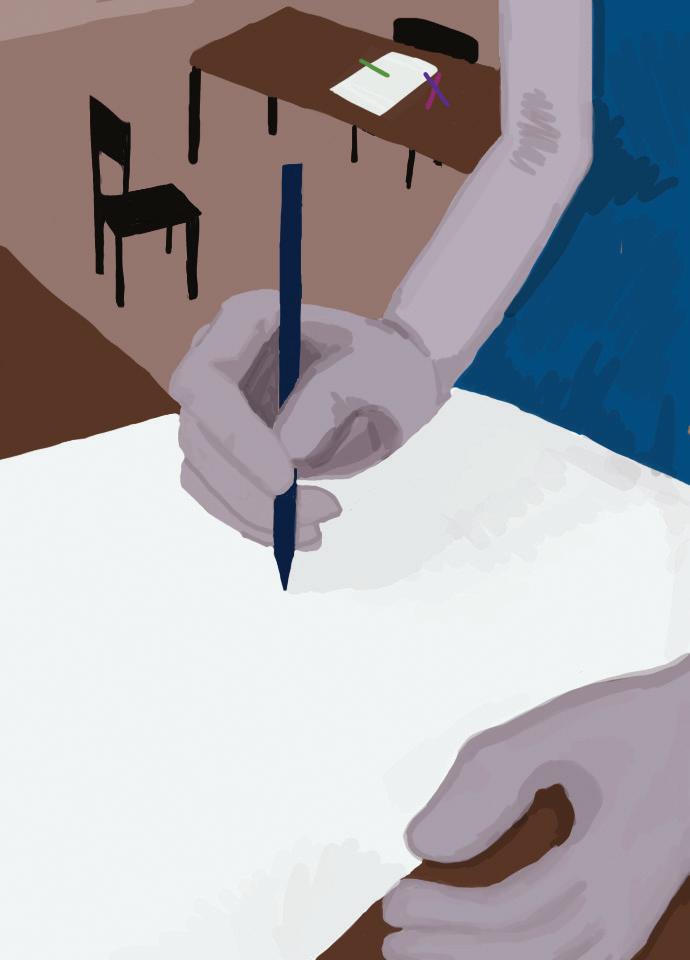
Park said that she hopes that this club will introduce the full world of
Park said she wants to build a space where students, even ones who don’t want to participate in the activities, can socialize.
“I hope this club can bring out creativity in students, and I want [it] to be a place where people are willing to be inspired and collaborate with other students on their art in general, ” Park says. “I also hope to create a chill and fun environment by providing a sense of belonging and ease. All students are welcome, no matter their age and prior knowledge when it comes creating comics and comics in general.”
Computational Competition Club
By Jayan Kandavel
The Computational Competition Club, founded by Michael Barr ’25 and John Xu ’25, plans on forming a team to compete in coding competitions like the United States of America Computing Olympiad and the Lockheed Code Quest. Members of the club will work together to improve their coding skills while prepping for many competitions.
Barr said he created the club to unite coders across the school to collaborate and improve their skills, as well as be able to participate in a competitive activity together.
break with a small group of friends, so I thought it would make sense to share that experience in the form of a club.”
Barr said the decision to create a team stems from the number and variety of coding competitions.

“We realized that there are hordes of very competent coders at Harvard-Westlake that have received a really good education in code but aren’t aware of all the opportunities that the skill provides them, competitively and just in general,” Barr said. “I think competitive coding is fun. I loved prepping over winter
“Since there is such a diverse set of coding competitions that require similar skills, we thought it made sense to form a team to build and share these [skills] together as well as apply together for team competitions and awards as a school,” Barr said. “This not only creates a space where students who are interested in coding in general can collaborate, but a competitive activity as well.
Barr said the club is the product of a longtime passion for coding since a young age.
“It is my life’s work, my pride and my joy,” Barr said. “I am filled with respect and love for the world every time I set foot in Chalmers 307, and the family I have become a part of.”
Taekwondance Club
By Lydia Gugsa
The Taekwondance Club, founded by Liv Lee ’26 and advised by Upper School Dance teacher Queala Clancy, combines two aspects of Korean culture: Taekwondo and K-pop. Lee hopes to gather a wide variety of talents and interests as the club encourages students who may be more experienced in one area to try a new style.
Lee said she started the club because she has a black belt in Taekwondo, has been dancing for four years and wanted to combine her two passions.
“As a Korean immigrant, I feel like Korean culture has always been a huge aspect of my life,” Lee said. “I started learning Taekwondo at age seven and was captivated by it because of the unique and powerful movements as well as the emotions and inner strength that are displayed during a performance. I became interested in K-pop in middle school because I subconsciously felt the obligation to choose between my Korean and American identity. K-pop expanded its influence glob-
ally while preserving the Korean touch to its music.”
Lee said she chose Clancy as her faculty advisor because she can help choreograph the dances.
“I thought she would be such an amazing advisor in the process of the choreography,” Lee said. “Her energy is unmatched. She’s perfect for the environment and space that I’m trying to create through this club.”

Clancy said she was thrilled to support the club as it would help students learn the choreography of th many dances.
“I was excited when asked to become the advisor for the club,” Clancy said. “The opportunity allows me to support the students along their journey. As a dancer and educator, I understand the value in movement, identity, cultural joy and acceptance. Therefore, to see dance used as an educational and creative method of engagement on campus speaks to me. I hope to bring perspective and confidence into the work of the club.”
The club will meet every Day 4 during lunch in the dance studio.
3D-ify Club
By Jack Ryan
3D-ify, founded by Kyler Yun ’25 and advised by Upper SchoolMathematics Teacher Juan Lopez, is a space where students can discuss how 3D computer generated imagery (CGI) is created and applied so they can gain both a greater appreciation for the industry and make their own original CGI art. Yun said he created the club to help inform others about how much time and effort goes into online graphics, as well as teach participants about some of the skills involved in making them.
the content we consume in our everyday lives.”
Yun said ever since he first learned about CGI art, he has hoped to spread his passion to others.
“When I started middle school, one of my teachers introduced me to 3D modeling software, and I became obsessed with it,” Yun said. “I’ve continued to make 3D art ever since, and I’ve wanted to teach it to others for quite a while now.”
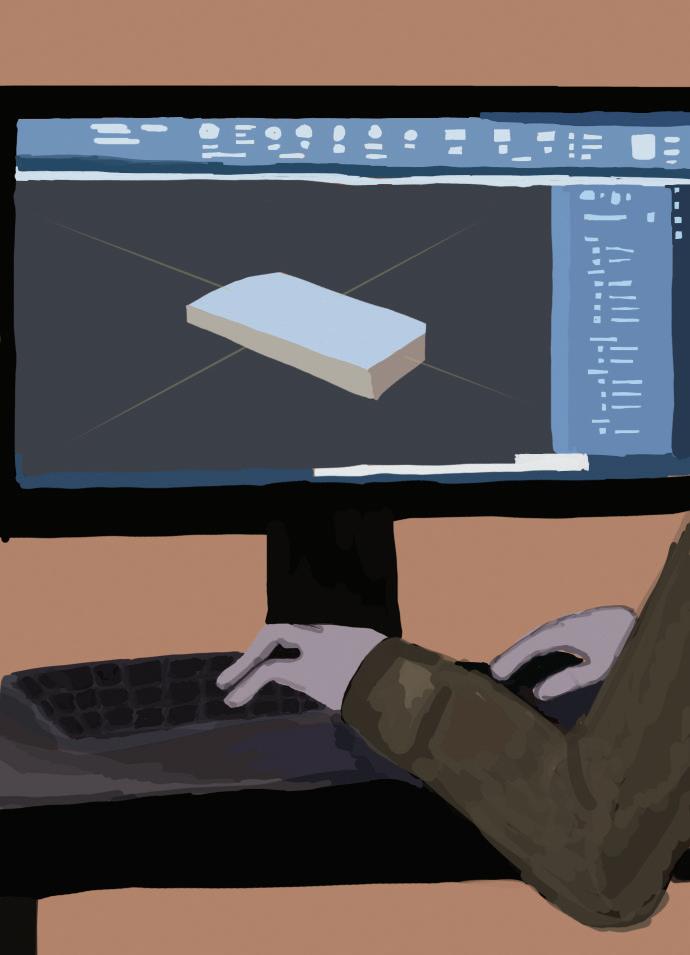
“While there is an end goal for the project, a retro piece of tech in 3D that I won’t spoil, I hope people can use what they’ve learned from this club on their passions, whether that be art, filmmaking, game development or design,” Yun said. “I also hope they can gain a new level of appreciation for the artists whose work and talent goes unnoticed in so much of
Yun said 3D-ify will meet consistently and build on past meetings in order to best prepare members for the final project at the end of the year.
“While club meetings will be pretty consistent and hinge on material learned in previous meetings, I’ll be emailing copies of the presentations and Blender files as attachments. The club’s structure is similar to that of a class or elective,” Yun said. “Even if someone misses a meeting, they can come on by and pick up where they left off. I hope participants enjoy the club. Hopefully in the future we can expand the club into something larger in scale.”
Feb. 1, 2024 The Chronicle
A6 News
ILLUSTRATIONS BY JUANA MARKMAN
Screening held for new film
The Jewish Family Alliance (JFA) and Kutler Center hosted a screening of the 2023 documentary "UnBroken" during a recent installment of the Cinema Sundays program Jan. 21. The screening was followed by a group discussion in honor of International Holocaust Remembrance Day.
The film that was shown, "UnBroken," is directed by activist, artist and second-generation Holocaust survivor Beth Lane. The film tells the story of the daughter of a Holocaust survivor who goes on a journey to find answers about the history of her mother, who was incarcerated and murdered at Auschwitz, and her six siblings who escaped Nazi Germany as young children.
Lane said “UnBroken” is an essential story of hope and it aims to inspire viewers and audiences to combat antisemitism and show more kindness in their lives.
“My goal is that 'UnBroken' will offer its viewers an opportunity to strengthen the muscles of hope, compassion, empathy and love [while] collaborating with individuals of a variety of belief systems,” Lane said. “[This] may just add a stitch to the fabric of a more just society where everyone has kindness and courage in equal measure.”
Director of Kutler Center Jim Patterson said this Cinema Sunday screening was noteworthy because the film is centered around the Holocaust and honoring those who suffered.
“I am excited that we were able to show this film about an important story,” Patterson said.
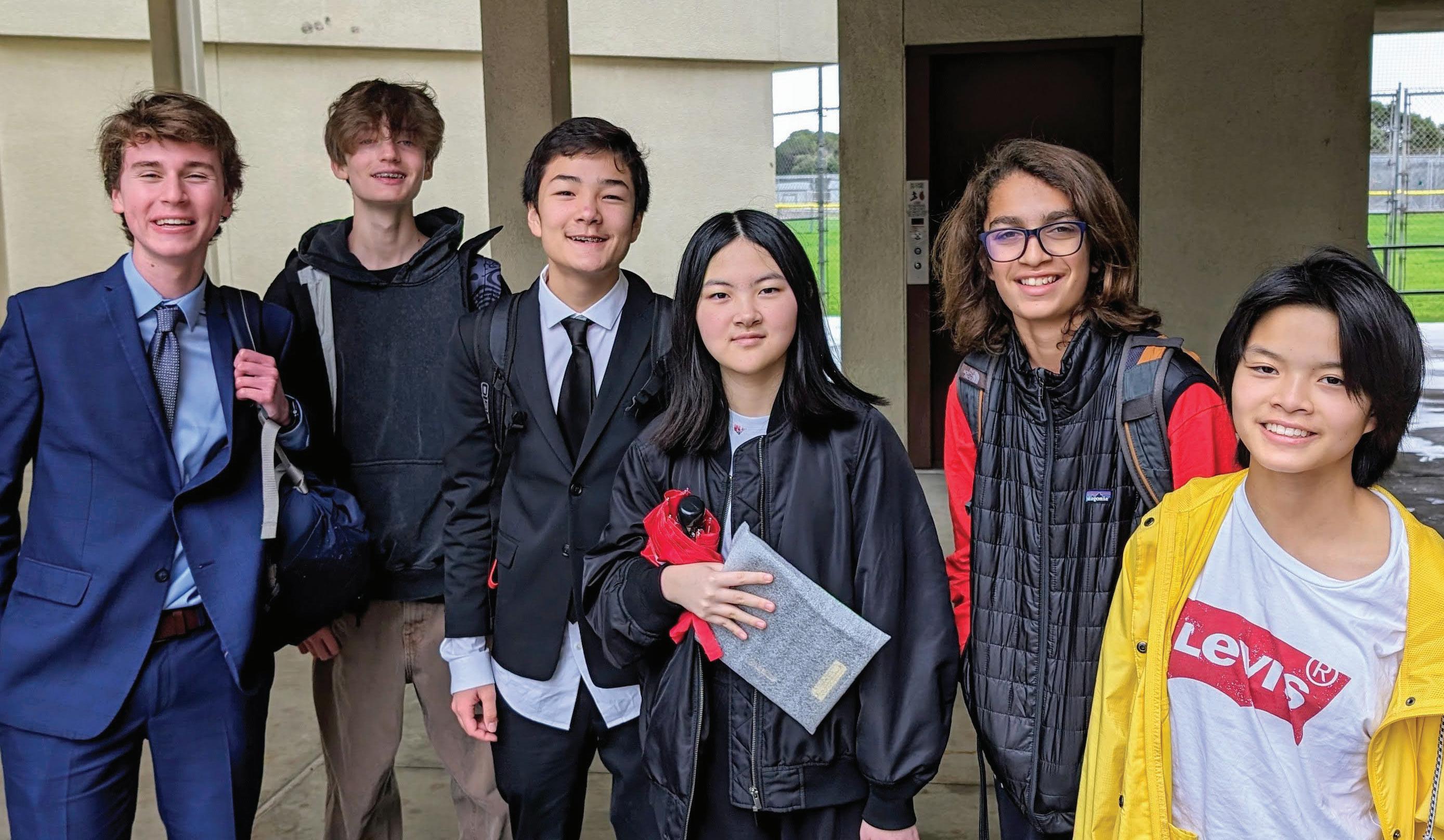
Debate team competes in local competition
By Alex Lee
The debate team competed in the Peninsula Invitational in Rolling Hills Estate, California, from Jan. 20 to Jan. 22. The school competed in the Varsity and Novice Lincoln-Douglas divisions.
Asher Meron ’25 and William Liu ’25 received Tournament of Champions (TOC) bids at the tournament through the Open Lincoln-Douglas division. Olivia Zhu ’27, Elijah Yguado ’28, Michael Reola ’28, Lucy Shi ’28, Jacob Waxman ’27 and Beau Cartwright ’27 placed in the top 10 speakers in the Novice Lincoln-Douglas division.
Director of the Debate Program Mike Bietz said the team competing showed up in large numbers and performed well in both categories while competing at the local tournament.
“I think it's the most debaters
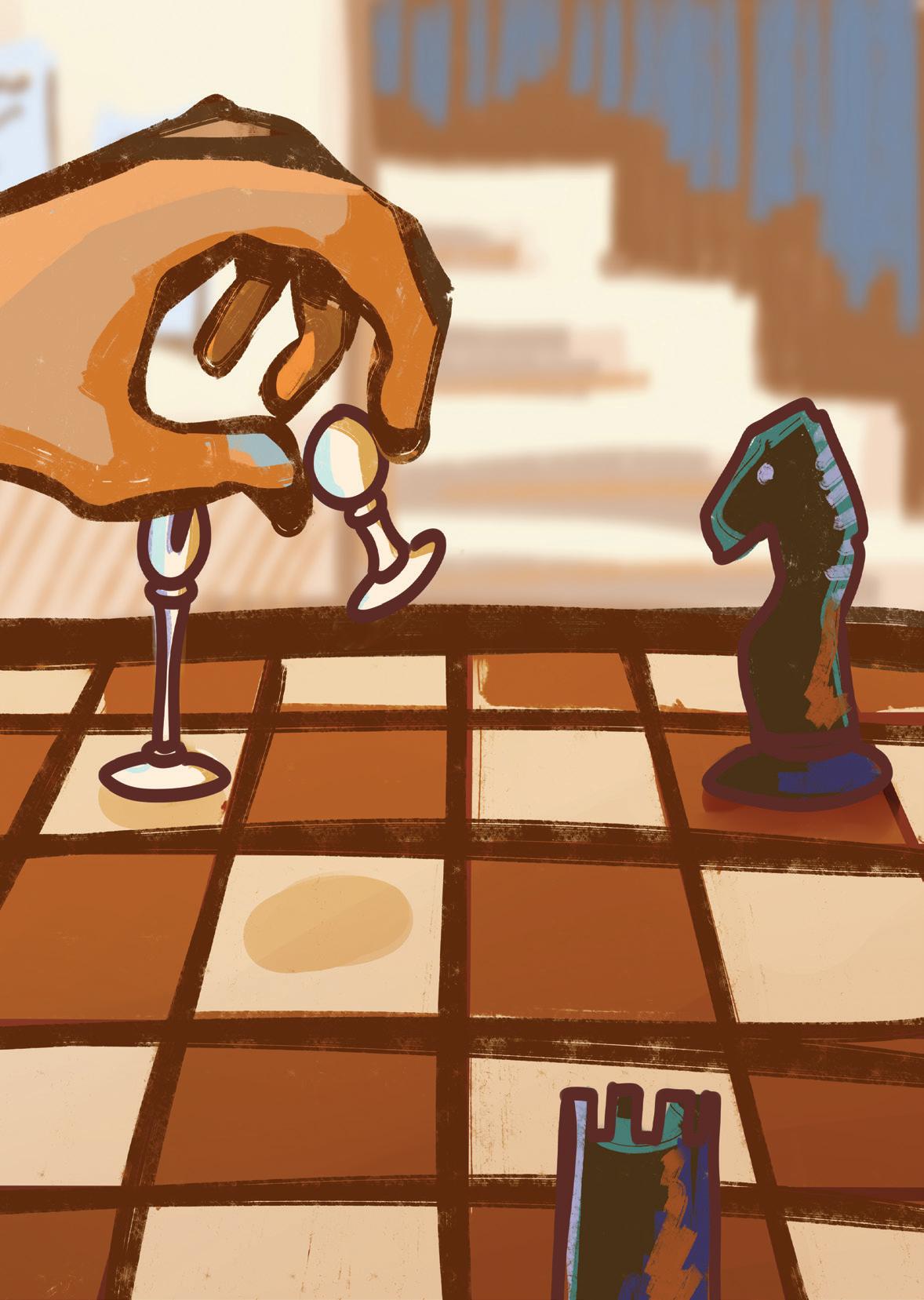
that we took to a tournament this year,” Bietz said. “We took 17 debaters to the tournament, and they got to stay overnight. They did very, very well. I think we had six of the top 10 speakers. And in varsity debate, we had two debaters earn bids to the Tournament of Champions, so it was a very successful weekend.”
Bietz said he was impressed by the team’s performance but felt proudest about how well team members helped each other.
is always gonna make me more proud than winning. Judges decide who wins, but in terms of how the kids acted and supported each other, those are deliberate choices, so I'm proud of them for that.”
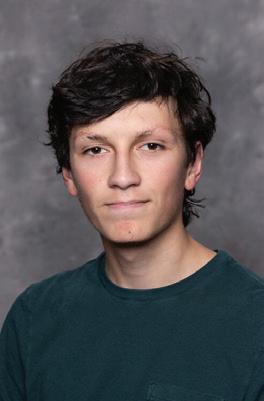
“Debate is an activity where you go in and debate by yourself,” Bietz said. “But the preparation and all those things that we do as a team, I get to see. To see the older debaters helping the younger debaters and being supportive
L. Wood Asher Meron ’25
Debater Kaison Maruyama ’27 said the support the team gave him along with his own work made him feel prepared for the tournament.
“I put in a lot of work before the tournament, and I think it really payed off,” Maruyama said. “Even though I wasn’t 100 percent prepared for everything, I felt that my team was really able to help me.”
Meron said he felt he made a lot of progress since his last tournament and is now focused
on getting a second bid to advance to the TOC.
“I feel like this tournament was a big improvement in my performance which was obviously reflected in getting my first bid,” Meron said. “Now I’m aiming to get a second one so I can fully qualify for the TOC. I'll definitely be working hard on getting that by the end of the season. Hopefully that push will start in Atlanta this weekend.”
Esther Goldman ’26, who attended the trip, said she enjoyed the trip because she was able to connnect with her team.
“I love traveling with my team because we can really feel the sense of community,” Goldman said. “Going to team dinners and hanging out at the hotel gives a bond that carries over into debate since we all want each other to do well.”
Prefects host chess tournament
By Lyla Kavanaugh
Prefect Council partnered with the Chess Club to organize a chess tournament during lunch periods Jan. 29Feb. 2. Students will compete for a chance to win a new chess board, supplied by Prefect Council.
Sophomore Prefect Robby Louie ’26 said Prefect Council hopes the chess touranment will provide students with a chance to relieve academic stress and pressure while participating in a schoolwide event to boost community and connections between students.
“We hope to create a break from academic stress so [that] people can go watch and enjoy the games to de-stress during the day,” Louie said. “Another outcome we’re hoping for is to help students make new friends, immerse themselves in the community and foster opportunities for friendship.”
Chess Club Leader Eric Vartany ’24 said this is the second year the Chess Club has hosted a schoolwide tournament that anyone can partici -
pate in with Prefect Council.
“Last year, we partnered with Prefect Council, and it was a huge success,” Vartany said. “Working with them, we’re able to spread the word to more people along with get the necessary funding for chessboards and other equipment.”
Vartany founded the Chess Club along with Chase Hameetman ’24 during their sophomore year and they have continued running and expanding the club since then. Vartany said although chess used to be very popular at the school before he was at the Upper School, it hd lost traction by the time that he started as a sophomore.
“Chess at Harvard-Westlake has been very on and off,” Vartany said. “Years ago, chess used to be huge and Chess Club would sell lots of merch around campus. But I guess it died out after that. [Hameetman] and I refounded the club in the 2021-22 school year and this is our second year of hosting an all-school tournament.”
Online chess has seen a rise in user activity over the past few years, according to Annen-
berg Media. The most popular of these online sites being Chess.com, with users from every country in the world and ten million chess games being played every day on their platform, according to Chess. com. Vartany said the release of mainstream shows combined with the growing popularity of online chess websites have heightened students' interest in chess.
“Online chess has certainly influenced the popularity around campus,” Vartany said. “The online format makes the game a bit [more] addicting. I think online chess has helped grow the popularity of the game among people.”
“The Queen's Gambit,” a television show on Netflix starring Anya Taylor Joy, released in 2020 and was centered around the game. Vartany said people became interested in the game and the apps after watching the show.
“Chess spiked after ‘The Queen’s Gambit’ was released on Netflix,” Vartany said. “Websites like Chess.com and Lichess.org [also] facilitated people’s interest in chess.”
READY FOR THE REBUTTAL: Members of the novice Lincoln-Douglas debate team pose together at an in-state tourament after completing a match. The tournament took place over three days, with two Junior members of the Varsity team receiving bids at the end of the competition. WITH PERMISSION OF MIKE BIETZ
PRINTED
By Ella Jeon
ILLUSTRATION BY EVA PARK hwchronicle.com/news News A7 Feb. 1, 2024
• Continued on hwchronicle.com
Chaotic Crossword
Aidan Deshong ’24 has schemed up Volume 33’s fifth crossword. Will you be able to figure out this gargantuan 71 question brain-teaser? Good luck and go puzzle!

ACROSS:
1. Relative of LMAO
4. _____ the weather (sick)
9. In progress, to Sherlock Holmes
14. King Kong or Donkey Kong
15. Somewhat, informally
16. Soup scoop
17. He pities the fool!
18. Food that actually originated in Belgium
20. Herb in pesto
22. ____ Forest University
23. In case
24. Response to a zinger
26. T-shirt size bigger than med.
28. Food that actually originated in New York
35. Exploits
37. The Hawkeye State
38. Do penance
39. Not backwards?
40. Like some modernday maps
42. NHL tiebreakers
43. Marinated Filipino meat dish
45. Debtors’ notes
46. Thicken, as cream
47. Food that actually originated in Canada
50. Political org. with a donkey symbol
51. Crowns fit for a princess
54. Fruit with an accent
57. Klutzes
61. TV teaser
Chron-nections
62. Food that actually originated in Philadelphia
65. Oxford or Cambridge, informally
66. One of three in a weekday “Garfield” strip
67. Calculator, watch and keyboard brand
68. Zilch
69. Place
70. Showing little emotion
71. Card game from the makers of “Uno”
• Answers on hwchronicle.com
DOWN :
1. Certain Italian sports car, slangily
2. She said “You get a car! You get a car!”
3 “Hmm...”
4. Old Glory
5. Neither’s partner
6. Took a turn in Pictionary
7. Smoke spewer in Sicily
8. Triangle on a pool table
9. TV ET
10. One end of the political spectrum
11. “Garfield” dog
12. Fútbol cheers
13. The “T” of SAT and ACT
19. Ship’s steering wheel
21. B&Bs
25. Ballet movement
27. Burrito add-on, informally
29. Aegean region
30. Faint with passion
31. Overdo, as a stage role
32. Goof off
33. Really digging
34. Hatchling’s home
35. State with the highest concentration of Mormons
36. Sweet, aerated beverage
40. Enter
41. “That so?”
44. “I’d think twice about that”
46. The word for C in “P is for Pterodactyl: The Worst Alphabet Book Ever”
48. Clickable image
49. Resealable bag brand
52. OB/GYN exam
53. Makes dirty
54. High points in Switzerland
55. Layer of paint
56. One of the Brontë sisters
58. Kindergartner’s recitation
59. Lambda Chi Alpha, for one
60. Not great, but not terrible
63. Aged
64. It’s right on a grandfather clock?
Jack Ryan ’25 and Alden Detmer ’25 have designed the third Chron-nections. Find four groups of four words that share a common category. Each word belongs to only one category.

Feb. 1, 2024 A8 News The Chronicle
• Answers on hwchronicle.com
Editors-in-Chief:
Averie Perrin, Ella Yadegar
Print Managing Editors: Jade Harris, Iona Lee, Davis Marks
Presentation Managing Editors: Kriste An, Chloe Park, Tate Sheehy
Executive Editors: Jackson Mayer, Grant Park
News Editor: Sammy Glassman
Assistant News Editors: Jayan Kandavel, Everett Lakey, Alex Lee, Hannah Shahidi, Jack Ryan Connor Tang, Nathan Wang
Opinion Editor: Jackson Tanner
Assistant Opinion Editors: Eden Conner, Sabrina Hamideh, William Liu, Hana Mehdi Williams, Olivia Phillips, Max Turetzky
Features Editor: Dylan Graff
Assistant Features Editors:
Alden Detmer, Alex Dinh, Zoe Goor, Georgia Grad, Saisha Kumar, MeJo Liao
A&E Editor: Caroline Plunkett
Assistant A&E Editors: Sasha Aghnatios, Crista Kim, Katelyn Kim, Mia Morgan, Olivia So
Sports Managing Editor: Jake Lancer
Sports Editors:
Karsten Cole, Christopher Mo
Assistant Sports Editors:
Hailey Cho, Justin Tang
Satire Editors:
Jade Harris, Davis Marks
Assistant Satire Editors: Zoe Goor, Hannah Shahidi
Digital Editor: Casey Reims
Business Managers: Tate Sheehy, Grant Park
Art Director: Eva Park
Illustrators:
Amelia Chiarelli, Annabelle Cheung, Iris Chung, Ashley Ham, Ava Hakakha, Alexandria Liu, Juana Markman, Lucia Plata, Maiya Holly, Sabrina Simek, Siena Orwitz
Executive Broadcast Producer: Jake Lancer
Assistant Broadcast Producers: Rohan Amin, Alexa Benitez, Hunter Bridgett, Eric Chang, Hudson Chen, Grace Coleman, William Coleman, Jack Limor, Aaron Milburn
Layout Assistants and Staff
Writers:
Camryn Banafsheha, Annabelle Cheung, Iris Chung, Emma Cohen, Sienna Dall’Olmo, Wynne Davis, Donna Enayati, Kayla Graff, Lydia Gugsa, Tali Gurule, Colin Ho, Ella Jeon, Yuna Jeon, Lyla Kavanagh, Audrey Wage, Connor Merrihew, Max Nam, Analeigh Nava, Shiara Navarro, Alex Reisner, Andrea Ricabal, Olivia Roosa, Erin Ryu, Eila Shokravi, Aven Son, Celine Wang, Sophia Wiczyk
Advisors:
Jen Bladen, Billy Montgomery, Max Tash
Layout Assistants: James Lane
Publication Information:
Founded in 1990, The Chronicle is the Harvard-Westlake Upper School’s student-led newspaper. Now in its 33rd year, The Chronicle strives to report stories accurately and to uphold its legacy of journalistic integrity. The newspaper is published eight times per year and distributed to students, parents, faculty and staff. The paper is affiliated with two school magazines, Big Red and Panorama. We are members of the California Newspaper Publishers Association and the Private School Journalism Association.
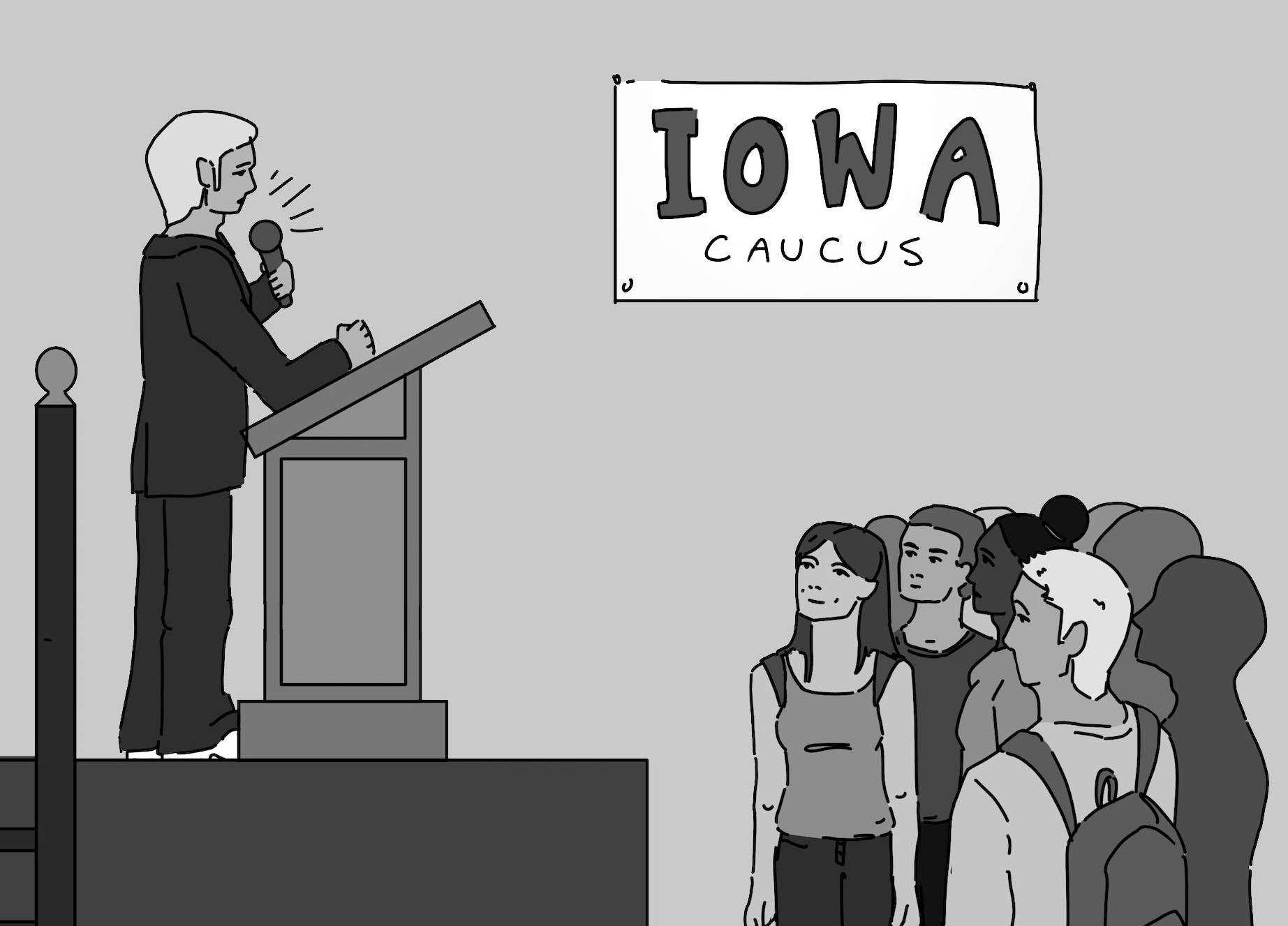
Promote Student Voices in Politics
From Jan. 13 to Jan. 15, students from the school traveled to the 2024 Republican Iowa Caucuses, immersing themselves in the heart of the democratic process and engaging with presidential candidates. The students attended rallies, interviewed Iowans and observed the caucuses process.
In the bustling halls of our school, where academic pursuits often take center stage, the realm of politics can seem like a distant concern. However, students’ presence at the Iowa Caucuses demonstrates that engaging with the political landscape is both possible and crucial for the development of informed, empowered citizens. Interacting with citizens in Iowa offers a grassroots perspective, connecting students with the concerns and opinions of voters who are different from those in the Los Angeles area. These experiences encourage students to develop an enhanced awareness of the political landscape and gain valuable insights into the diverse perspectives that shape political discourse.
High school is a pivotal time in students’ lives as they begin to foster a sense of civil obligation. In encouraging students to engage with politics throughout high school, we equip them with the skills, knowledge and confidence needed to make well-informed decisions in the voting booth. It is easy for us to develop one-sided opinions on an issue after listening to our parents or teachers. Engaging with people who share differing perspectives, such as far-right evangelical Christians in Iowa, can broaden our horizons.
Students’ experiences at the Iowa Caucuses underscore the power that students can hold as active participants in the democratic process — not only did they interview Iowans, but they also spoke with both candidates and esteemed national journalists. Politics isn’t a realm exclusive to seasoned adults. Rather, student voices are both valid and essential to the political landscape, catalyzing change and paving the road for a new generation of inquisitive, involved citizens.
about us
DIVERSITY, EQUITY AND INCLUSION:
The Chronicle strives to be a diverse and inclusive community that welcomes all who wish to contribute. Our Diversity, Equity, and Inclusion committewwe works to ensure that every member of the Harvard-Westlake community is recognized, included and given a voice.
The Chronicle's publications will aim to represent this diverse community and provide a variety of perspectives on the topics that they cover.
EDITORIALS:
Unsigned editorials represent the majority opinion of staffers and are written by the Editorial Board, which is composed of the Editors-in-Chief, Managing Editors and Section Editors.
ADVERTISING:
Looking to place an advertisement in our paper? Questions pertaining to advertisements may be directed to The Chronicle's Business Manager Tate Sheehy at tsheehy1@hwemail.com. Publication of an advertisement does not imply endorsement of the product or service by the newspaper or school.
Our peers’ direct involvement in the caucuses sends a powerful message; political engagement is not confined to the privileged few but is an obligation that all citizens, regardless of age, should embrace.
Reflecting on the significance of political involvement in high school, it is important to acknowledge the barriers that can impede students from taking on an active role. Academic pressures, extracurricular commitments and a general lack of awareness regarding the avenues available for political engagement can all deter students. Therefore, it becomes incumbent upon the school administration, educators and fellow students to create an environment that encourages and facilitates political engagement.
To address these challenges, the school should implement initiatives such as creating dedicated spaces for political discussions, organizing informational sessions on local and national political processes and collaborating with external organizations to provide resources for students interested in politics. The school should facilitate more opportunities similar to the Iowa Caucuses trip for students who are interested in observing the democratic process firsthand. In breaking down these barriers and fostering a culture of political awareness and engagement, the school can have a pivotal role in shaping a generation of conscious and active citizens.
High school students’ engagement in politics is not just admirable — it is essential for the health of our democratic process. The unique position of high school as a formative period in students’ lives makes it an opportune time to instill the values of critical thinking and active participation. Our school should be a nurturing ground for future leaders, changemakers and conscientious citizens who recognize the power that blossoming minds can hold in shaping the course of our nation. It is time to embrace the potential within our students and cultivate a generation that both values the democratic process and contributes to its flourishing.
LETTERS TO THE EDITOR:
Coldwater Canyon Ave., Studio City, CA 91604. Letters must be signed and may be edited to conform to Chronicle style, space and format. We are committed to uplifting the voices of marginalized or underrepresented individuals and groups in accordance with our efforts to promote diversity, equity and inclusion.
PUBLICATION AWARDS:
- NSPA Pacemaker Winner
- CSPA Gold Crown Winner
UPDATES AND CORRECTIONS:
Though we always strive to be as accurate as possible, staff members identify inaccuracies and receive feedback from readers.
The Chronicle publishes corrections when we discover a factual error within a piece. We will continue to uphold transparency even in the face of mistakes following the publication of each issue.
MEMBERSHIPS:
- Columbia Scholastic Press Association
- National Scholastic Press Association
- Quill and Scroll Honor Society
Opinion The Chronicle • Feb. 1, 2024 Studio City • Vol. 33 • Issue 5 • Feb. 1, 2024 • hwchronicle.com
editorial
BY LUCIA PLATA
ILLUSTRATION
may be submitted to chronicle@ hw.com or mailed to 3700
Letters

The AI music issue
By Eden Conner
In the 1988 case Midler v. Ford Motor Co., actress Bette Midler sued Ford for impersonating her voice in a commercial and won the appeal. The Ninth Circuit Court of Appeals claimed that because a voice is distinctive to an individual, imitating that voice for profit was an encroachment on their identity and could not be used without their consent. In 2023, TikTok user Ghostwriter997 posted “Heart on My Sleeve,” a new song that featured the voices of Drake and The Weeknd, except the song was created by artificial intelligence (AI). Although the song was quickly taken down due to copyright infringement for an identical producer tag, national decisions about what should be deemed copyright infringement in AI music are concerningly vague.
As AI becomes more accurate and accessible, it begins to encroach on one of our world’s most innately creative art forms: music composition. There are benefits to using AI in order to speed up the production process, but the tool is also being used to create “new songs” with existing music. Copyright law bans the ability to copyright music made solely by AI but does not restrict the use of music as a plug-in to AI or the use of voices and AIgenerated tunes similar to an existing sound.
Under copyright law, the owner of the copyrighted material is the only individual allowed to produce derivatives of an original work. If an outside party wants to remix the song, — or incorporate aspects of the song into a new work — they must gain master use and sync licenses before doing so. AIgenerated music is able to evade this requirement because while it uses music that is copyrighted, the resulting song does not technically include any direct copies of the original piece and therefore cannot be at risk for a lawsuit. An AI- generated song would not exist without the
input of the copyrighted song.
The basis of a song created by AI is an input of copyrighted work, making it a derivative of copyrighted work, and as a result should face the same copyright charges as a stolen verse. This is not simply someone listening to a song, liking it and subconsciously modeling their own work around it. AI is a technological tool with no creative center of its own that uses an algorithm to copy a song all without infringing on existing copyright law. The glaring derivative use of an original song by AI needs to be addressed in our legislation.
In addition to AI’s ability to plug in songs in order to create music with a similar sound and meaning, it is also capable of using deep fakes, which take recordings of an artist's voice and use it to create new songs. If Midler was able to win a lawsuit over an individual impersonating her voice to make a profit, why should AI be allowed to take a recording of an artist's voice and make a profitable song? One would think that using someone’s voice would be a greater breach of property than their music. By law, however, an artist’s voice should be considered a breach of copyright the same way impersonating someone is. Though the words the automated voice is speaking are different, the sound of the voice itself should still belong to the original artist.
The growing use of AI in human life is inevitable, and it can have a positive impact on the music-making industry, but this is only if it is used in a way that doesn’t infringe on people’s personal sound and artistic creations. There is nothing wrong with using a computer generator to reduce the cost or production time of music. Taking someone else’s work, however, and plugging it into a computer to tweak it and call it original is not what music making is about and needs to be restricted by the Copyright Act.
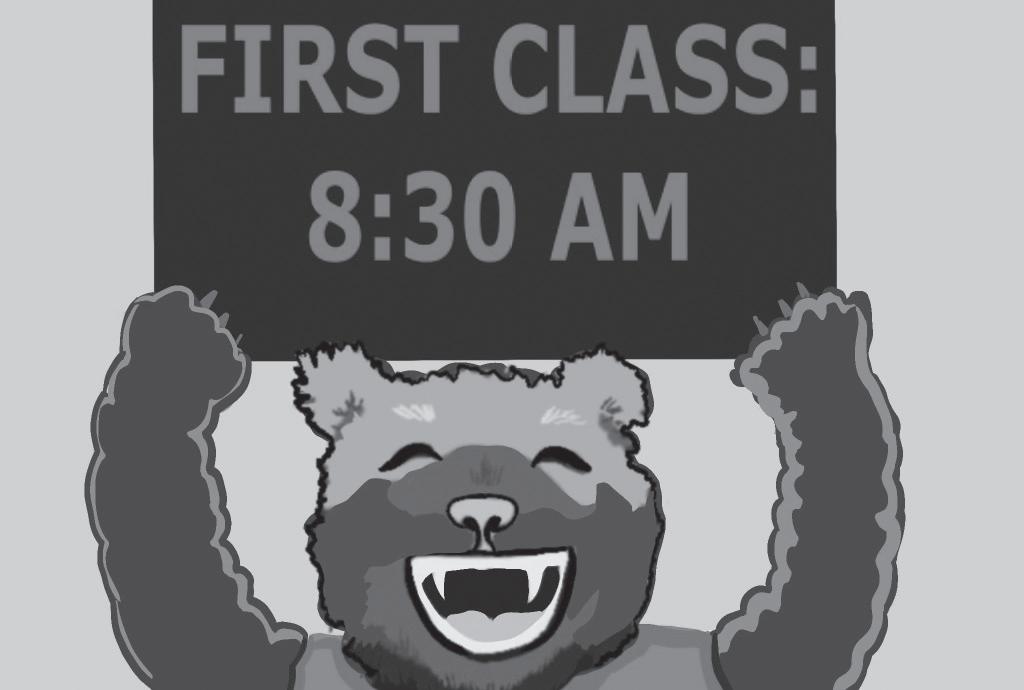 CHUNG
CHUNG
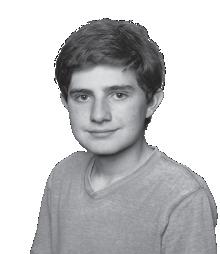
IStart school day later
By Max Turetzky
t is 8:00 a.m., and students are trudging to class and chugging their caffeinated drinks in the hopes it will keep them alert for the next 75 minutes. This scene is all too familiar, but it does not have to be the norm.
The decision to start school at 8:00 a.m. turns students into malfunctioning, sleep-deprived
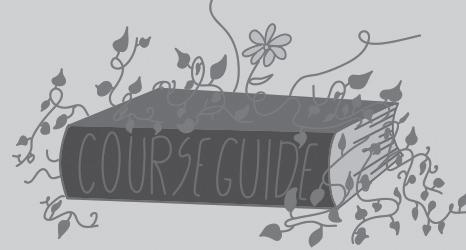
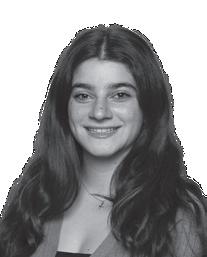
Hzombies. Meanwhile, a growing number of medical studies — as well as an increasing number of schools and state legislatures nationwide — agree that it does not have to be like this. Other private schools in the area, including Campbell Hall, Crossroads, Oakwood and Marlborough, have all shifted their start times past 8:00
BY AMELIA CHIARELLI
Require a dedicated environment class
By Sasha Aghnatios
umans are the only organisms on Earth that create unusable waste, and the effect this has on the environment is disastrous. Light pollution, air pollution, water pollution, land pollution — how much pollution can we create, and how much pollution can the Earth handle?
The answer is “no more.” Yet, while many people realize this, they don’t realize that what they consider to be a sustainable lifestyle is not, in fact, sustainable. They don't understand that their daily actions can be detrimental to the environment. For example, eating meat more than once a day and having more than 15 electronic devices per household are actions that are really harmful to the planet, but the majority of people don’t know this. If they did, then they would think more about the fate of the Earth before making a choice.
This is not to say that people are actively trying to hurt the environment. Rather, any harmful actions often come from a place of ignorance. This is why an environmental science course should be mandated at the school. By informing students about how to better the environment, we can catalyze major shifts in their lifestyles in addition to a cultural shift on campus. If everyone knows how they are damaging
a.m. Bill No. 328, a new California law that took effect in 2022, requires that all public high schools start past 8:30 a.m. The Upper School stands as the odd one out — it is time to align with these changes and shift our own start time to 8:30 a.m.
Bill No. 328 was the first of its kind in the nation to implement a later start time for high school students, but other states are expected to follow. In 2023, Florida passed a law to be implemented in 2026 that sets the same floor. Legislators in at least nine other states, including New York, Texas and Nevada, are proposing similar changes. Our current 8:00 a.m. start time is neither universal nor set in stone, and we should change itif it promotes better outcomes for students.
Prevailing scientific evidence proves that starting school at 8:00 a.m. poses a legitimate threat to students’ health and well-being. For instance, 72.7% of high school students get less than eight hours of sleep each night, which is the medically
the environment, students can work on making daily life choices that are more sustainable.
In my AP (Advanced Placement) Environmental Studies class, students engaged in an exercise where they calculated the number of Earths needed to sustain each student's lifestyle if the human population consumed the same amount of resources. The results were striking — even the person with the lowest ecological footprint in the class required 1.7 Earths to sustain their lifestyle. The highest needed a staggering
They don't realize what they consider to be a sustanable life is not, in fact, sustainable
8.9 Earths. It was after this class that students became aware of the extent to which they were harming the Earth. It was knowing the impact of your actions but also the way in which everyone’s actions were put on display for the entire class to judge.
Instituting a mandate requiring all students at the school to take an environmental science course would help educate students on our patterns of overconsumption as well as foster
recommended amount of sleep for adolescents, according to the Centers for Disease Control and Prevention (CDC). This deficit is especially pronounced at the Upper School, where students are put under more academic pressure and receive more homework than their counterparts nationwide. Many of my classmates often go to bed absurdly late — even after 1:30 a.m. For students who live far from school, some as far as Lancaster or Riverside , their situation is more severe. Several students wake up at 5:30 a.m. or earlier. This is brutal for adults, let alone teenagers, who require even more sleep.
These effects are real and serious. The CDC described the epidemic of sleep deprivation among high school students as a “substantial public health concern,” noting that a lack of sleep can lead to lower grades, mental health struggles and antisocial behavior. High school students themselves know that it just doesn’ t feel right to be waking up at the crack of dawn for school.
a deeper understanding of the pressing climate crisis. Many people in the class began buying drinks in aluminum cans and eating the vegetarian options in the cafeteria after this class. In an era plagued with environmental challenges, equipping students with the knowledge and tools to address these issues is essential for creating informed and responsible global citizens.
This instruction could easily be mandated for next year’s sophomores during Sophomore Seminar. The curriculum for this meeting is constantly changing, and even making a few meetings about sustainability could make a big difference. These classes wouldn’t have to cover a full environmental science curriculum, but they theycan instead focus on how people affect the environment, enabling students to implement this knowledge in their lives.
It's tempting to blame others for the harm that we cause it’s the cafeteria’s fault, the factories’ fault or the planes’ fault. But it’s not. The real culprit is the culture of wastefulness and nonchalance that our world has cultivated. In order to instigate real change, we must begin with changing students' mindsets. Being a high school filled with budding and developing minds, there is no better place to start this change.
It’s a biological truth that adolescents have delayed circadian rhythms that cause them to all asleep and wake up later. Most teenagers can’t fall asleep before 11:30 p.m. and remain in “sleep mode” until 8:00 a.m., according to the American Academy of Pediatrics (AAP). That’s not something that can be fixed through encouraging students to “go to bed earlier.” The school should accommodate its students’ inherent biological clocks instead of working against them.
This shift would not inflict a drastic change in our school's schedule either. Though school would have to end later to keep the block schedule intact, it is more important that we follow what the science says is best, and most medical organizations have agreed on 8:30 a.m. at the earliest. The bus schedule would also have to change, as would the start and end times for after-school sports. But these changes are a matter of will — if other schools can do it, so can we as an entire American population to fix it.
Feb. 1, 2024 A10 Opinion The Chronicle
ILLUSTRATION
ILLUSTRATION BY IRIS
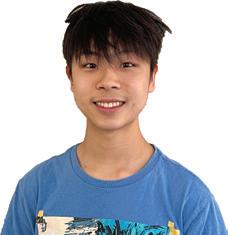
OMake the new library less isolating
By William Liu
n Dec. 12, a long awaited email arrived — Mudd Library was about to reopen after months of renovation. This email marked the return to a once-beloved space at the Upper School, where I had spent so many hours studying and hanging out with friends. The library had always been a vibrant hub for students to gather, unwind and prepare for exams while engaging in fun conversations. Having gone almost four months without a proper place to relax or socialize — the Feldman-Horn mock library lacked Mudd Library’s unique atmosphere — I hoped the new library would be a breath of fresh air.
When I first saw the new library, my excitement clouded my initial judgment. I was in awe of the vast array of study spaces, the new furniture and the bunk beds in the new Learning Center. However, it slowly dawned on me that Mudd Library has never been more isolating.
The library was once a more open area. Featuring a spacious floor plan and towering bookshelves, students had the option to sit down in groups at tables, couches and beanbags to work together. Light conversations were possible all throughout its two floors, and those who needed to focus quietly could go into Silent Study for a more private work space.
The new layout, however, forces students to choose between productivity and socialization. Turn left, and there is a narrow path lined with individual workstations. Turn right, and there are a number of couches devoid of outlets or tables, making it impossible to be

Tproductive. Instead of the group study rooms serving as a place for group projects or studying, they are rented out by students to socialize and eat lunch. These spaces have become limited but in high demand as students attempt to return to the library at the same rate they did before.
Even the large study room is filled with rows of built-in tables, which make the layout seem more like a traditional classroom than a collaborative space. Even though some of the other classrooms in the upper library and Kutler are more conducive to group work, with tables that can be moved closer to one another, they are also nearly unbearable to work in due to the lack of ventilation.
Ultimately, any space for students should aim to create a healthy and productive sense of routine.
It is not necessarily that the library has gotten worse. Rather, it has turned into an exclusive haven for only the most studious at the Upper School. For those seeking a tranquil space for focused work, the new library could not have been better. But to half of the student population who thinks the new library is worse for socializing, according to a Chronicle poll, this shift only exacerbated the challenge of fostering connections and collaborative efforts. Academic pressure already compels students to study alone in
silent areas, and the renovation only further entrenches that. There are still social spaces in the new library, like the couches on the bottom floor or the tables on the second floor. The problem is that they are broadly separated from work-oriented spaces. There are no areas to relax with friends while also studying like in the old library — only one or the other is possible. This seems like overdesigning, where creating one specific purpose for every place in the library reduces its overall usefulness.
Ultimately, any space for students should aim to create a healthy and productive sense of routine. A comfortable, consistent environment in which people can see their friends is more important to student wellness and overall success than a reading nook. Students will eventually adjust to the new space — in just two years there will be no more students on the upper school campus who remember the old library.
We obviously can’t reverse the remodel, nor should we. The renovation did make some legitimately much-needed updates to the old library, and a few simple fixes could alleviate most of the problems with the new setup. For instance, we should prevent students from eating lunch in the group study so that it remains open for students to work. Instead, we should add more table space on the Quad or in the lounge to accommodate those who are used to eating in the library. The library can once again be both a productive and a social space, so long as the school recognizes that they shouldn’t try to separate the two.
End the semester before winter break
By Sabrina Hamideh
he first weeks back from winter break are filled with anxious chatter as students gather in the library and teacher offices, struggling to relearn material from before the break. The end of the first semester brings a heightened level of stress as students grapple with the pressure to review, memorize and prepare for an overwhelming series of exams that complete the semester. But, by ending the first semester before the start of winter break, students will be more familiar with the recently taught material and perform better on their exams before they can fully embrace a relaxing winter break.
Changing the semester schedule would put students’ mental health at the forefront, providing them with a chance to recharge over the break, prepare for the upcoming semester and guard against burnout.
Ending the semester before breaks would allow students to retain the material better
for assessments. Cumulative assignments take a lot of time and effort to prepare for, even when the information is fresh, so scheduling these exams after winter break only puts students in a position where they would have to work much harder for longer periods. Scheduling tests earlier ensures better recall and understanding of the material being tested. The school emphasizes strong student performance and this change would only increase student success.
Shifting the end of first semester will be particularly helpful to seniors who have to submit their semester grades to colleges. Oftentimes, their grades are dependent on the last few tests that lead up to the end of the semester. By giving seniors the opportunity to better retain information, they will not only have a more manageable workload, but they can also perform better. The benefits of this change extend to college applications — it will alleviate the stress seniors face of having to juggle the dual demands of college applications and midterms. Seniors are constantly stressing over their college applications during winter break, so being able to complete all of their exams beforehand will allow them to fully
STATS AND FACTS
Is the new library better for students’ productivity?
Yes: 72.5%
No: 27.5%
Is it harder to socialize in the new library?
Yes: 50.5%
No: 49.5%
Do you like the bunk beds in the Learning Center?
Yes: 67.6%
No: 32.4%
Do you find the new silent study more useful?
Yes: 72.0%
No: 28.0%
*182 students polled
Assistant Opinion Editor Sabrina Hamideh argues that the school should end the first semester before winter break to promote student well-being and academic success.
focus on writing their college supplemental essays instead.
Upcoming midterm exams and assessments also put stress on the student body over the break, hindering their ability to rest and impeding on time that could be spent with friends and relatives. Even if a student is not preparing for a test, the looming anxiety can detract from these memorable times. Changing the semester
schedule would put students’ mental health at the forefront, providing them with a chance to recharge over the break, prepare for the upcoming semester and guard against burnout. This change would not be unique to our school. In fact, it has been adopted at other schools in the area. For example, schools in the Los Angeles Unified School District (LAUSD) end first semester
before letting students out on break. Our school is an outlier in the community, and it’s time we make a decision that best supports student life.
The school is tough as it is, and there is no need to make students experiences more difficult. It is time for the school to recognize the advantages of this adjustment and make a positive change that benefits the entire student population.

hwchronicle.com/opinion Opinion A11 Feb. 1, 2024
ILLUSTRATION BY EVA PARK

Prefect Council adds discounts including Shake Shack
By Analeigh Nava
Prefect Council announced student discounts at Shake Shack and Sweet Butter Kitchen on Jan. 17, with 10% discounts at both restaurants. The two discounts follow 11 other discounts announced in October.
The burger chain Shake Shack opened a new location on Ventura Boulevard earlier in January, about a 10-minute walk from campus. Sweet Butter Kitchen is a bakery and a cafe also on Ventura Boulevard, which sells an assortment of breakfast items and pastries.
Sophomore Prefect Caroline
Cosgrove ’26 said building relationships with the restaurants was time-consuming but worth effort.
“[Prefect Council] reached out to various restaurants and stores near campus through emails and phone calls, especially to ones that are popular among the [school] community,” Cosgrove said. “Some did not reply, others, like Alfred’s, offered limited-time discounts, and others renewed our long-standing discounts, like Il Trammezzino, a restaurant that we have been collaborating with for a few years. The discounts give students an opportunity to spend less at their favorite restaurants, [while]
also bringing in more customers for the restaurants.”
Andrea Colmenares-Cifuentes
’24, a regular customer at Shake Shack and Sharky’s Woodfired Mexican Grill, said she is grateful for the discounts because they allow her to spend less money.
“I use them to save money obviously, but I also know that it helps the school with the partnerships and future partnerships with other stores as well,” Colmenares-Cifuentes says. “Also, I think the stores appreciate the amount of customers they get each day.”
Chris Marin ’25 said it is difficult to ask for discounts at times,
Alumni discuss latest school changes
By Max Turetzky
Harvard-Westlake Student Alumni Association (HWSAA) hosted its annual Community Board Meeting in the newly renovated Mudd Library on Jan. 24. The event, which was open to all alumni, highlighted recent developments at the school, including the renovation of Mudd Library and the ongoing River Park project, which was unanimously approved in September.
President of the Alumni Association Angel Horacek ’95 said the meeting aimed to keep former students engaged with the school community even after moving on from the school.
“This Community Board Meeting is an open meeting that we’ve been having for the last few years,” Horacek said. “We encourage all of the alumni to come back and feel like they’re a part of what’s happening with the alumni board. It helps them get knowledge about what [HWSAA] is doing, and it also provides opportunities for them to participate if they haven’t done so in the past.”
Head of School Laura Ross
spoke to alumni about the school's efforts to improve student mental health since the last school year. Ross said the aftermath of the tragedies on campus encouraged her to reconsider the school's approach to mental health.
“I’ve worked in schools and colleges for 27 years, and there's no question that [last year was] the hardest time for me as a person [and] as a professional,” Ross said. “As we watched the mental health crisis hit teenagers, all of us educators were thinking, ‘What can we do? Are we serving kids right?’”
One major topic at the meeting was River Park, which was approved by the Los Angeles City Council in a unanimous vote Nov. 14. Ross said she is glad the neighborhood granted its green light for River Park and promised new developments for the project in the next two months. Ross said although she empathizes with Studio City residents who oppose River Park, she hopes they will soon recognize the benefits of the project.
“It has been six years of extraordinarily hard work by so
many people to make [River Park] happen," Ross said. "It will not surprise you that there are still neighbors [who] don't think it's the best idea. Our great hope is that once they see that we keep our promises, they will see that we do intend to share it with the community every day.”
Head of Peer Support and Interdisciplinary Studies Tina McGraw ’01, who teaches a class called “The Science of Psychology,” spoke about the Kutler Center, and its impacts. She said the creation of the Kutler Center has given her more freedom to teach interdisciplinary subjects such as her psychology class.
“Psychology just lends itself so naturally to this interdisciplinary process,” McGraw said. “One of the most wonderful things is that we get to spend so much time letting students marinate and reflect on their own experiences, and how they connect with the material. Unlike an [Advanced Placement (AP)] Psychology class, if I were teaching that, I would have to be rushing through content, just 100 miles an hour every single day.”
but the customer service makes him feel better.
“I feel a little shy to tell them that I want a discount, but they always happily attend to me so I don’t feel bad,” Marin says. “I love Shake Shack so the fact that there’s a 10% discount helps me out a lot.”
Eric Vartany ’24, a senior with off-campus lunch privileges, said that the opening of the burger chain nearby allows him and his friends a greater selection of food.
“Shake Shack is great,” Vartany said. “It’s another option for burgers we already have, HiHo [Cheeseburger] and Five Guys. But it’s always nice to have more options,
especially when you have a group of friends that are some people like one type of burger, and other people like a different type of burger. More options is always best.”
Vartany said the discounts provided by the school are also useful for other restaurants in the vicinity.
“The student discounts are useful,” Vartany said. “I forget to use them like most of the time. Like when you’re in the in the speed of payment, and you have like three people behind you, I often forget to say that I’m a Harvard-Westlake student to get the discount, but definitely what I do remember it’s useful.”

Community The Chronicle • Feb. 1, 2024
CONNOR TANG/CHRONICLE
ILLUSTRATION BY AMELIA CHIARELLI
DISTRIBUTING DISCOUNTS: Prefect Council announced a set of discounts for students, including new additions Shake Shack and Sweet Butter Kitchen. Shake Shack, which is about a 10-minute walk away from campus, opened its new Ventura location in the month of January. There were also a number of renewed discounts, which includes a list of over 10 restaurants in the area.
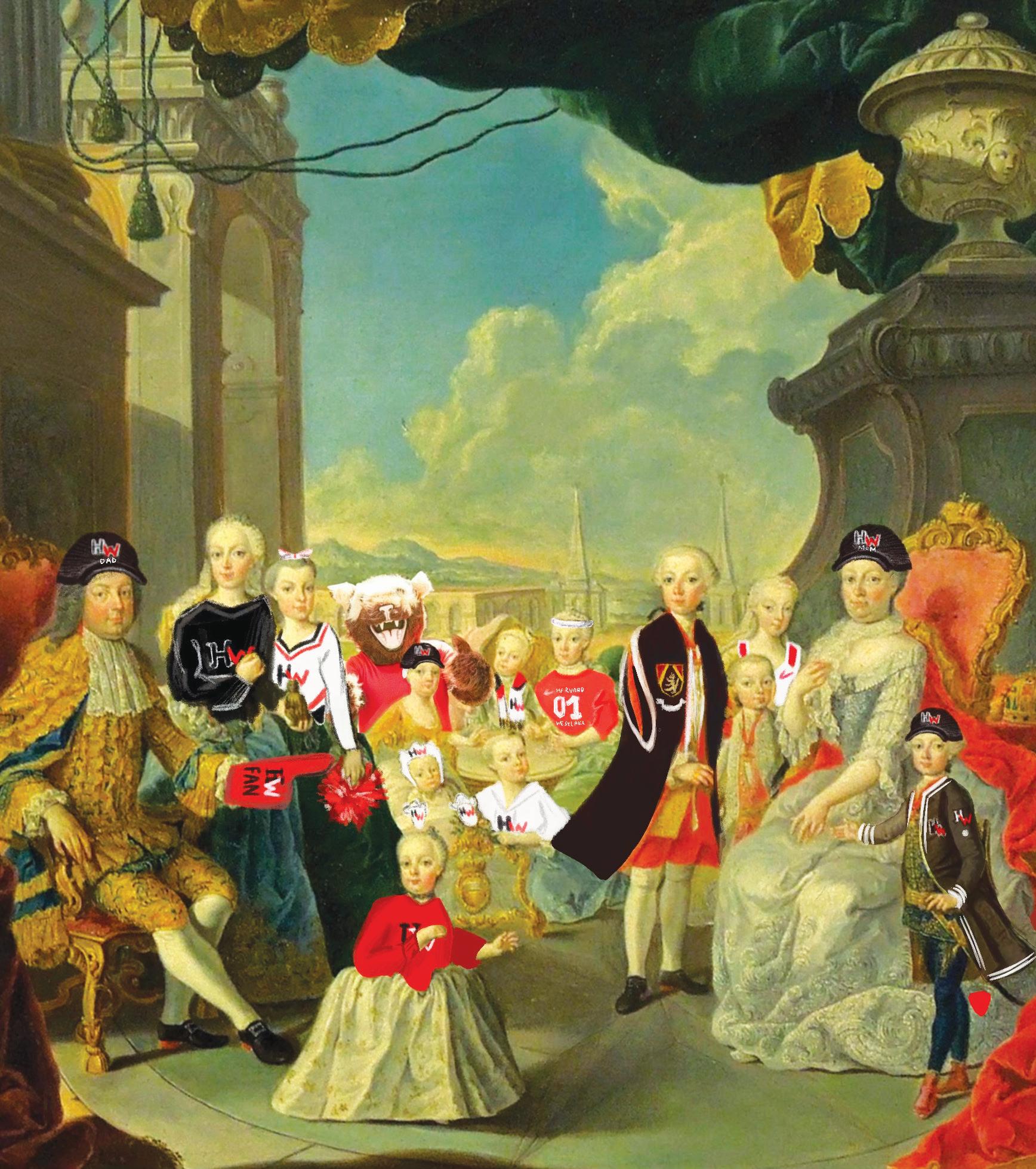
A FAMILY AF FAIR

Features The Chronicle • Feb. 1, 2024 ILLUSTRATION BY IRIS CHUNG/ORIGINAL PAINTING: MARTIN VAN MEYTENS, PD-US-EXPIRED
DYNASTIES
Numerous notable families in the school community discuss their various impacts and their presence among students and faculty.
By Hannah Shahidi
It is 1997. Upper School Dean Sharon Cuseo walks into Rugby Auditorium as she searches for a seat at “West Side Story.” Spotting the Platt family, she goes to sit next to them. Cuseo and the Platts have not known each other for long — in fact, they met for the first time the week before when their oldest child, Samantha Platt ’01, came to campus for her applicant interview. In years to come, the Platts would send all of their children to the school, forming an unofficial “dynasty,” and remaining a prominent name in the school community. Cuseo said she enjoyed being able to make more memories with the Platt siblings as their dean.
“I vividly remember my interview with Samantha Platt,” Cuseo said. “It was like the universe introducing me to the amazing Platt family. She and I had the most intense conversation about the musical ‘Rent’ because she and I had both just seen it. There was a musical at Harvard-Westlake that next week, and the Platt family was there, [though] they hadn’t been admitted yet. From the very begin ning of their time at Har vard-Westlake, we sat in the auditorium and watched musi cals together. That experience happened many more times over the years, which made it even more meaningful.”
Marc Platt is a renowned producer in film, television and theater, best-known for his contribu tions to “Dear Evan Hansen,” “Wicked,” “Legally Blonde” and “La La Land” according to Playbill. He and his wife, Julie Platt, sent their five kids to the school over the span of 20 years. All the Platt children were extensively involved in theater during high school with Ben Platt ’11 later becoming prominent in Broadway and television. Cuseo said a family becomes a dynasty when they stay connected with the school for an exceedingly long time.
From a business perspective, the word means a cohesive economic entity in which family values last for generations, according to Private Wealth Advisor John Thompson. While families at the school are often not more than two or three generations of students and alum ni, there can be values and interests that are passed down through a couple of siblings who have attended the school.
Cuseo said that a student in a prominent family may feel pres sure when their siblings are all suc cessful in a single extracurricular.
“Sometimes, it’s hard when you have an extreme talent in something,” Cuseo said. “If a family is just a bunch of nice, well-rounded kids, then there’s less pressure. But when you’ve got sib lings who are all talented at something, you could come and be a strong stu dent who’s involved and is a leader on a normal level, and you would feel disappointed because you weren’t nationally recognized or Head Prefect.”
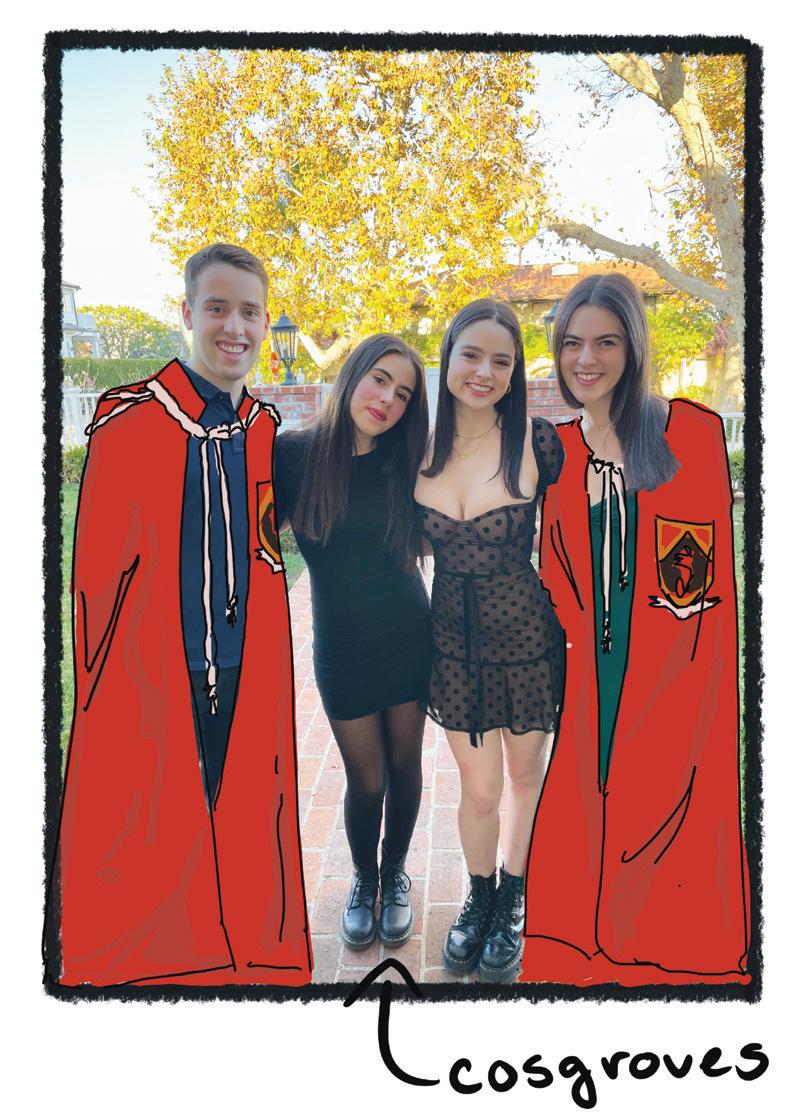
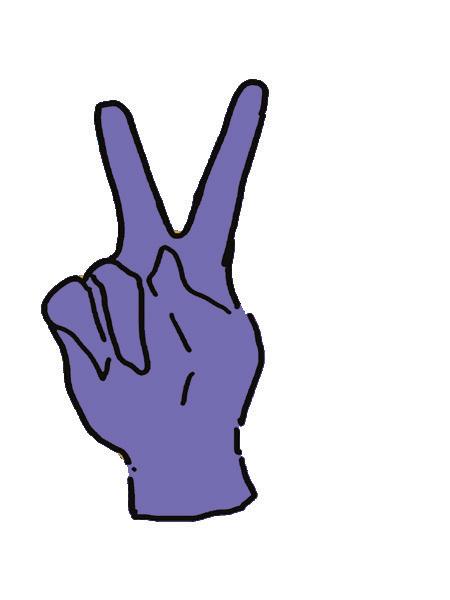
The Cosgroves, another large family at the school, is made up of Julia Cosgrove ’18, Jonathan Cosgrove ’21, former Editor-in-Chief Natalie Cosgrove ’23 and Caroline Cosgrove ’26. Julia and Jonathan Cosgrove both served as Head Prefect, and Caroline Cosgrove is currently a Sophomore Prefect. Like the Platt siblings, all Cosgrove siblings had Cuseo serve as their dean. Cuseo said some dynasties are recognized because of a certain brand they embody.
“Another dynasty is the Thomas [family],” Cuseo said, “There was Lizzie Thomas, Matt Thomas, John Thomas and Mike Thomas. They had strong athletes, leaders, math, science and humanities, but there was never a particular thing. But there is a Platt brand, and there is a Cosgrove brand.”

council. These students are elected through grade-level elections held in the spring. Caroline Cosgrove said she and her siblings all found an interest in serving the student body.
“It may seem like there’s some sort of driving force or pressure to be successful academically or with activities, but our parents’ main focus is for us to be happy with what we’re doing,” Cosgrove said. “Just because of the way things turned out, we all happen to have similar paths, but it wasn’t a calculated thing. It just happened, and they happened to be similar. I don’t think they [thought] we should all run for Prefect. It just happened to be that we all gravitated towards helping the student body in that way.”
Caroline Cosgrove said having multiple kids who have attended the school can make it easier for parents to navigate the experience.
“There’s only so much [a parent] can know by having one kid at Harvard-Westlake,” Caroline Cosgrove said. “We’re all similar, but we still look at things in different ways sometimes, so having that adds perspective and helps them get the full story of the school.”
When Jonathan Cosgrove first came to the school in seventh grade, his oldest sister Julia was in her first year at the Upper School. When he became a senior, his youngest sister Caroline Cosgrove started her first year at the school. Jonathan Cosgrove said he was able to witness his family become a dynasty because he was a student at the same time as all of his siblings.
was only the second one, so it’s not like we’d had many siblings go though already. I know the Platts finished up Harvard-Westlake a few years before I got there, and that was a big dynasty. For us, I was there during the process of it happening because I had one older sister and two younger sisters starting. By my senior year, I started to see a dynasty take shape because that’s when Caroline started.”
In addition to the four Cosgrove siblings, their mother, Rona Cosgrove ’85, attended the Westlake School. Jonathan Cosgrove said his family has always made sure the school is a part of his life since childhood.
“My mom went to Westlake as well, and she loved it,” Jonathan Cosgrove said. “Those were formative years of her life, and a lot of her best friends to this day are people she met at Westlake. I’m also friends with her friends’ kids. I feel like Harvard-Westlake is something we all grew up with because our mom went there and loved it.”
Leila Mercado-Quinn ’25 said dynasties emerge from a group of siblings when they have a well-known brand.
“If [parents] like the school enough to invest so much time and money into their kids going here from the beginning to the end, that’s a long time to be connected to an institution,” Cuseo said. “That’s what makes [a dynasty] more than anything. The only type of people who have a historical connection like that are people who work here, so those families are entering that level of connection. A group of siblings would be less of a dynasty if they were each one year apart, even if there were five or six of them. But if you have a kid at the school over the course of 20 years, then you become a dynasty.”
The definition of a dynasty is a “powerful group or family that maintains its position for a considerable time,” according to Merriam-Webster Dictionary.
Caroline Cosgrove is closest in age to Natalie Cosgrove, but the two were never on one campus at the same time. Caroline Cosgrove said she does not perceive her family to be a dynasty because they do not have many mutual acquaintances.
“We didn’t have much overlap as a big family,” Caroline Cosgrove said. “Some teachers and deans know all of us, and they see our similarities and our differences, so sometimes they’ll comment on it. I wouldn’t say that people think we’re a dynasty. I know that because there are a lot of us, it might seem that way, but we’re all separate people. My oldest sister and I are seven years apart, so we don’t have that many people [that we know] in common. But it’s well-known that all of us were present in the school community.”
Students are represented by four Prefects from each grade in addition to two Head Prefects who oversee the entire
“When I was at Harvard-Westlake, I felt like our family was a dynasty in the making,” Jonathan Cosgrove said. “I

“There are definitely groups of siblings that everyone just knows about because they’re so involved in the community,” Mercado-Quinn said. “In some ways they can feel like dynasties because everyone knows of them and what they do, but not everyone knows them personally. Especially when they all do the same extracurriculars or they’re just similar people personality-wise. It doesn’t happen with everyone, but at Harvard-Westlake, there is a pattern of younger siblings following in the footsteps of the older ones, which can lead to people reognizing them as a dynasty.”
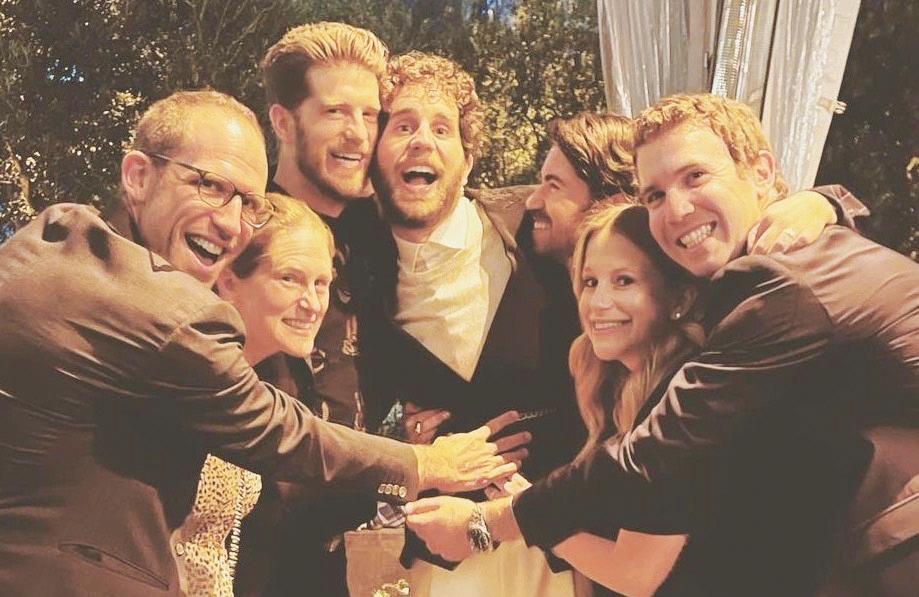
Feb. 1, 2024 B2 Features The Chronicle
• Continued on hwchronicle.com
Breaking the Silence
In light of Black History Month, students, teachers and counselors discuss the pressures and importance of reading about Black narratives.
By MeJo Liao
When Black Leadership, Awareness and Culture Club (BLACC) leader Tiffany Armour ’25 had found out her Honors English III: Imagining America class would be reading “Beloved” by Toni Morrison, she was overjoyed, having read another one of Morrison’s books over the summer and liked it. Now, listening to the audiobook in class, she felt uncomfortable and tense. The book had used the N-word and ‘Negro,’ but her teacher had not addressed the background nor the significance of these words when they came up. Looking around the room, she began to feel a heightened sense of awareness of being the only Black student in her class.
people or hearing certain words,” Olivas said. “For context, I was the only Black person in my entire middle school. Whenever we talked about the Black experience, I felt like I had to give my perspective so much, but I also didn’t want to speak for the whole Black community.”
Upper School Counselor Brittany Bronson said the obligation to represent an entire community puts pressure on students of color to share their perspectives.

“The pressure is very systemic,” Bronson said. “When you are the only person of color, it’s like the spotlight is on you. And so when it comes to doing things in class, people will look at you like, ‘You’re Black, so tell us what the Black experience is.’ But [one] can only speak from one’s own experience, and it shouldn’t be your responsibility to teach your classmates or even your teachers. Also, when reading Black authors, it’s treated as a special project, as opposed to it being normalized. From the outside looking in, we should really integrate [these perspectives] into the curriculum so that it’s not so separate and seen as special because it’s limited.”
[the narrative] with Black women. They had something substantial to do with the founding of this nation, with the ongoing redefinition of freedom and what opportunity looks like in the U.S. It’s important not to overwhelm younger folks but at the same time to know exactly what type of country and history you’re inheriting. So then you’ll know this is why systemic racism is an ongoing thing. This is why the fight continues for Black people.”
When she discusses these topics, Armour said teachers who foster a safe and welcome environment allow her to feel more comfortable.
“Teachers who bring in all perspectives create a classroom environment where the discussion is healthy and positive, which really helps,” Armour said. “To a certain extent, though, there’s only so much a teacher can do because, at the end of the day, any teacher isn’t going to make me less aware that I’m Black or alleviate all the pressure. These are things that I’m going to live with for the rest of my life.”
In Wade’s two HUSH classes, there are no Black students. Wade said he is aware of his own race and position as a teacher in relation to his students when discussing topics of slavery and Black history.
with other people and celebrate her identity with them.
“[Black History Month] is a month that specifically highlights the fact that Black history is American history and how fundamental it is to this country,” Armour said. “Every day, every week, every month, there’s something new happening in the Black community, whether it’s a shooting or police brutality or discrimination. But this [month] is a time to not only recognize these struggles but also to have a month fully devoted to celebrating our culture. It’s also a time to connect with other Black people and share my culture with people that aren’t Black.”
Following this realization while reading books about the African American experience in her English class, Armour said she felt certain obligations to share her point of view in class.
“I was the only Black person in [my] English class,” Armour said. “Reading ‘Beloved’ was an experience that was difficult for me. I felt this pressure to bring my perspective as a Black person, especially to say things that other people might feel reluctant to say, or to use certain language to say straight up what’s going on.”
Similarly, BLACC member Anaya Olivas ’25 said discussing topics related to the African American experience, though important, can be uncomfortable and make her feel pressured to share her perspective.
“Sometimes this perspective can lead to an uncomfortable newness, hearing about the trauma of Black
Nonetheless, Armour said finding representation in the books she read in the classroom was important as it allowed her to feel acknowledged while bringing awareness to the various perspectives shared in class.
“Literature is such a powerful art form to educate people because it touches your emotions on a very personal level, especially when you can have a window into [a character’s] life,” Armour said. “Emotionally connecting with the traumas of slavery or Black history that go unsaid during the everyday makes the struggles more real. That’s why, not only for my own representation, Black authors creating works that are taught in schools is so important. It’s for my non-Black counterparts to see through the lens of [the characters] in a classroom setting. Having that sense of solidarity and understanding is so important.”
To introduce new perspectives into his course, Honors United States History (HUSH) teacher Erik C. Wade assigned his classes reading from “A Black Woman’s History of the United States” by Daina Ramey Berry and Kali Nicole Gross. The text tells American history through the perspective and anecdotes of African American women.
Wade said he made this choice to expose students to the complexities of the experiences of different races in order to understand the current world.
“Quite often, when we think about U.S. history, we think about it in white terms,” Wade said. “We were being taught certain parts of the narrative that are uncomplex. But we don’t think about African American History. So rather than centering on whiteness, I wanted to complicate
“I’m hyper-aware of myself being a Black man,” Wade said. “I struggle sometimes when I don’t see students who look like me in my class. These places weren’t necessarily made for me, but that doesn’t mean that I can’t be a viable voice. It’s important that I’m there with [the students] to have these conversations because there are some teachers who don’t feel comfortable to have them. I try to create a space where people share what they actually believe, with the questions that they have.”
Honors English III teacher Stephanie Chiang said she felt the difficulty of teaching African American perspectives as someone who doesn’t identify as African American.
“I feel like a fraud, honestly,” Chiang said. “I feel like I’m not equipped to be talking about the Black experience because I have not experienced that kind of discrimination and violence. But what I can offer is creating a space where we can learn from each other and learn along with reading the texts. Because at the end of the day, what [the author] did so beautifully was to get us to discover and learn what it means to see and understand our own and others’ [experiences].”
To encourage conversations of Black history and recognize its importance in U.S. history, a week-long celebration of Black History was launched in 1926, called the Negro History Week. This week expanded to become Black History Month, celebrated every February, in 1976 when former President Gerald R. Ford made it official, according to the Ford Library Museum.
Armour said that Black History Month has allowed her to connect
From a historical perspective, Wade said Black History Month serves as a chance to look back on the progress the nation has made towards equality and look forward to what the future holds.
“Black History Month is always complicated because you could talk to different educators,” Wade said. “To those who are very keen on African American culture, having our contributions limited to a month is a bit of a travesty. But it’s also an opportunity to reflect on the strides that we’ve made as a nation and how our Black folks have contributed to that, thinking about how the battles that have been waged as far as equality, equity and opportunity in the U.S. are ongoing. It’s often also important to think about what the Black future looks like in the U.S., not just in February, but beyond it.”
ILLUSTRATIONS BY MAIYA HOLLY hwchronicle.com/features Features B3 Feb. 1, 2024
L. Wood
Tiffany Armour ’25
• Continued on hwchronicle.com
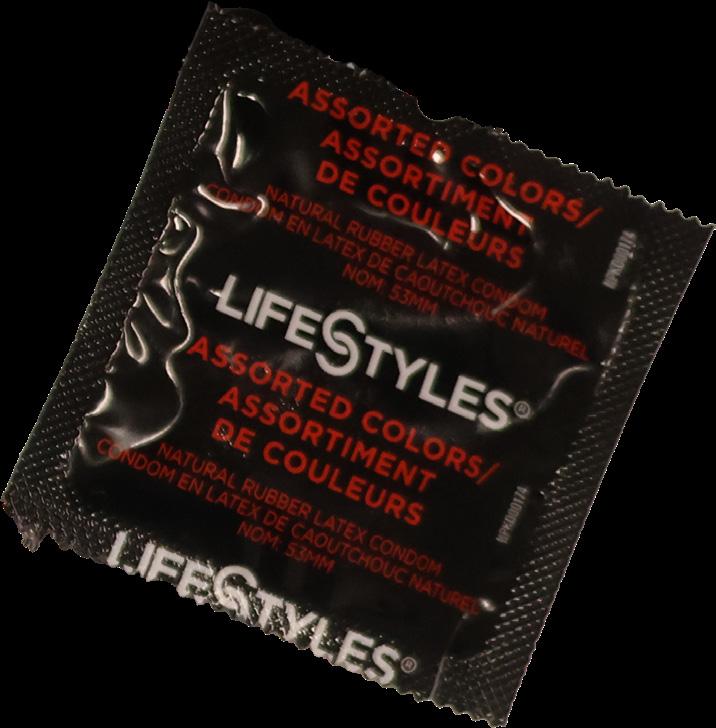

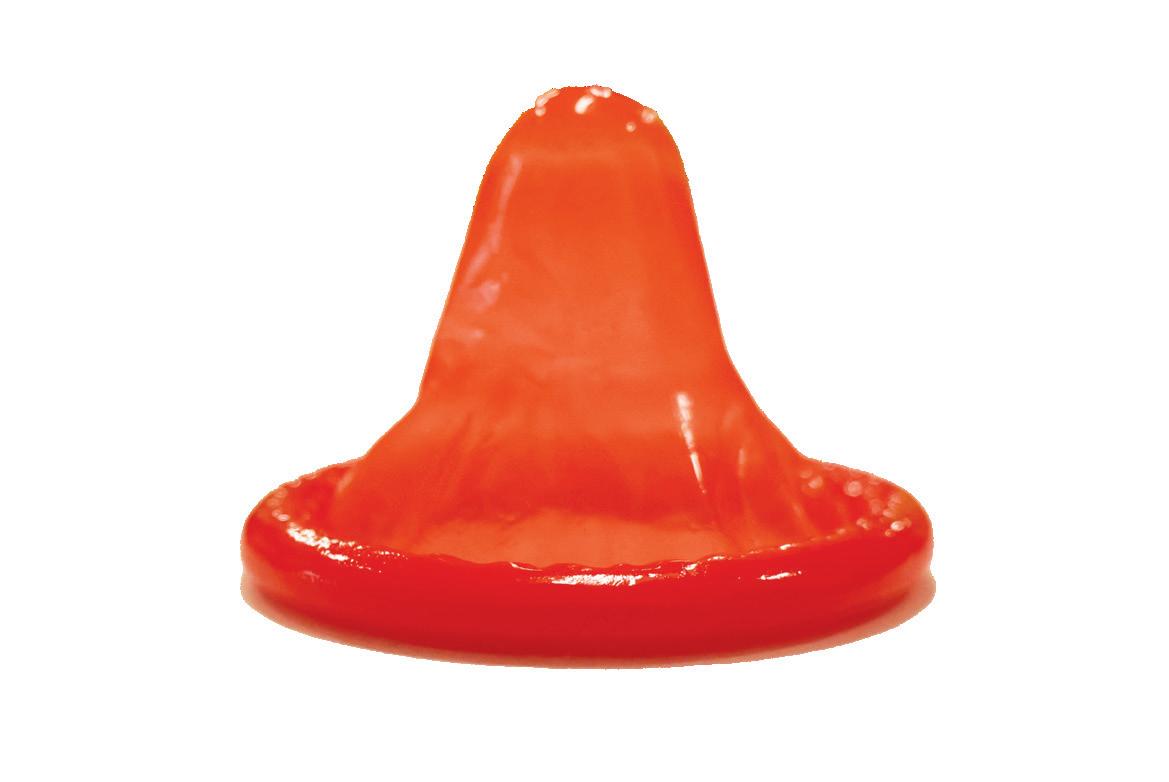
the trash can, and a single bruised banana sat, out of place, in the recycling e classroom was still. An hour or so before this, scores of students, some blushing beet red and others blowing the latex into balloon animals, stretched condoms around bananas here. is activity was part of the school’s sophomore sex education (sex ed) program. Under
funny trying to [ gure out] who wrote what questions.”
Five days of activities, such as the one Karsh described, make up the school’s sophomore sex ed curriculum. e curriculum includes topics on sexual health, sexuality and gender, sexually transmitted diseases, pregnancy prevention and social media.
battle over how children are educated and what they are taught. For example, educators in Alabama, Louisiana, Oklahoma, Texas and South Carolina are permitted to present homosexuality in a negative light, while elevating and promoting heterosexuality, according to a U.S. News and World Report article.
According to “School Health Pro -
B4 Features The Chronicle Feb. 1,
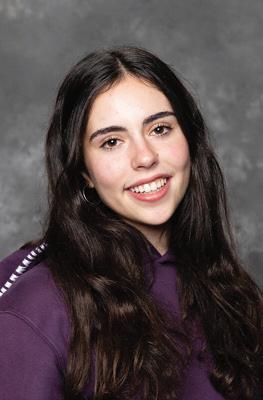



tion,” Shapiro said. “We each had a dif ferent thing like homelessness, vaping and lack of food. It was about problems in the world. I think some people don’t know how to participate in safe sex because they didn’t learn at a time where it was important.”
Health education at the school is currently provided in eighth and 10th

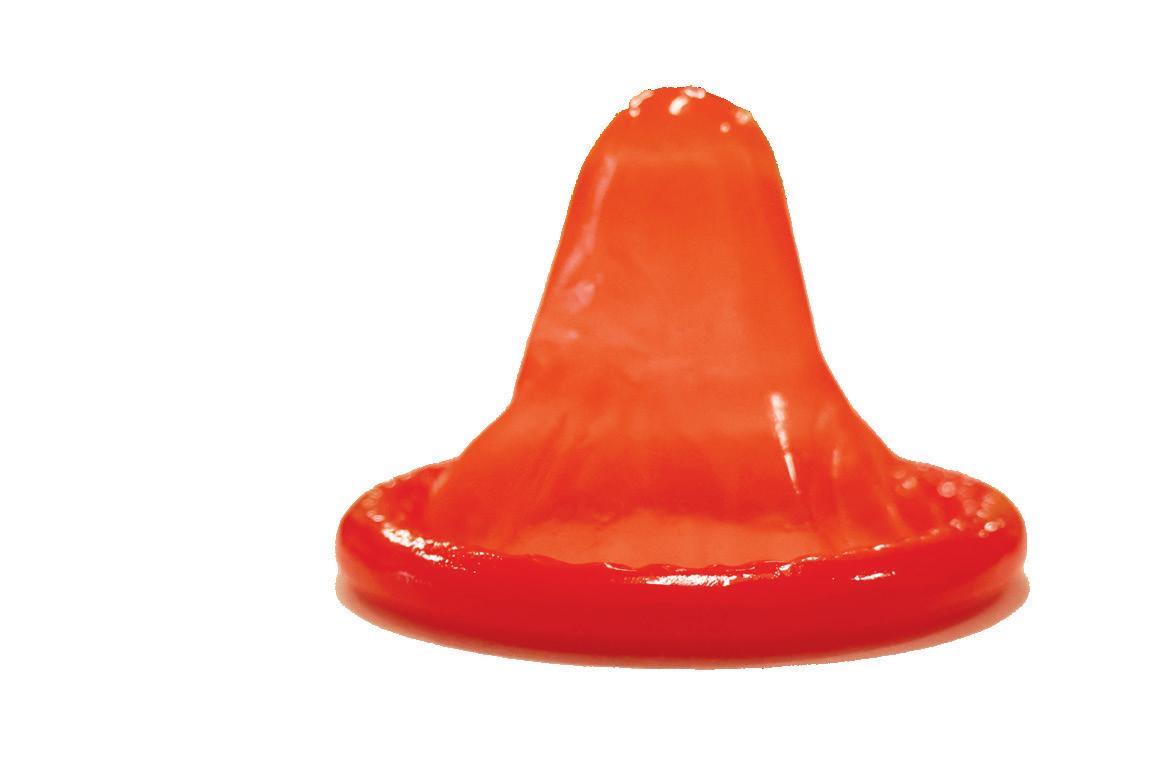
that many people. I just think that if we had more education about it, people would be more aware of the di erent choices. I wish I was more aware of the erent options out there for birth control before I chose what I did.”
“
Upper School Counselor Michelle Bracken said because many sophomores erent developmental stages, sometimes the sex ed they are given feels like it does not resonate with
“I think [sex ed is] something we need to be talking about in developmentally appropriate ways in each grade level,” Bracken said. “So I think the way it’s taken, lots of people are rolling their eyes probably thinking, ‘Oh, my gosh, I already know about all this
less of whether or not they realize it.
“Even though I doubt that most people will consciously say that they walked away from it learning anything, the fact that they did it has to mean something, even [if] it’s not consciously educational,” Suh said. “[ ere is] always some merit to [making] sure that everybody gets equal opportunity and experience with that kind of stu .”
Karsh said she thinks the 10th grade course was less meaningful than the eighth grade one, although the 10th grade class resonated more because she was older.
e 10th grade class] didn’t make a lasting impact on me, but I feel like it was more of a review session,” Karsh said. “In eighth grade, we had human development, which really drilled it in there, even though that was online. I feel like that was more extensive information. In 10th grade it feels like way more relevant information. It’s a lot more timely. I feel like they should maybe do shorter courses every year instead of just giving it to you all at once.”
I think some people don’t know how to participate in safe sex because they didn’t learn at a time where it was important.”
Ellery Shapiro ’24
.’ But to me, I still feel like we need to be talking about those things, and we need to be delivering the information as well as being able to have at’s not an easy
On the student side, 106 out of 182 students who responded to a Chronicle poll said they felt the school’s sex ed curriculum is adequate. Jacob Massey ’25 said he thought the 10th grade sex ed course was necessary and informative.
“I thought it was the most useful and prudent way to teach us about our changing bodies and the changing world that we inhabit, for without comprehensive sex ed we will only cause more unwanted pregnancies, STDs and more,” Massey said. “I’m not afraid to say it.
During this course, students partnered up to put a condom on a banana. Junior Prefect Victor Suh ’25 said that, while he found the activity to be strange, he understood the overall goal.
“I was like, ‘Okay, this is happening now,’” Suh said. “[It was an ] interesting exercise. I understand what the pur pose is obviously. It’s just familiar ity, and [familiarity is] never a bad thing. I do think it’s a little weird. If I try to step outside of myself and look as an objective third par ty observer, I feel like there’s nothing bad to giving ev
While Janice has taken sex ed before, she said she feels like sex ed surrounding birth control is generally insu cient.
“I wish there was more education about di erent birth control methods,” Janice said. “As females, we don’t really get that many options and all birth control kind of sucks. ere’s so many downsides to it and it’s so stigmatized
Re ecting on his perceptions of the grade’s general reaction to the sex ed course, Suh said he thinks most people likely took something away regard-
Upper School Counselor Brittany Bronson said that sex ed needs to teach students how to act responsibly during sex and re ect di erent identities.
“It’s imperative that students have the knowledge on what safe sex is and the measures they can take to protect themselves and their partners,” Bronson said. “It is also important that sex education curriculum is inclusive of all gender identities, expressions and orientations. When I received sex education in high school, we only learned about [cisgender] male and female bodies and heterosexual relationships. It is a beautiful thing to witness the growth of sex education and how all encompassing it has become.”
Massey said he thinks that if sex ed is something that students need to receive, then school is where they should receive it.
“I think that our schools are our primary source of learning, so if it is felt by our society that this is an important subject that needs to be taught, then school is the best place to learn about that subject,” Massey said. “Schools should have a hands-on approach to sex education.”
*Name has been changed.

PHOTOS BY ZOE GOOR
L. Wood
Caroline
Cosgrove ’26
Features B5 hwchronicle.com/features 1, 2024
The Gold Standard
Students discuss how their parents can have high expectations of them and how that can affect them through their childhood years.
By Alex Dinh
Christian Horry ’24 looked around the room and saw his dad and his old co-workers. For Horry, his dad’s old co-workers aren’t just friends from the office — they are former players for the Los Angeles Lakers who helped the team win three straight National Basketball Association (NBA) titles from 2000-2002. Horry, age four, had just seen his dad, seven-time NBA Champion Robert Horry, retire from the NBA. While he was in that room, surrounded by NBA Champions, Horry knew that the expectations were high. Even though his dad never told him he had to play basketball, in that moment, he felt the pressure of his fathers achievements looming over him.
Horry said that even though he was not able to see his dad play very much in the NBA, it drew him into basketball.
“I was born in 2005, and he retired in 2009, so I didn’t get to see a lot of [his career],” Horry said. “But I definitely felt the impact of it growing up and of all the people I would be around. It was cool, and it made me fall in love with the game of basketball.”
Horry said playing basketball with his dad has brought them a lot closer, despite Horry feeling a need to live up to his father as a kid.
“I used to feel a lot of pressure when I was younger,” Horry said. “But now that I’ve grown up, it’s not that much pressure because my dad has always made it clear that he doesn’t care how I perform in basketball. He just wants me to do well in life. We spend a lot more time together because instead of me being in the house playing video games, we will be in the gym hooping together.”
to offer their children support as they go through school.
“There’s a balance between being over-involved where it feels like they’re almost sitting next to you at the desk in class versus that more removed experience,” Joyner said. “Somewhere in the middle seems best. If the parents aren’t involved in the school process at all, a student might feel [the lack of] an anchor and some support structure. It’s nice to feel like someone is curious about how you’re doing without being overly invested in the outcome.”
As opposed to some who feel that their parents are too involved, Nora* said her distant relationship with her parents has made her a more self-sufficient person.
“My parents haven’t played a huge role in my life because they haven’t been that present,” Nora said. “I honestly like the person that it has made me, but it’s very different for a lot of people because my parents didn’t really do a lot of stuff for me. From a young age, I was managing all my own stuff. The absence of my parents has made me grow up very fast, which has shaped me a lot.”
“ Often, the way we handle emotions and experiences is modeled by our parents.”
- Emily Joyner Upper School Psychologist
George Ma ’25 has a similar experience, as his mom is a Professor of Economics at Peking University in Beijing, and his dad is an architect with business around Europe and Asia. Ma said his parents often being away has made him self-sufficient, but it can also be difficult.
disorders, diet culture and weight stigma, after seeing the harmful effects of eating disorders while dealing with anorexia. Nora said nearly everyone she knows with an eating disorder also has a parent with an eating disorder.
“I find intergenerational eating disorders interesting because a lot of people get eating disorders from their parents,” Nora said. “People tend to be upset with parents because it seems like they’re the cause of an eating disorder. It’s a really common thing, but can we really blame parents for that? Because they’re also a victim of societal beauty standards and things that cause eating disorders. Almost everyone that I know who has had an eating disorder, some aspect of it was because their mom had an eating disorder too.”
Joyner said that parents can impact how their kids deal with important events in their lives.
shaped by growing up fast,” Nora said. “It didn’t feel as much of a change compared to a lot of my friends who are also here. I wanted to be grown up for a long time, and I want my career to start. Also, my parents got divorced about a year and a half ago. My home life was kind of a disaster last year, so I wanted to leave for a bit.”
Nora said being abroad has led to her relationships with her parents to evolve.
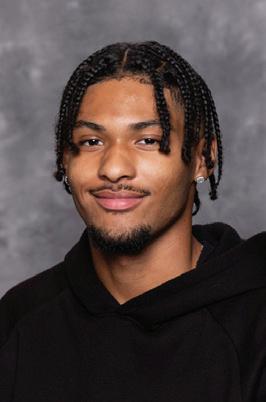
“Often, the way we handle emotions and experiences is modeled by our parents,” Joyner said. “We can see that come up through relationships to food. Also, seeing how parents handle conflict with each other is how we learn what to do with our own emotions. How we deal with emotions and eating disorders can absolutely be an intergenerational process.”
Nora is spending her junior year away from home, studying abroad in Paris. In addition to her interest in the French language and culture, Nora said her independence and life at home motivated her to spend a year away.
“When I saw my dad for the first time since I left for France, it was definitely easier to be together,” Nora said. “My dad and I have a very weird relationship, but because we spent so much time apart, we weren’t fighting about anything. With my mom, I’ve never been that close with her, and being abroad has made me appreciate her more. Even though she doesn’t help me a lot in life, it’s nice to have a mom there when something happens, which has been hard while living in another country.”
Ma said he can stay close to his parents even if they are not in town a lot.
“In the end, I love my parents and they love me,” Ma said. “Even if we don’t spend that much time together, the moments that we do get to share keep the bond strong. We love going out to dinner, and these memories make up for all the lost time.”
While some parents pass down their love of a sport to their children, others pass down their worries and stress. Kids with a parent who suffers from anxiety are up to seven times more likely to have anxiety, according to the Journal of Consulting and Clinical Psychology. Additionally, almost one-third of sophomores and juniors at the school said their parents make them feel like they are not doing well, according to the Authentic Connections survey taken by the entire student body. Carson* said his dad often takes out his stress onto him.
“My dad will pressure me about [school work], and I’ll say ‘I’m doing it,’” Carson said. “The way he deals with his anxieties is by managing other people, and oftentimes, that’s me getting managed. That affects me. It has made me a much more anxious person and distanced me from him a lot.”
Upper School Psychologist Emily Joyner said she sees the results of the Authentic Connections survey reflected in her talks with students.
“The results from the [Authentic Connections] survey represent what I’ve heard from people about how it feels when parents are super invested in their kids getting certain grades,” Joyner said. “That pressure can sometimes lead to more avoidance of tasks and procrastination. Then, I can see it going in the direction where the [involvement] is not conducive to being able to achieve those goals. Parents being so invested in grades can make students feel like they are not acknowledged for their humanity and who they are as a person. It is reduced to equating self-worth with grades.”
Joyner said it is important for parents
“I have more individual skills and am more independent as a person because of them being away,” Ma said. “It’s kind of sad how they’re always away, but I get to call and FaceTime them a lot while they are gone and look forward to when they are coming back.”
Another potential cause of anxiety in adolescents is comparisons to their siblings. Children who receive less affection from their parents in comparison to a sibling become more likely to commit vandalism, violence and theft because of the damage to their self-perceptions, according to the Behavioral Science Institute. Joyner said being compared to other people can lead to a reduced sense of individuality.
“Comparison with others stifles personal exploration and finding out what your interests and values are,” Joyner said. “Everyone learns differently. Everyone has a different relationship with their academics and what they’re interested in. And if you’re being compared to one template, it’s pretty stifling.”
Nora, who has six older siblings and a twin brother, said her dad often sets expectations of her relative to her older siblings.
“My dad tends to compare me to my other siblings a lot,” Nora said. “My mom does not because she’s a psychiatrist and understands how things she says affect mental health. My dad does [compare me] a lot, which kind of sucks, and it has definitely strained my relationship with him.”
Nora started One Bite at a Time, a small business aimed at fighting eating

“The fact that I readily packed up and moved across the world without my parents was definitely
*Name has been changed
ILLUSTRATION BY SABRINA SIMEK
L. Wood Christian Horry ’24
Feb. 1, 2024 B6 Features The Chronicle
LOSING FAITH
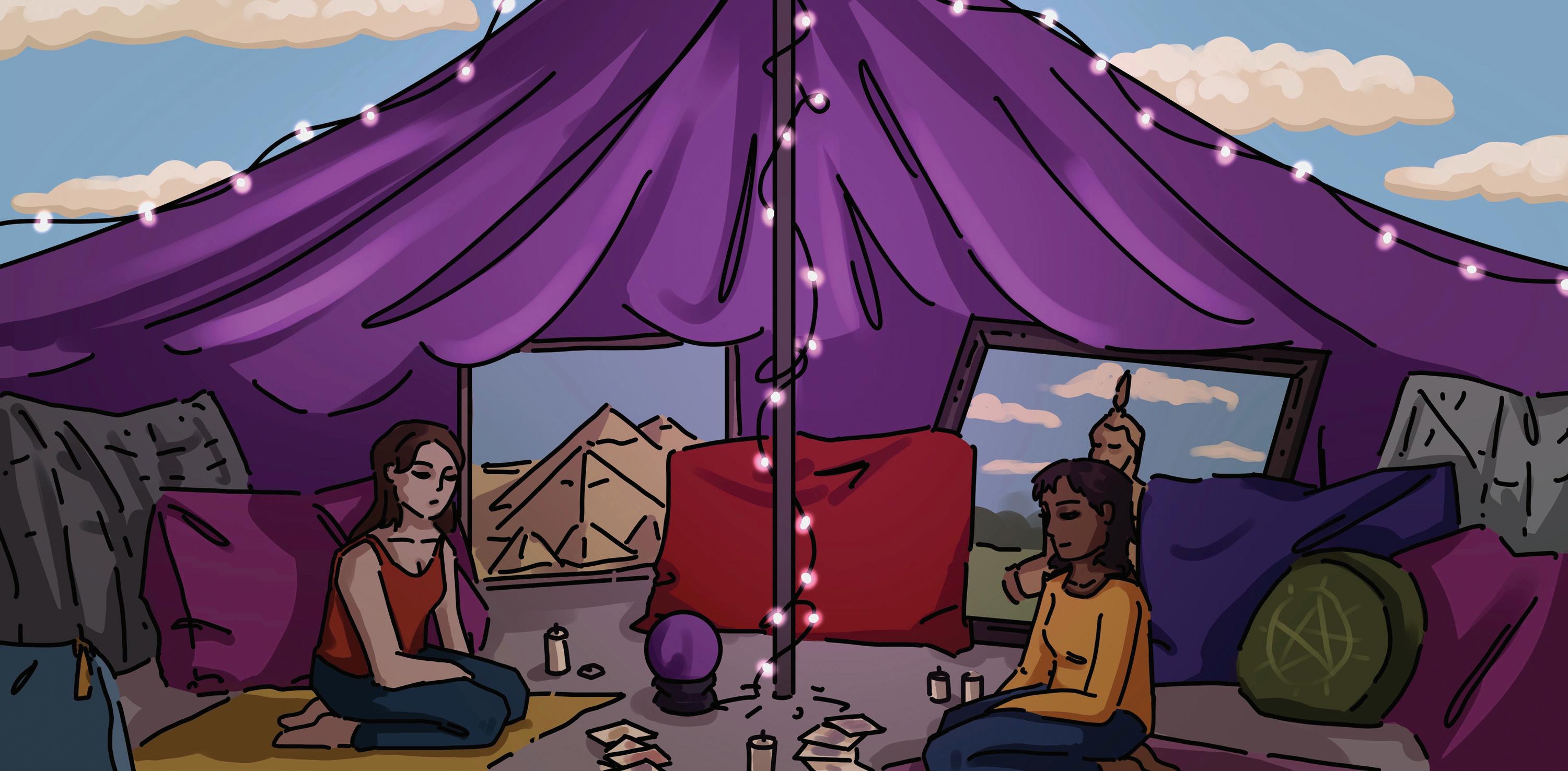
Members of the school community discuss the rise in spiritual activities like visiting psychics, crystal collections and religious worship among Gen Z.
By Alden Detmer and Saisha Kumar
Sitting in a cramped and slightly foggy booth on a plush leather chair, Librarian Kacie Cox let out a heavy sigh as she looked around. Crystals of all shapes and sizes rest on every surface. Fluorescent purple light fills the room from a single lightbulb on a stand. Even though there are three different Buddha statues surrounding her, the setting is not enough to distract from the pungent scent of sage and cigarettes.
In the small bookstore on Ventura Boulevard, a psychic dressed in a colorful wool shawl, silver turban and blue skirt peeked through the curtain and stepped inside. Cox said the woman began the palm reading with detailed questions about her life.
“She started by asking my name, what I do for a living and why [I was] there,” Cox said. “She asked, ‘What brought you to me?’ and ‘What are you interested in?’ They talk very softly in a calming voice. It’s all around just a very calm environment.”
psychic for financial advice, Clara Berg ’25 has gone through various phases of spirituality, ranging from astrology to a personal crystal collection. At age 13, Berg began reading tarot cards to herself and her family, a spiritual practice used to gain insight into the past, present or future, according to Lifestyle Asia. Although she no longer believes in what the cards dictate, Berg said the practice adds value to her life.

“I used to think that [the tarot cards] were so profound, and that I was learning so much about myself,” Berg said. “I look at my tarot cards now, and they’re all just so broad. That’s what makes them seem so profound because they can be applied to any situation. It’s a part of self discovery to wonder and try to make sense of things.”
Along with tarot cards, Berg also used to believe she had a spiritual connection to crystals. Though she does not entirely believe in how crystals affect events, Berg said she is still open to the idea that they may have some spiritual significance.
ple were feeling really lonely and shut off. A lot of people turned to spirituality [like] crystals and tarot cards to try and predict the future. In times of uncertainty, people turn to higher powers. But for our generation, that happened to be spirituality as opposed to religion. I started doing a lot of reading and research about auras and practicing it as a form of mindfulness and entertainment.”
Chiarelli said even aside from the pandemic, she thinks her peers generally turn to spiritual practices as a form of reassurance during periods of stress.
“There’s a lot of people who are comforted by the idea of being able to know the future in its entirety or even have some kind of framework that they can follow,” Chiarelli said. “Even if it is all just a placebo effect, it’s really good to help put people’s minds at ease. Just the idea that the future can be seen is really comforting.”
After growing up a Christian but never fully committing to his faith, Andrew Suh ’26 said he began to dive deeper into the teachings of Christ following so cial and school issues.
raised Catholic and felt that her religion was a direct result of her parents’ and relatives’ influence.
“I do feel pressured to have the same religion as my family, but mostly it’s just feeling like I’m part of a community that my family is a part of as well,” McNary said. “Religion isn’t something I think about a lot. I feel like in different circumstances, I would [follow] a different religion or not [be] religious at all.”
After hearing from a female rabbi in a women’s studies course at Westlake, Rabbi Karen Bender ’84 felt inspired and served for 20 years in a synagogue before shifting to Los Angeles Jewish Home, a senior living organization. Bender said her involvement with religion in the 1980s was vastly different than what her own children have experienced.
In addition to hearing about her friends’ experiences, a psychic correctly predicted Cox’s mother would have two daughters and switch careers at a certain age. Cox said she continues to return to psychics because she has always had a positive and enlightening experience with them.
“I learned a lot about what I think about myself,” Cox said. “The psychic I went to the first time focused a lot on self-improvement and what I needed to focus on in order to reach [my] highest self. I learned a lot about the way that I love people and the way that I communicate. Even if it’s little things that I already knew, it’s affirming to hear it from someone else.”
Cox and her friends are not alone in their visit to a medium: over 70% of Americans now believe they have some sort of spiritual connection, according to Pew Research Center. In fact, 25% of millennials and 17% of Generation Z (Gen Z) consult a fortune teller for financial advice, compared to 6% for Generation X (Gen X) and 1% for Baby Boomers, according to Empower.
While she has not consulted a
“I have had a connection to my spirituality [ever since] I got into crystals over quarantine,” Berg said. “I believed in their properties and how some crystals are grounding. It sounds a little bit ridiculous talking about it now because they are just cool rocks. A lot of cultures have tied significance to different natural elements, so [it does] make you wonder if they’re kind of magical.”
Berg’s deeper sense of spiritual connection resulted from the COVID-19 pandemic, when the uncertainty and isolation of lockdowns drove some Americans to experiment with their spirituality. Twenty-eight percent of Americans reported stronger personal faith as a result of the pandemic, according to Pew Research Center.
After looking for recreational options while stuck at home, Amelia Chiarelli ’25 began to reflect on her spirituality. Chiarelli said many gravitated towards spirituality during the pandemic because they needed something to create a sense of order.
“This [turn to spirituality] happened to a lot of people I knew over the pandemic,” Chiarelli said. “Peo -
“Recently, I’ve been having more prob lems as I grow older,” Suh said. “Because I’m already a Chris tian, why not look a little bit deeper into what I’m supposed to believe? At first, [I thought] mass was boring, and I didn’t re ally get it until I start ed looking more and more into it. A few months later, after reading through the Bible, I look forward to reading three or four chapters each night.”
Suh now regularly posts quotes from the Bible on his Instagram account in an effort to share his beliefs with the community, which has become increasingly less committed to religion. More than one-third of Gen Z identifies as religiously unaffiliated, making the group the least religious generation in the nation, according to the Survey Center on American Life.

“When I was a kid, there were only a few things to do, like playing sports, studying an instrument, dancing or going to Hebrew school,” Bender said. “But now, there are 10 million things you can do, even if you put away your screen. People care more about their extracurricular activities now than they do Hebrew school attendance. I don’t know if that’s coming from Gen Z as much as it’s coming from the way Gen X parents prioritize different things. I’m a rabbi, and I didn’t force my kids to go to Hebrew high school.”
Berg said the trend of exploring whatever kind of spirituality works best for someone may be a result of young people shifting away from the practice of organized religion toward less strict practices.
In comparison to Suh’s direct pursuit of a spiritual connection, Laura McNary ’25 said she was
“Spirituality is a lot more free in that there are [fewer] rules,” Berg said. “Spiritual beliefs aren’t like traditional religions, and they don’t have a set of commandments or a set of rules that you have to follow. That freedom might be part of what draws Gen Z in. Spirituality is ancient, but I think it’s being rediscovered with our modern technology and our new ideas about zodiac signs or celestial bodies.”
ILLUSTRATIONS BY LUCIA PLATA
hwchronicle.com/features Features B7 Feb. 1, 2024

Be Mine
Mad Libs
(To your future Valentine)
Are you ever sitting in ___________ (building on campus), breathing in the ___________ (adjective) February air and wondering why you’re still ___________ (negative adjective) and alone? Well, don’t worry! The Chronicle is here to help! Here’s the ___________ (adjective) guide to asking out your crush for Valentine’s Day this year:
1. Make sure to put on ___________ (messy food) scented deodorant to school EVERY DAY. Even though ___________ (teacher) will probably comment on how ___________ (negative adjective) you smell during ___________ (unconventional sport) practice, your future Valentine will fall madly in love with you.
2. Show your crush, ___________ (Chronicle staffer), that you can take initiative and prompose early! We have a few ideas. You can take a(n) ___________ (animal) to your math class and throw it out the window ___________ (adverb) so that it falls on your crush who is ___________ (verb) on the Quad. They’re sure to say yes! If that doesn’t work, call up ___________ (cancelled celebrity) and get them to start Twitter beef with you. After you gain followers from all ___________’s (same celebrity) haters, your crush will want to join in on the fame.
3. DO NOT buy them a box of ___________’s (history teacher) homemade chocolates. We wouldn’t trust it. Instead, you should make them a(n) ___________ (person you hate) scented slime as a method of communicating your true feelings. If you’re feeling extra ___________ (adjective), maybe get them some ___________ (cafeteria food) flavored Taki chips.
4. Get cancelled by ___________ (extracurricular) kids for ___________ (adverb) telling someone that they look like a(n) ___________ (adjective) ___________ (animal) that’s having a bad day. This boldness will show your crush that you mean ___________ (adjective) business. They will be filled with ___________ (emotion) that they will actually ask you to be their Valentine.
If you follow these steps but do not have a Valentine by Feb. 14th, ___________ (year you expect to graduate from college), you will be entitled to ___________ (number from 3-10) point four billion dollars in compensation taken out of The Chronicle’s snack budget.






XOXO, The Chronicle Feb. 1, 2024 B8 Features The Chronicle
ILLUSTRATION BY JADE HARRIS
Arts & Entertainment
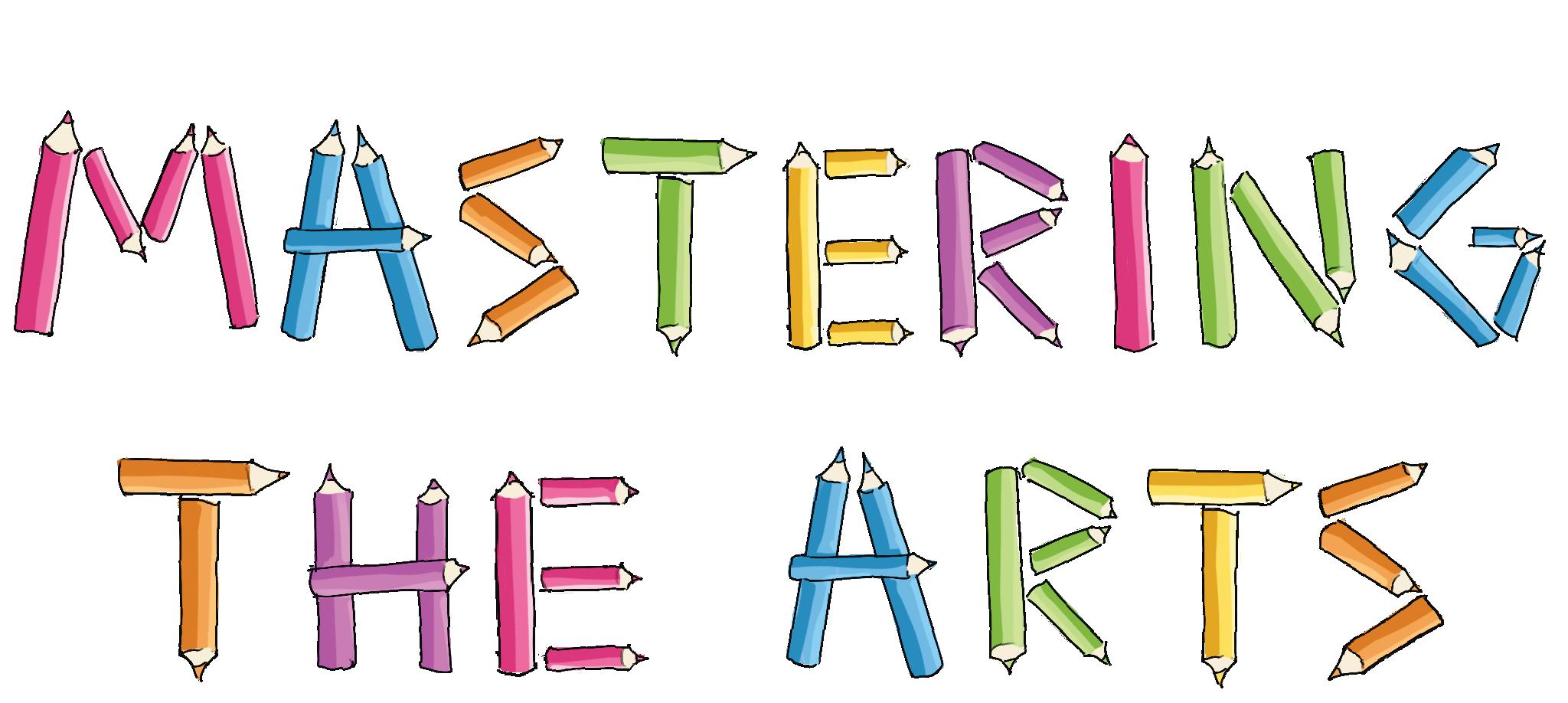
Students and faculty discuss the process of applying to college for art and its relationship with students’ academic life.
By Sasha Aghnatios
As the clock ticked down to 1:00 p.m., Edie Cohen ’24 compulsively checked the time and bounced her knee nervously as she struggled to focus on her English in-class essay. When she refreshed her inbox after the essay and saw an email from the Rhode Island School of Design (RISD), she could not steady her hands as she went to go click on it. After she saw the confetti appear on the screen indicating that she had been accepted, Cohen was ecstatic and grateful that she would be able to go to her dream school next year. Like many of her classmates, Cohen had worked tirelessly on her application,
to feel comfortable expressing myself, whether it be my identity or creativity.”
Cohen said her art mainly involves oil painting and filmmaking, which her parents encouraged her to pursue in college and beyond.

“I have always gravitated towards making art using my hands,” Cohen said. “I love the process of oil painting as there are multiple steps, and each one feels impactful. In terms of filmmaking, I have grown up in a movie-loving family, and they were in total agreement of me applying to RISD, which I am very lucky for.”
Upper School Dean
Sharon Cuseo said the process of applying to school for art requires strategy and time.
“First of all, applicants need to decide if they want to apply to an art school, where everyone there is majoring in some aspect of the visual arts, or if they are applying as an art major to a college or university that offers more than just art,” Cuseo said. “They could [also] be applying to an art school within a liberal arts and sciences college.”
ages of their art as part of the normal Common Application activities grid.”
Upper School Art Teacher
Gustavo Godoy said he works with his students to ensure that their pieces have a clear story to help strengthen their portfolios.
camp, I realized that I can’t just take performance-centered classes all the time. Discussing theater was too abstract for me, and I missed learning equations and computable problems.”
Fried said colleges often require students to come to the school and do in-person auditions for theater, and that this process is very intense and intimidating, which ultimately influenced her decision to not apply for art.
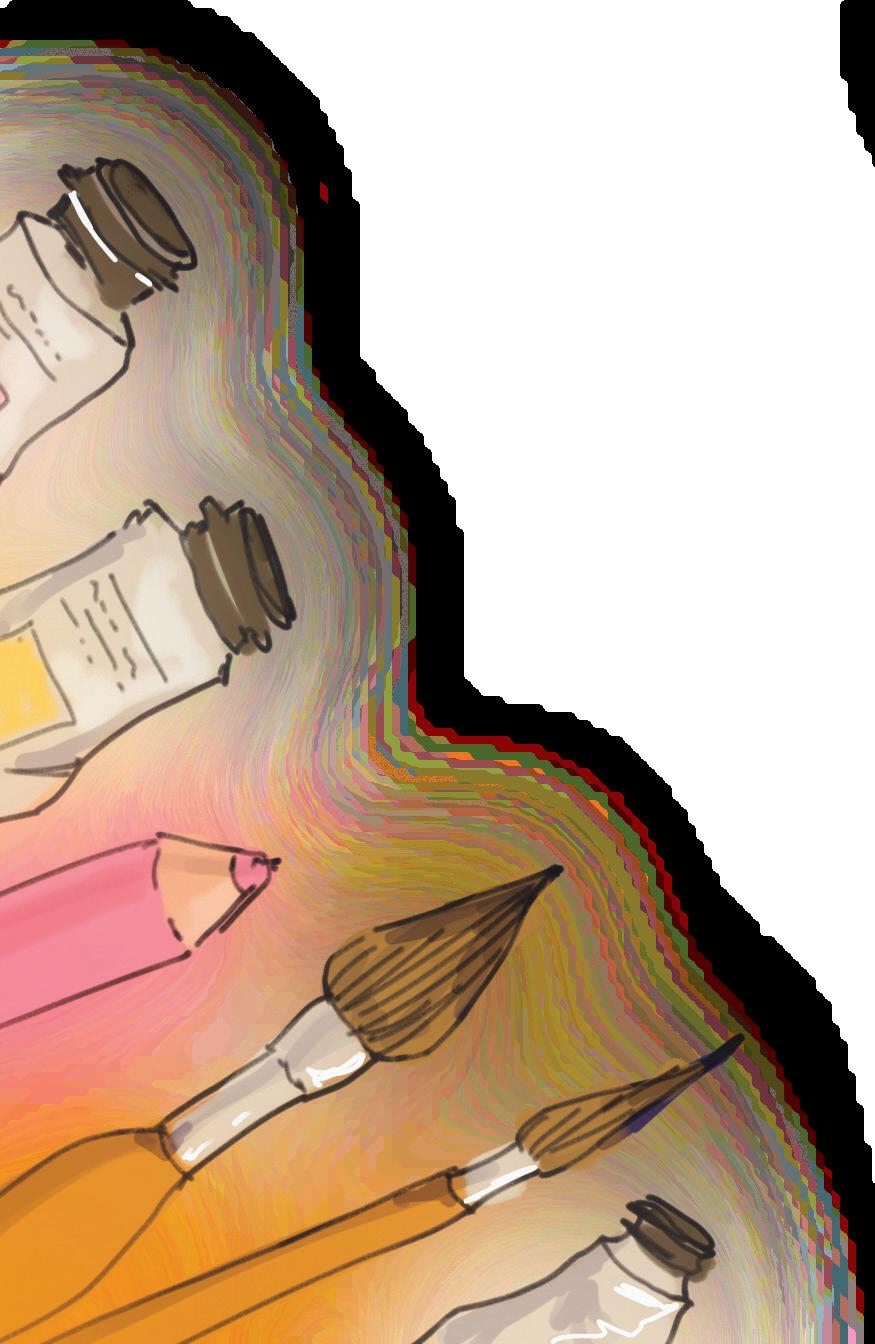
Cuseo said once this decision has been made, the application process differs from school to school.
“Then, [students] need to figure out what the portfolio options and requirements are for their program,” Cuseo said. “Some schools, like Stanford, require all of the applicants who will be submitting portfolios to do so two weeks ahead of the regular application deadline. Most of the time, they are using a site called ‘SlideRoom’ for submitting their portfolios. If a school doesn’t have a formal portfolio submission process, then students can create their own website to display their art or just provide links to im-
“I spend a lot of time helping students build a narrative around the work they have created at Harvard-Westlake,” Gustavo Godoy said. “I help them think about what skills and concepts they should showcase in the group of 12 to 20 images that go into the portfolio. The portfolio is a snapshot of your art experience in high school and can show how you connect personal interests, issues from history, social concerns or your imaginative wanderings to an aesthetic expression. I also can help students choose schools that feel appropriate to the kind of rigor and type of work they hope to make in college. All of the faculty members of our [Upper School Visual Arts Department] are artists who went to art school, and we have a lot of experiences to share.”
Elise Fried ’24 is a member of the school’s performing arts program but decided not to apply to college for art. Fried said her decision was greatly influenced by the fact that pursuing a degree in theater is academically limiting.
“At a lot of schools, pursuing theater is [through] the Bachelor of the Fine Arts [BFA] route,” Fried said. “For these BFA programs, you often have to apply and audition. I was terrified to do that. I don’t want people judging what I create on a pass-or-fail basis [and] choosing whether I move on to the next round or not. I only indicated theater as a potential major at schools where that wouldn’t necessitate an audition.”
“ I realized for my next step I want to be fully surrounded by creative individuals, as well as focus fully on my own artwork.”
Edie Cohen ’24
“I decided not to apply to college as solely a theater major because I knew going into the process that I still wanted to be able to pursue other academic interests, and I don’t intend to pursue theater professionally,” Fried said. “After spending seven weeks in an intense 24/7 sleepaway theater

Diego Godoy ’24 will be majoring in Studio Arts at Tufts University next fall, and said that while he does not specialize in a single medium, his art has inspired him and led him to explore the world and himself.
“I don’t have a specific type of art that I specialize at this point besides it being 3D art,” Diego Godoy said. “My art at this point has consisted of ceramics, wood work and welding. My most recent pieces have been influenced by my Mexican heritage and have been a way for me to explore and learn more about my family’s origin which started with a research trip I did over the summer to the Yucatan Peninsula of Mexico.”
• Continued

The Chronicle • Feb. 1, 2024 ILLUSTRATIONS BY ANNABELLE CHEUNG
L. Wood Diego Godoy ’24
on hwchronicle.com

Theater students discuss their thoughts on the upcoming production of ‘Sweeney Todd: The Demon Barber of Fleet Street.’
By Davis Marks and Everett Lakey
Walking to rehearsal while attending a summer theatre program, Elise Fried ’24 and Anna Ames ’24 eagerly discussed their favorite Broadway shows. With their senior year approaching, Fried and Ames knew the winter musical was going to be announced soon and nervously awaited the news. Suddenly, Fried felt a buzz in her pocket and took out her phone to see an email notification from Performing Arts Teacher Sabrina Washburn. Upon seeing “Sweeney Todd: The Demon Barber of Fleet Street” was chosen, Fried dropped to her knees out of immense excitement.
“When I found out about the show, I fell to my knees dramatically because ‘Sweeney Todd’ is my favorite musical,” Fried said. “There are so many Broadway shows that I love, but I find it so impressive how much care Stephen Sondheim put into ‘Sweeney Todd.’ The music is really beautiful, but it also ties so many different themes together and often foreshadows events [that occur] in the show. Every time I listen to [cast] recordings, I am floored by the intricacy of the music and the care that was put into creating it, so I was just so excited that we would have the opportunity to emulate such a complex and incredible show.”
amazing job. We are obviously not Broadway, but when the show was announced, I was really excited to see how we would make the show our own. I started thinking about what our set, costumes and blood effects would eventually look like.”
Performing Arts Teacher and show director Michele Spears, said “Sweeney Todd” impressed her because it mixes grandeur and personal moments.
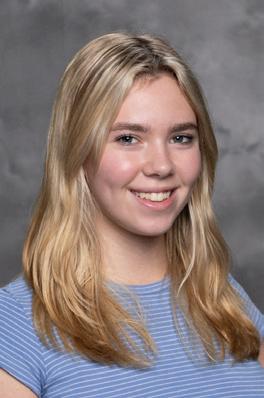
“What stood out to me when deciding what show to produce was how big yet intimate it is,” Spears said. “Sondheim describes ‘Sweeney Todd’ as being a movie on stage, and it really feels that way. The music is operatic and the show is chaotic, but every moment reveals so much about the characters. I’m a big believer that there’s so much to learn about the potential of musical theater through Sondheim, and this show provides so many learning opportunities for actors because of the degree to which music and storytelling are intertwined.”
think her relationship with Sweeney is the most humanizing thing about her. She does all these horrible things, but most of them she just does for him.”
Tolbert-Schwartz said exploring her character has allowed her to improve her acting abilities.
“I definitely feel like I have grown as an actor,” Tol bert-Schwartz said. “It has been a lot of character study for me where I’ve just been working on making sure I really understand [Mrs. Lovett] as a charac ter. I’ve realized that as an actress, if I un derstand the charac ter deeply, the move ments and emotions will just ultimately come naturally.”
Set in Victorian London, “Sweeney Todd” is a dark and comedic musical that tells the story of Benjamin Barker, a barber who is wrongfully imprisoned by a corrupt judge. After years of suffering, Barker escapes and returns to London under the new identity of Sweeney Todd. Consumed by a desire for revenge, he resumes his bar ber profession and forms a gruesome plan with his landlord, Mrs. Lovett, to exact vengeance on the judge and those who he felt wronged him.
With music and lyrics writ ten by Sondheim and a script written by Hugh Wheeler, “Sweeney Todd” is based on a 1970 play adapted from a nineteenth-century penny dreadful — sensational stories published in week ly parts. Since the musical opened in 1979, there have been mul tiple revivals, international productions, national tours and a 2007 movie. A current Broadway reviv al of the musical opened in March 2023, subsequently grossing over $20 million and winning a total of two Tony Awards.
Fried, who plays Adolfa Pirelli, said be cause of the show’s current run on Broad way, the prospect of the school creating its own version was very fun and exciting.
“Sweeney Todd” is an operata, featuring very little spoken dialogue, as the majority of the musical takes place through song. Additionally, the majority of scenes with dialogue are underscored with music. The school’s production will feature a 21-piece orchestra to produce this music. Ames said she enjoys the show’s emphasis on storytelling through music.
“Something interesting about ‘Sweeney Todd’ is that almost the entire show is set to music, making it different from recent musicals we’ve done that have both straight scenes and musical numbers,” Ames said. “I think it is so cool and interesting to watch the story unfold through
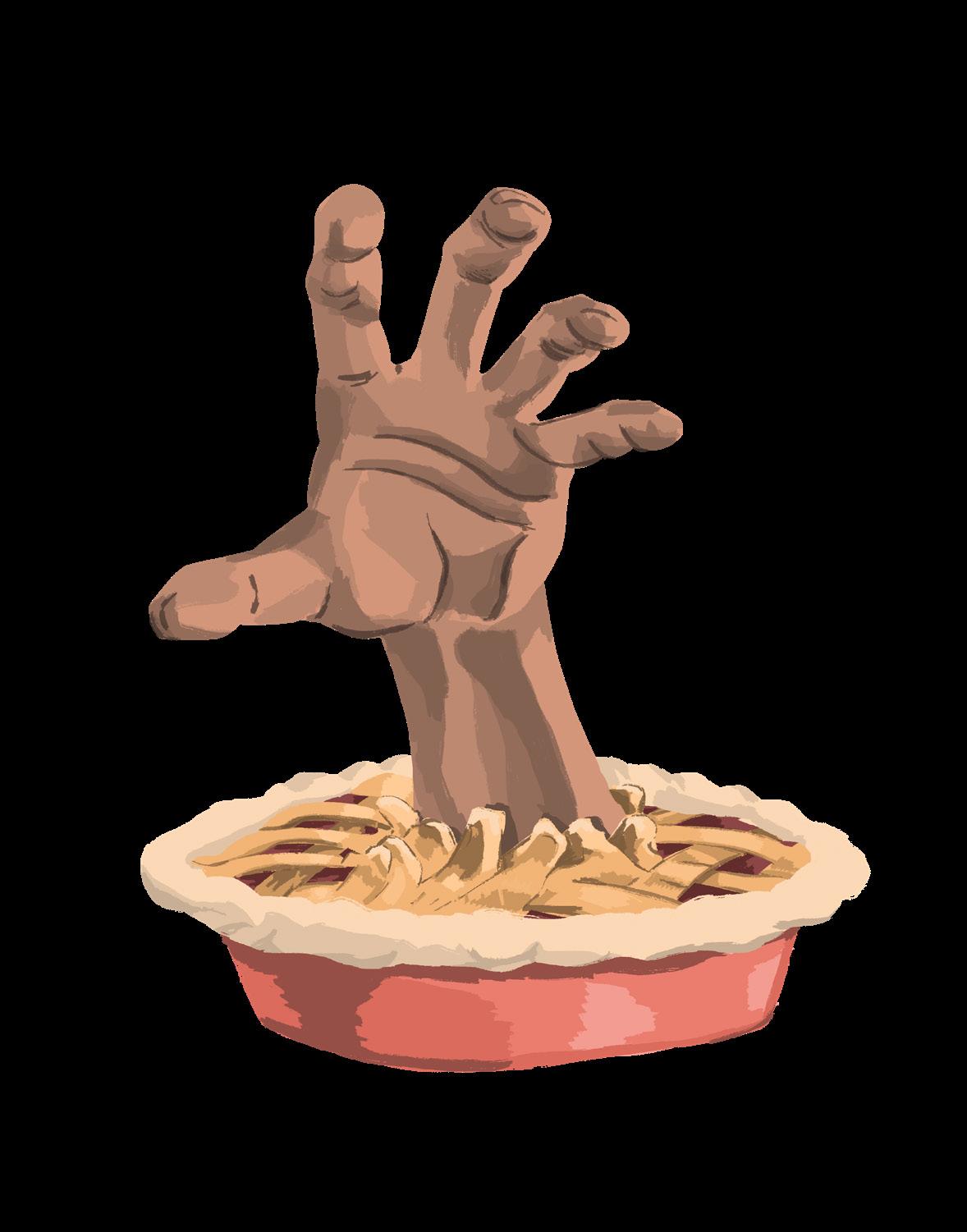
“I have been following the current Broadway revival of ‘Sweeney Todd’ since it was announced,” Fried said. “My acting class got to see the show in October when we visited New York City, and [it] was fantastic. The set was beautiful, the effects were really cool and the actors did an
Spears said she was interested in the show’s thematic exploration of human emotion and the dichotomy
“The show examines the spectrum of human emotion, and more specifically, what does it take in one’s life to tip them one way or the other,” Spears said. “Diving into this epic story about good and evil, and whether they are separated or intertwined, is such a compelling experience. The story has both horror and comedic elements, which adds to that exploration of duality since laughter and tears are not far apart in our own lives. This show is a thrill ride for the audiences, and like a good horror film, many will be left reflecting on
Cayley Tolbert-Schwartz ’24, who plays Mrs. Lovett, said she enjoys portraying a character with complex motives and with sinister actions.
“[Mrs. Lovett] is a character that is very different from a lot of the characters I usually play,” Tolbert-Schwartz said. “There’s something so twisted about her thought process, and it’s kind of fun to explore that and try to humanize that. I
The musical fea tures a Greek Chorus ensemble that narrates the story and influenc es the events. Ames said being a part of the Greek Chorus has been a reward ing experience due to its unique role.
“The ensemble in ‘Sweeney Todd’ is different from any ensemble I have been a part of,” Ames said. “We take on the roles of many different characters and mainly serve as kind of a collec tive narrator for the story. Sometimes it seems as though we are existing in the minds of the characters, sometimes we are a part of the world and sometimes we are looking at it from an outside perspective. It has been really interesting and exciting to explore as actors.”
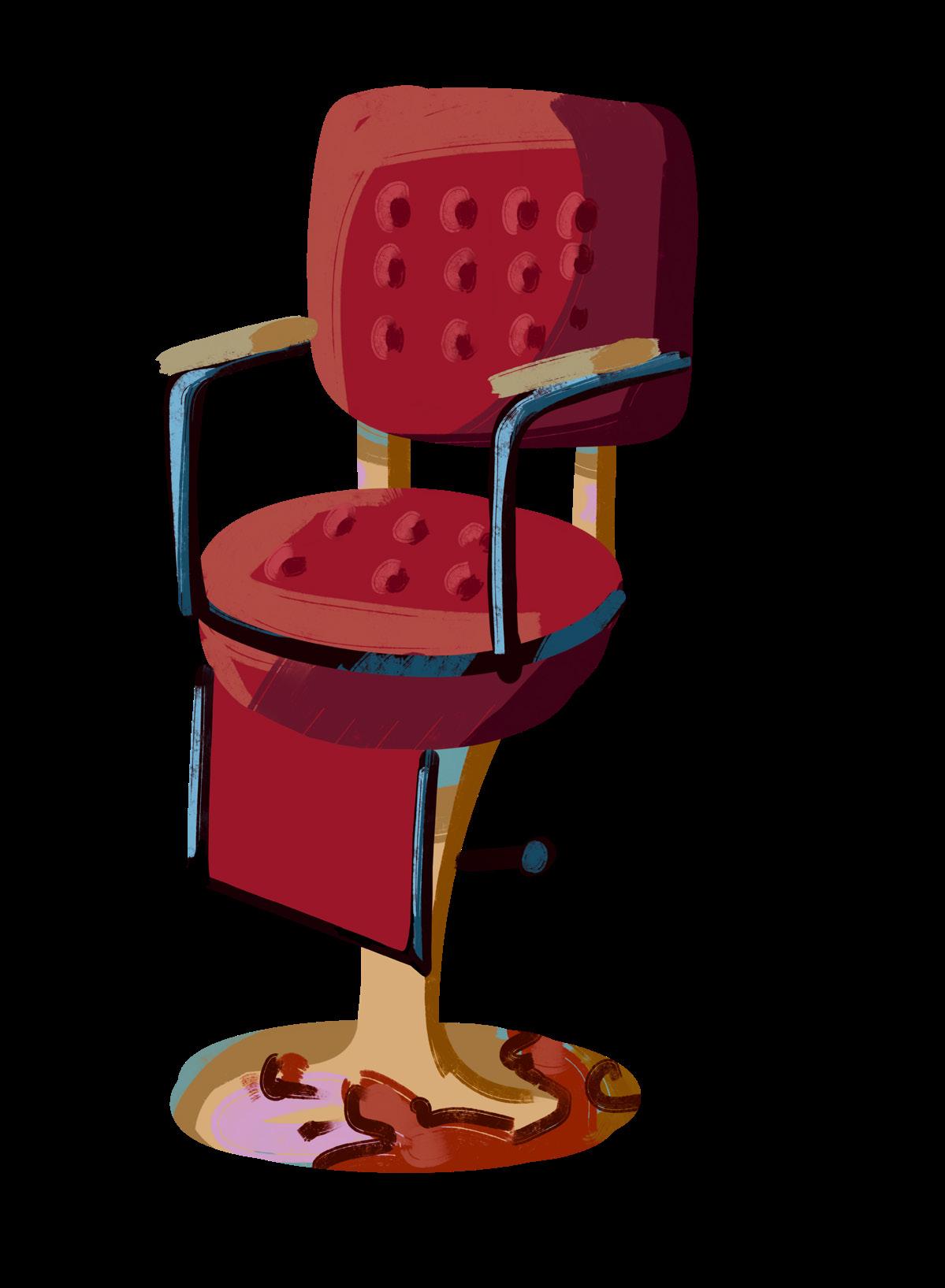
Traditionally, the Performing Arts Department stages productions as actors learn the music. However, due to the size of “Sweeney Todd,” actors spent a month learning the music before stepping on stage to learn blocking. Isaac Tiu ’24, who plays Tobias Ragg in the performance, said the show’s rehearsal timeline allowed the cast to become confident with the music before working on the additional elements.
“The rehearsal process for ‘Sweeney Todd’ has been unlike any other rehearsal process I’ve experienced because of how complex and vocally demanding this show is,”
Tiu said. “With that in mind, we spent the first month of our process just having vocal rehearsals where only the music was rehearsed. By doing that, we were able to really grasp the complex music and establish our sound as an ensemble. With a thorough month of vocal rehearsals, we were able to focus on staging the show and tackling the complex acting of scenes instead of worrying about the difficulty of the music.”
was capable of flattening and shooting actors onto a slide hidden under a trapdoor. After engineering the chair, Pugh built the multi-floor set in Rugby Theater. Spears said due to the show’s wide variety of set pieces and props, it is technically chal“The show is so complex in terms of the practical requirements,” Spears said. “There are so many different locations, and because the show is so theatrical and large, we wanted to bring those locations to life as much as possible to immerse the audience in the story. The show also requires numerous props, period costumes and plenty of blood, so it has been fun to work out all the different elements that enhance the performances of Jackson Hollis ’25, an assistant stage manager for the show, is responsible for overseeing props and maneuvering the moving set pieces. Hollis said he likes the problem-solving associated with the work
“It’s shaping up to be a real good show,” Hollis said. “It’s cool to see how each of the actors has grown [during the process], and we’ve been just adding more and more set pieces and more props over time. My favorite part [of rehearsal] is solving problems when they come up and trying to figure out ways to do complicated moves that need to happen during the show.”
Finn Slootweg ’26, a member of the Greek Chorus, said the rehearsal process has fostered a sense of community within the cast.
“It has been a really interesting process doing ‘Sweeney Todd’ as my first show at the Upper School and my first show since elementary school,” Slootweg said. “It is so cool to be a part of a show that has so many moving pieces because it’s such a collaboration between everyone in the theatre community. Doing such a big show has allowed me to really get to know everyone in the cast and form really strong friendships.
“ What stood out to me when deciding what show to produce was how big yet intimate it is.”
Michele Spears Director
An iconic component of “Sweeney Todd” is Todd’s modified barber chair, which he uses to dispose of his victims after slitting their throats, according to Playbill. Performing Arts Teacher and Master Carpenter Rees Pugh built a chair that
When I joined [the cast], I quickly felt the support and love, and I really appreciate that.”
Jasmine Sorgen ’25, who plans to attend the musical, said she is excited to see the show because she has no knowledge of what “Sweeney Todd” is about.
“I’m really looking forward to seeing my friends perform,” Sorgen said. “[‘Sweeney Todd’] is not a musical I am familiar with, so it will be exciting to experience something new. I’ve peaked my head into the theater a few times and the set looks really cool, so I think it will be cool to see how they utilize it.”
Performances of “Sweeney Todd” will be held on Feb. 8, 9, 10 and 11 in the Rugby Theater.
ILLUSTRATIONS BY EVA PARK, MEJO LIAO AND JUANA MARKMAN The Chronicle Feb. 1, 2024 C2 Arts & Entertainment
l.wood Elise Fried ’24
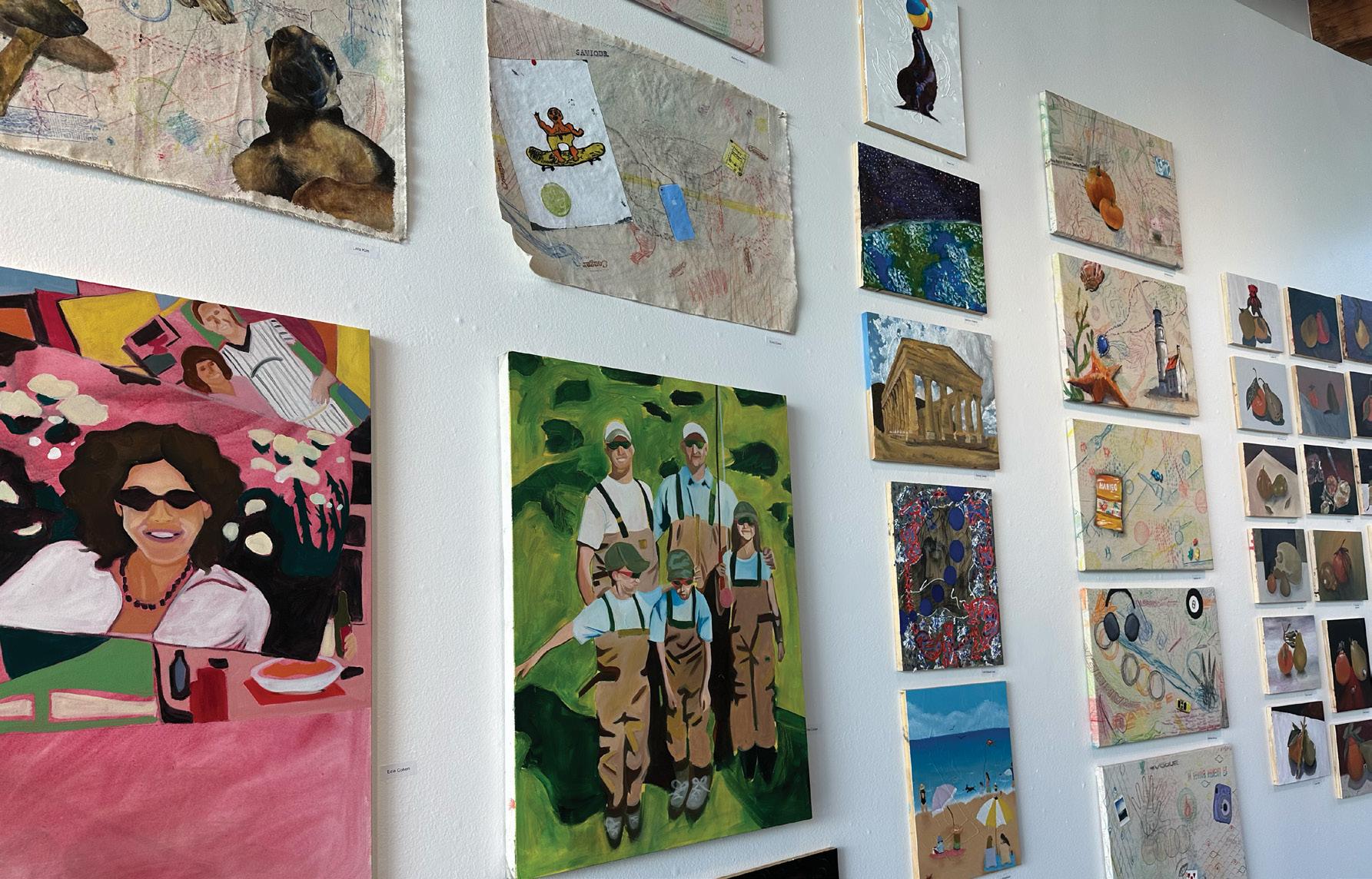
Feldman Horn Gallery displays ‘Rainbow Connection’ artwork
By Shiara Navarro
Artists from all three class levels of Drawing and Painting opened their gallery exhibition “Rainbow Connection” on Jan. 25. The show was held in the Feldman Horn Gallery and was the first of the year due to the gallery being used as a substitute library during the library's remodeling.
Charlotte Appel ’25, who takes Drawing and Painting I, said the piece she created was per sonal to her and inspired by her dad.
feel like there's a lot of talent present here, and it's good to see everything come together.”
The art exhibition featured a collaborative piece that invited all members of the school community to work together. Visual Arts teacher Conor Thompson said that this painting was meant to be an immersive experience that reached others.
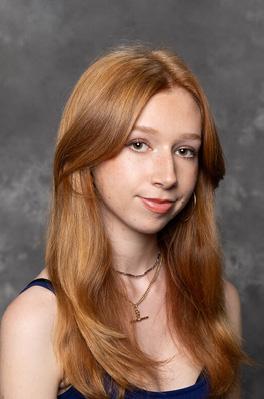
“I created a piece about tonal colors,” Appel said. “I wanted to do something dedicated to my dad. I took a lot of objects from his past and his present and meshed them together. He inspires me to do a lot of art.”
Appel said she was grateful to be featured in the show amongst her fellow student artists because of the community.
“I feel good to be a part of [the art show],” Appel said. “I
“I always love doing the giant collaborative paintings,” Thompson said. “This year we’re doing Diego Velazquez’s ‘Las Maninas.’ It’s gonna be a painting almost as performance that happens during the three-week run of the show. Everyone’s invited [to collaborate], not just Drawing and Painting students, anyone on campus can add to it.”
Thompson said that his goal with the piece was to show students that art is a collaborative process for students.
“I think it teaches our students a lesson about working in a
group,” Thompson said. “Painting doesn’t have to be this idea of this solitary genius, it can be this idea of something open-ended and communal that everyone works on. It's also just fun.”
Charcoal sketches of Kermit the Frog by students in Drawing and Painting I were featured on the wall of the gallery and were a main focal point of the show although it was originally not going to be included in the showcase.
“[The Kermit drawings are] an exercise that we do while learning tonal value and tonal rendering in Level 1,” Thompson said. “Typically we wouldn't show them in the gallery, but [Visual Arts teacher Whitney Lasker] came up with the idea of putting them all together like one giant painting. That was super fun this year.”
Caroline Riemer ’24 said that although creating the art was a long process, it was worth it.
“Making the art for me probably takes about a month for each piece,” Riemer said. “But it's been this fun process, and we're so happy to have the gallery back.”
Senior hosts photography exhibit
By William Liu
Tanya Anand ’24 presented her photography in a pop-up exhibition titled “Untouched Tableaus” on Jan. 20 in Pasadena. The gallery was open for public viewing and primarily consisted of wildlife photos. The proceeds will be donated to the Jane Goodall Institute to fund habitat conservation.
Anand said she was thrilled to display her photography to renowned artists in the field.
“Just the fact that it was my own gallery and work was exciting,” Anand said. “I got to meet some incredible photographers like people who have won Pulitzer prizes.”
Anand said she concentrated her photography on wildlife to spread awareness about environmental conservation.
“All of my photography is focused on wildlife, so quite a few are endangered species or species facing habitat loss and emissions issues,” Anand said. “It
was my way of letting everyone know what the world has to offer and why we shouldn’t be destroying it.”
Anand said a connection at the Los Angeles County Museum of Art (LACMA) helped her set up the exhibition.
“I started photography when I was 10, and I was just playing around with small digital cameras,” Anand said. “Five or six years ago, I started doing proper, professional wildlife photography, and two years ago, I met with someone working in the industry who suggested that I do an exhibition. I reached out to LACMA, and the director offered to help me get the wheels rolling.”
World Languages Teacher Margot Riemer said she enjoyed the variety of Anand's show.
“Tanya displayed a number of beautiful photos she’s taken over the years during her travels,” Riemer said. “It was well worth seeing. The vast majority of the photos were of animals, but there were also
Students perform in acting showcase
By Colin Ho
Students in the Advanced Performance Studies class this semester performed the play “Do You Feel Anger?” by Mara Nelson-Greenberg on Jan. 20 in the Drama Lab, which now serves as a new blackbox theater. The students spent their first semester working on the production and performed it as their final project for the class. The play centers around Sofia (Calla Fox ’25) who has recently been hired as an empathy coach at a debt collection agency and struggles to teach the employees about emotion and how to practice compassion for others. At her workplace, she encounters misogynistic male employees and tries to change their mindsets.
Anna Ames ’24, who played office worker Howie, said she appreciates the strong bonds she has created with her fellow actors.
“The play was so much fun,” Ames said. “We’ve spent the semester working as an ensemble and have become kind of like a little family. We have a lot of trust in each other so it makes working together really enjoyable and easy. I love them all a lot. [Performing Arts Teacher Sabrina Washburn] is also such an amazing director and she let us have a lot of creative freedom throughout the process which was really cool. ”
Ames said she struggled to draw parallels between her own life and her character’s life.
“Howie isn’t really a great guy, so I had some trouble connecting with him at first,” Ames said. “I think I was able to understand him and his actions better by thinking of him like an immature little boy. I kind of tried to channel my little brother at times.”
Isaac Tiu ’24, who played the role Old Man, said he learned how to create a deeper connection between himself and his character.
“The process [of the play] was great for me because I was able
to concentrate on just one scene, which meant that I could go into much more depth and find out what the character’s real intent was,” Tiu said. “Upon first reading [his monologue] it seemed to have little to no meaning, but after researching the irony used in this play, I found that there are significant reasons for why the character talks the way he does, and that has to do with this idea of nurture versus nature, where he was brought up in a society which significantly impacted his development as a person. For me, having this understanding of my character helped to contextualize him.”
Emma Lutsky ’26 said she enjoyed the ongoing theme of gender roles throughout the play and feels that sexism in the workplace is a prevalent issue that should have more awareness brought to it.
“I loved it,” Lutsky said. “It was so much fun to watch and the characters were so fun and overall I had a great time. I really enjoyed the motif of women [standing up for themselves] but how it's perceived in society as the woman being controlling or bossy and that they are lashing out against men, even in instances where the men are in the wrong. It was a very specific topic that I think needs to be spoken more about.”
Tiu said he spent some time researching older comedians in order to learn more about the character he played.
“Old Man was definitely a challenging character to connect with, given that he was 130 years old, and I am 18,” Tiu said. “But I tried to research other comedic skits like in Saturday Night Live and where people have played older roles to see what they had done to make [their performance] comedic [while being] realistic. I [couldn’t sound] 130 years old, so I decided to just over exaggerate how I was speaking in order to make it look like an acting choice [and develop] my character.”
four small photographs, three of Italy and one of Thailand. In a couple of them, she featured the canals of Venice, but one of them was a study of the interior of a cathedral, which was very mysterious. The photo of a lake in Thailand was a nice counterpoint to that since it was very calm.”
Eric Vartany ’24 visited the exhibition and said he found Anand’s work to be a reflection of her impressive skills.
“I feel everyone [at school] has heard of the amazing things she has done, and [she] has truly done it all,” Vartany said. “I think this moment was a chance for us to see her in action.”
In the future, Anand said she will host more showcases.
“I’ll definitely continue to do more exhibitions and shows to raise money for foundations that I care about,” Anand said. “It’s something [significant] that this was the first one, but I know I’m going to do more since this was a big success.”
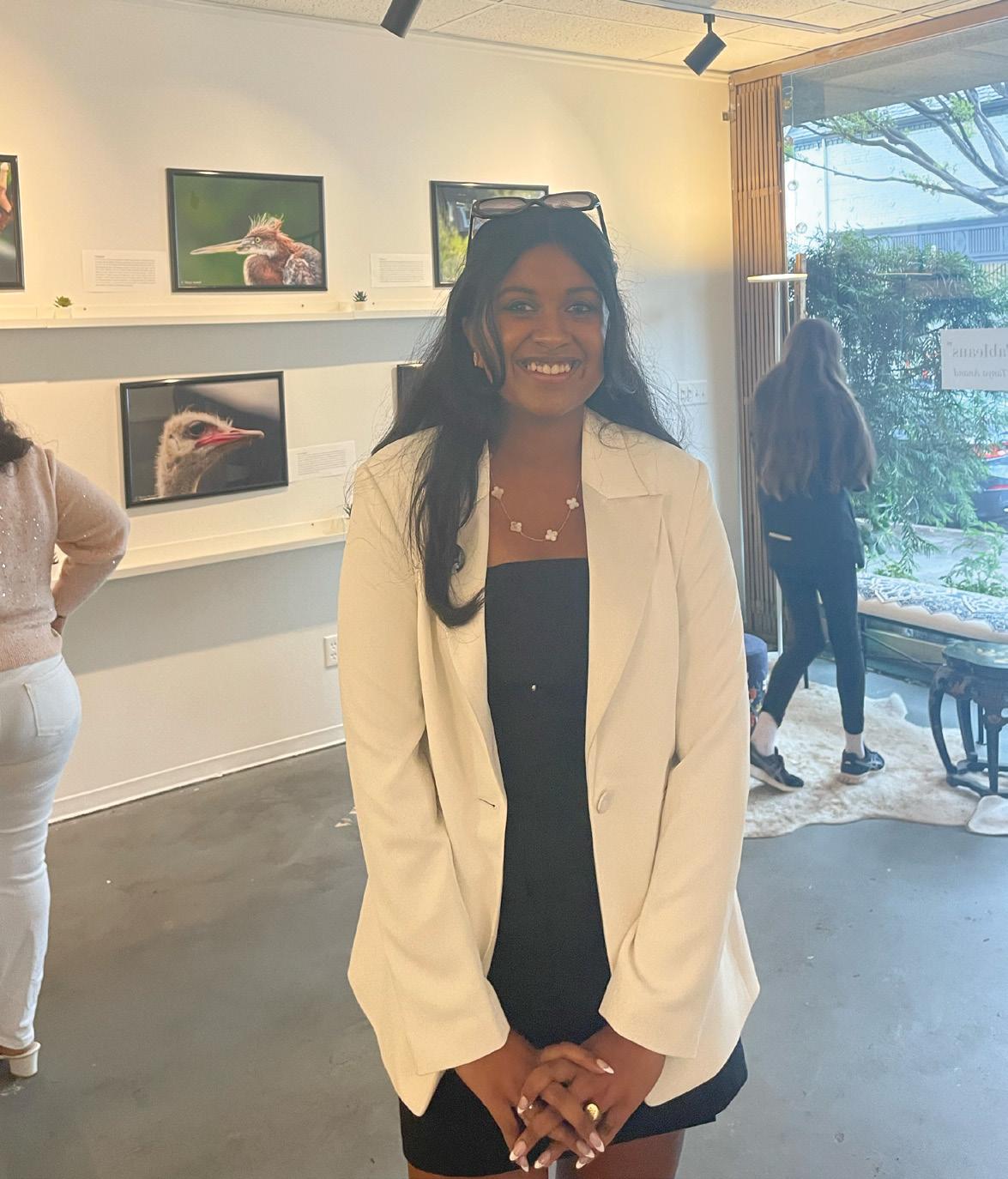
WONDERFUL WILDLIFE: Tayna Anand '24 hosts her art pop-up show titled "Untouched Tableaus," displaying her wildlife photos Jan. 20. PRINTED WITH PERMISSION OF TANYA ANAND
PAINTING PURSUITS: Students in Drawing and Painting classes I, II and Honors Senior Seminar present their art using different mediums.The showcase apeared in the Feldman-Horn Gallery during lunch Jan. 25.
hwchronicle.com/a&e Arts & Entertainment C3 Feb. 1, 2024
SHIARA NAVARRO/CHRONICLE
L. Wood Charlotte Appel ’25

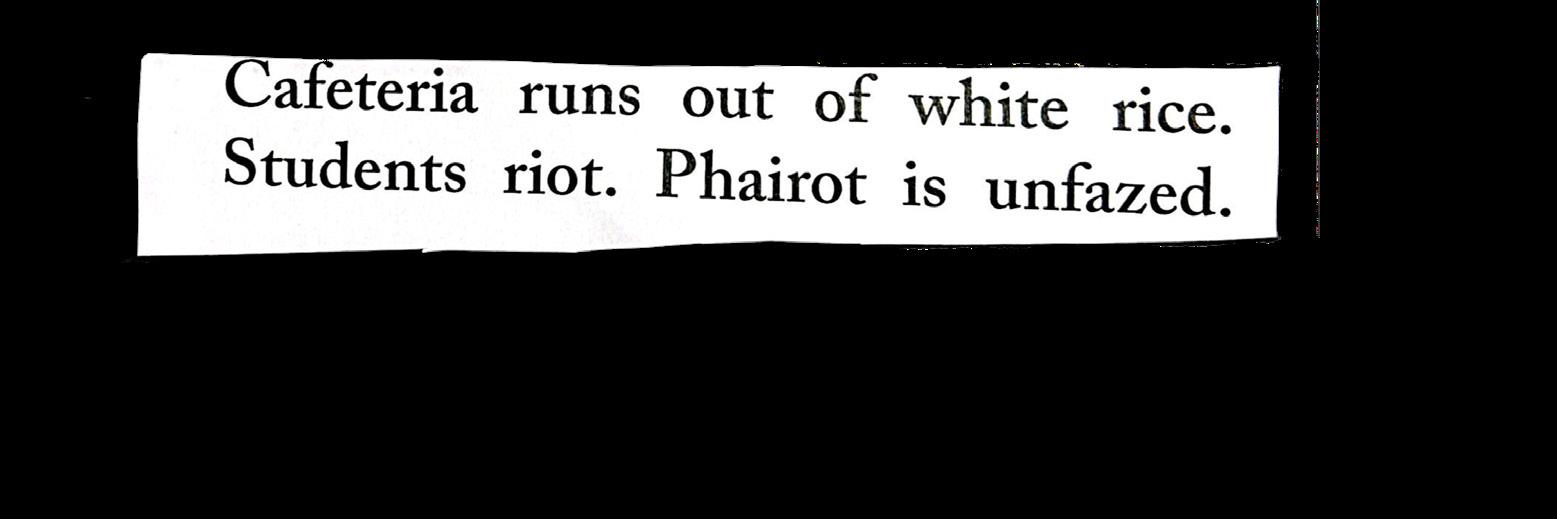

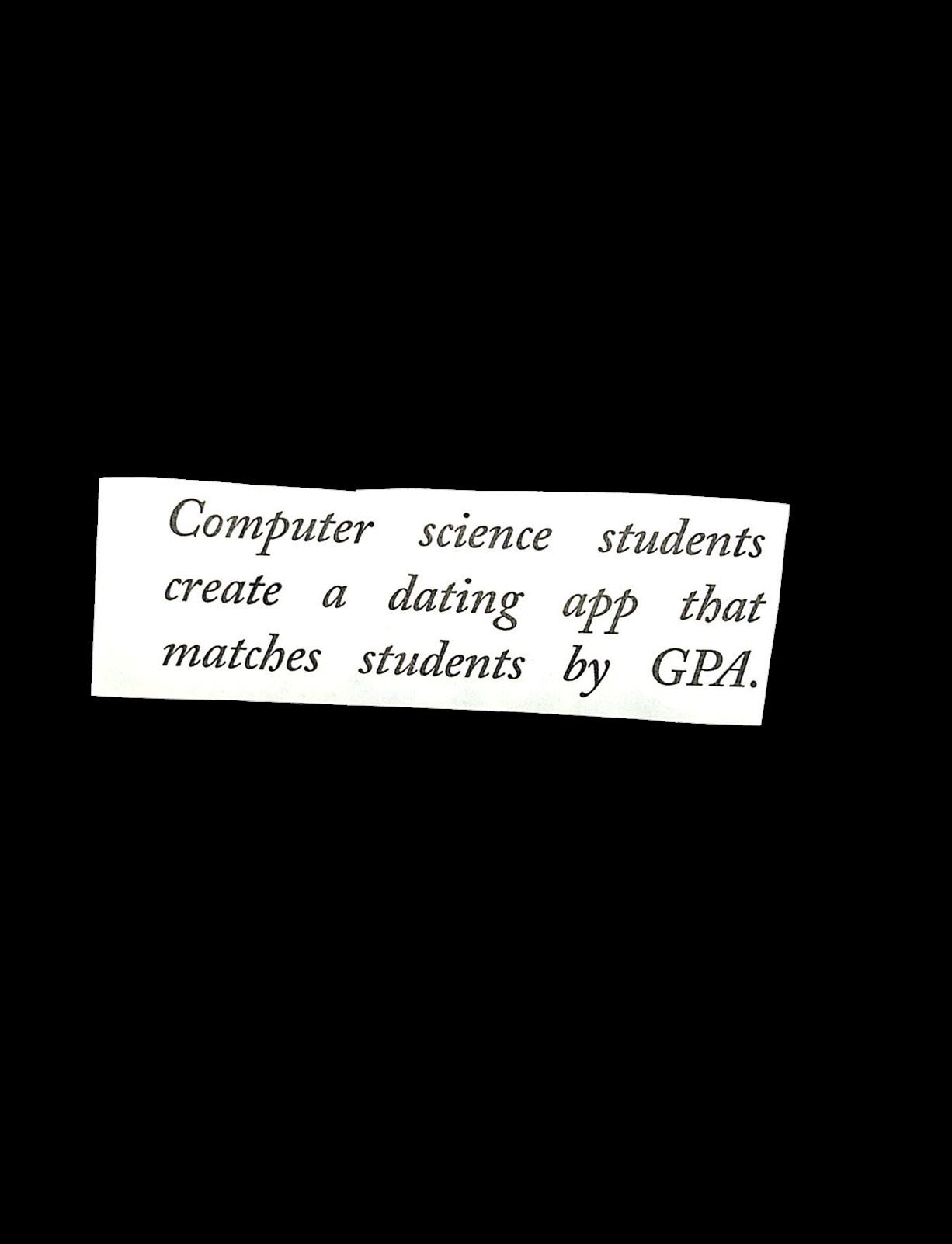


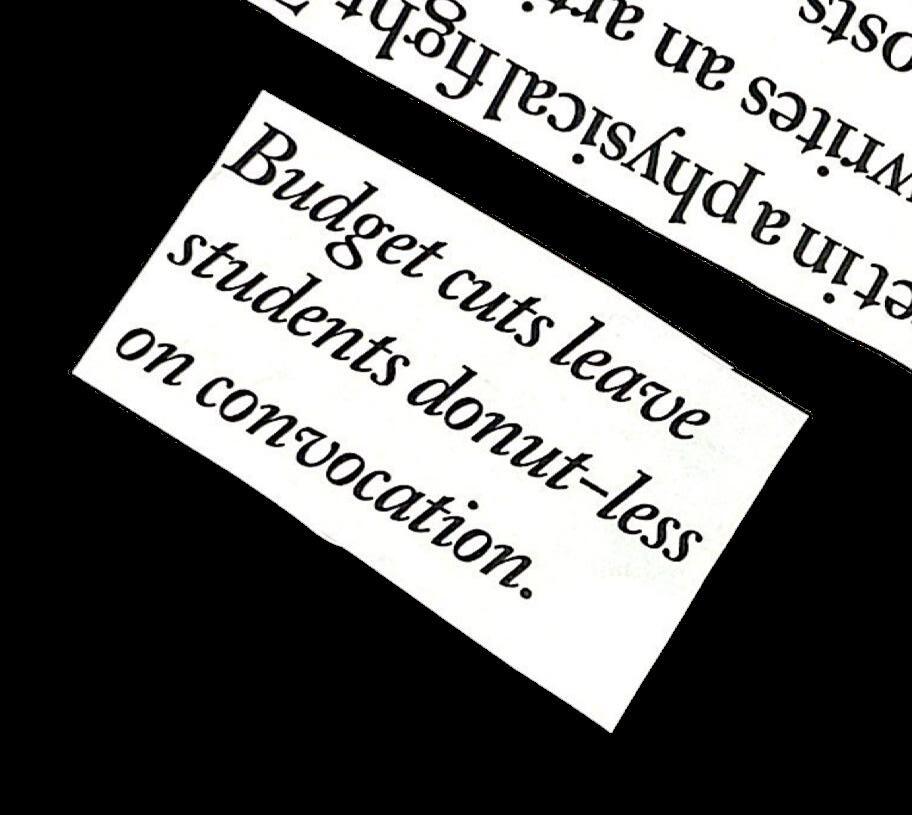
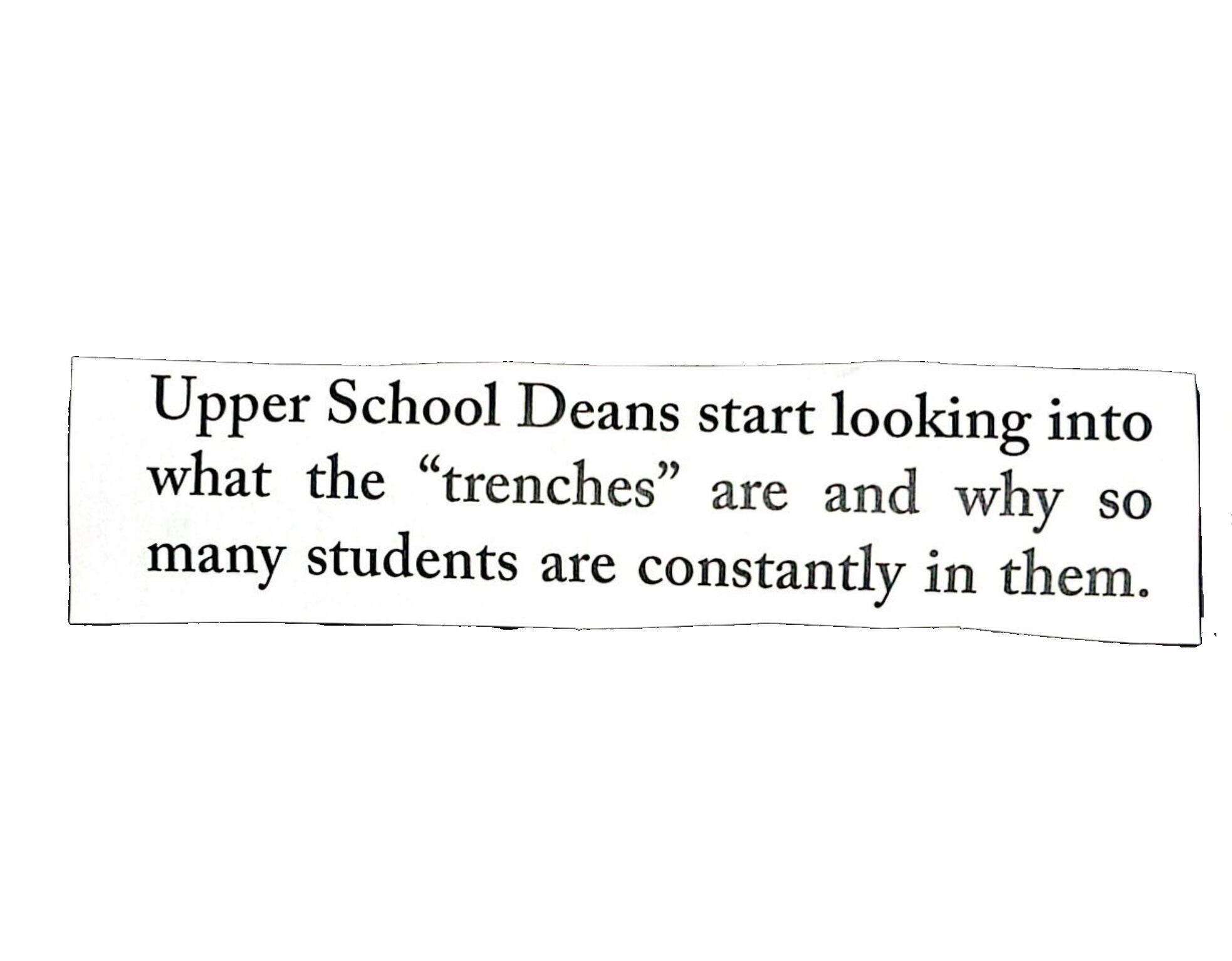
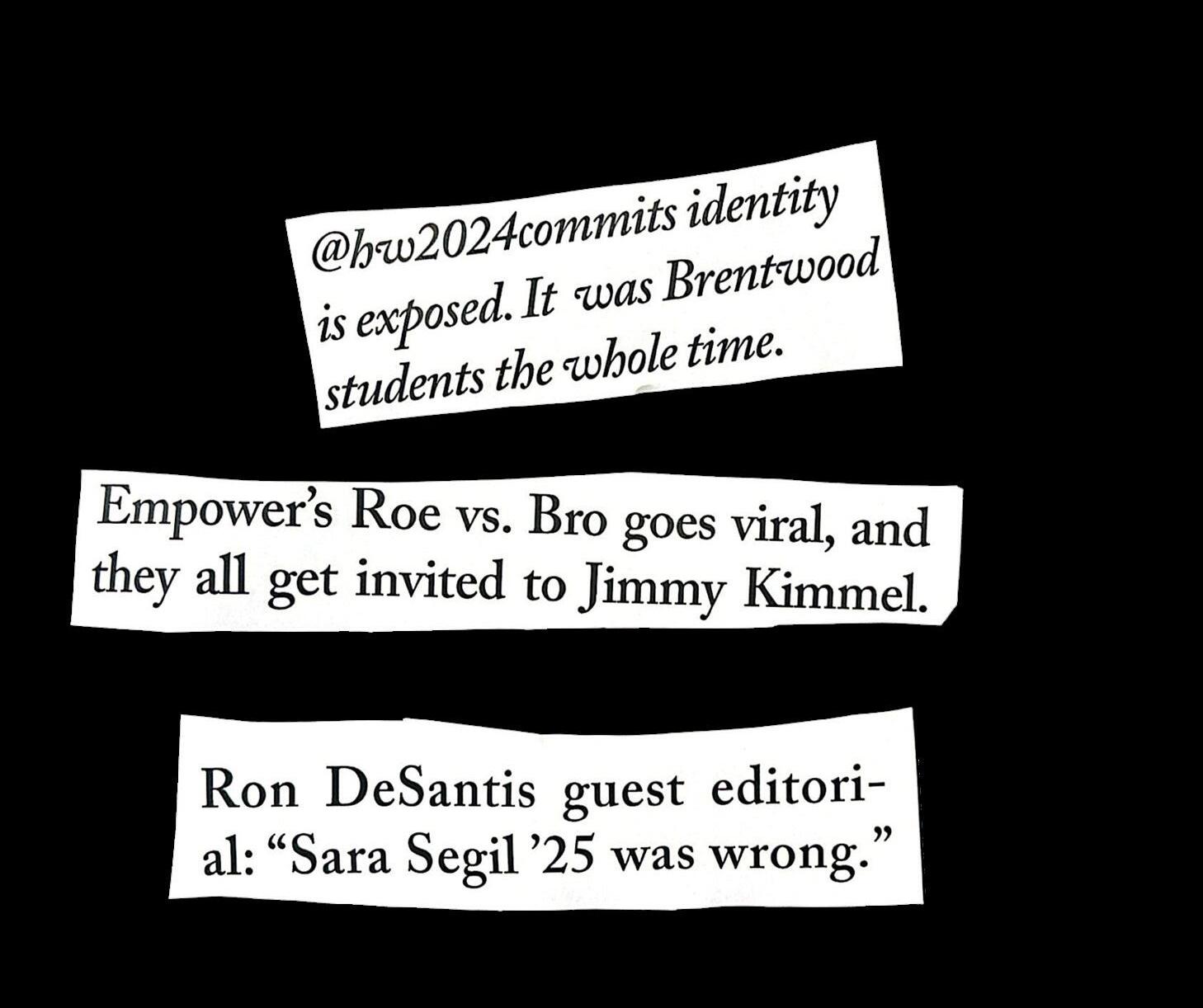

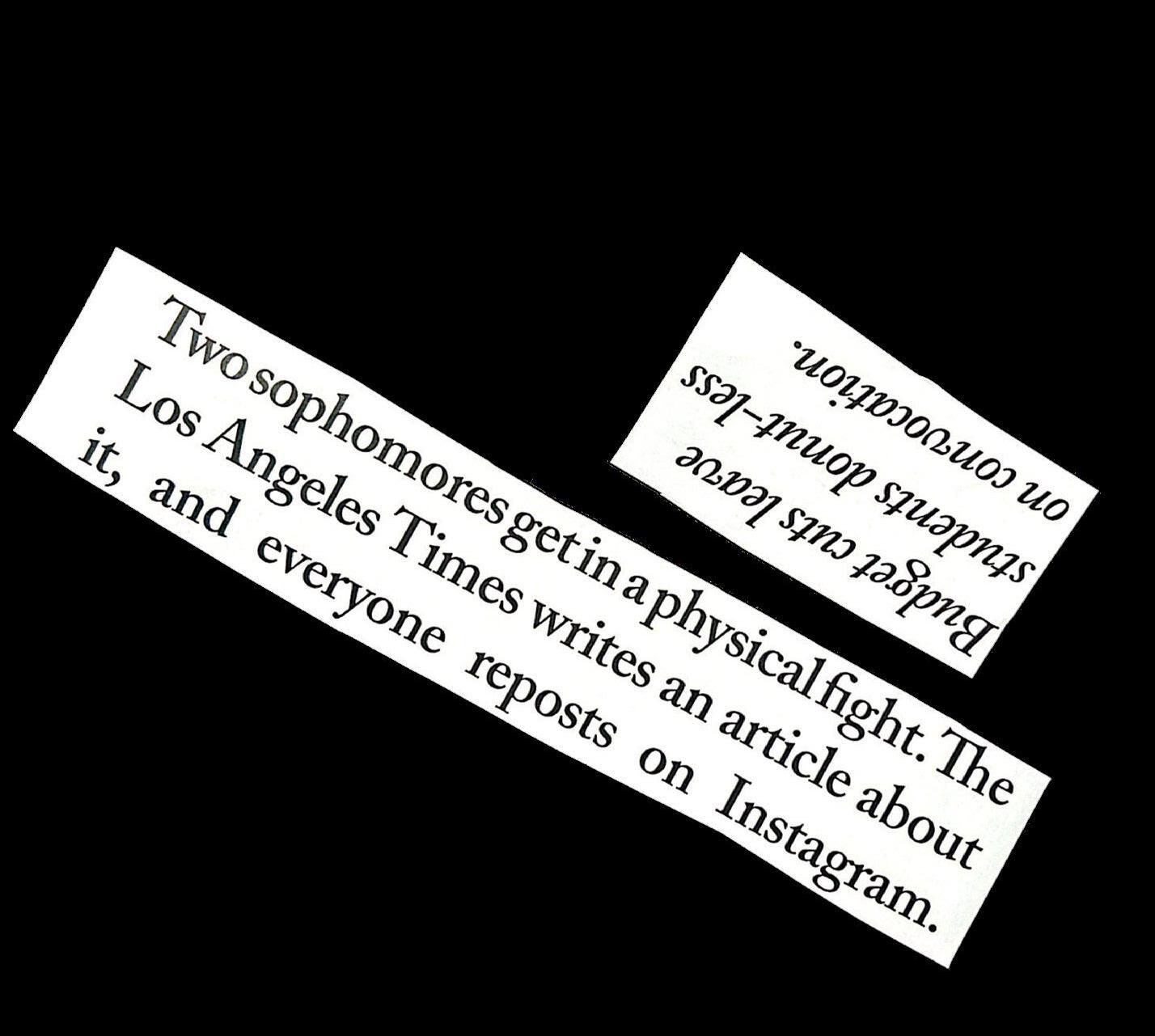
PREDICTIONS
By Hannah Shahidi
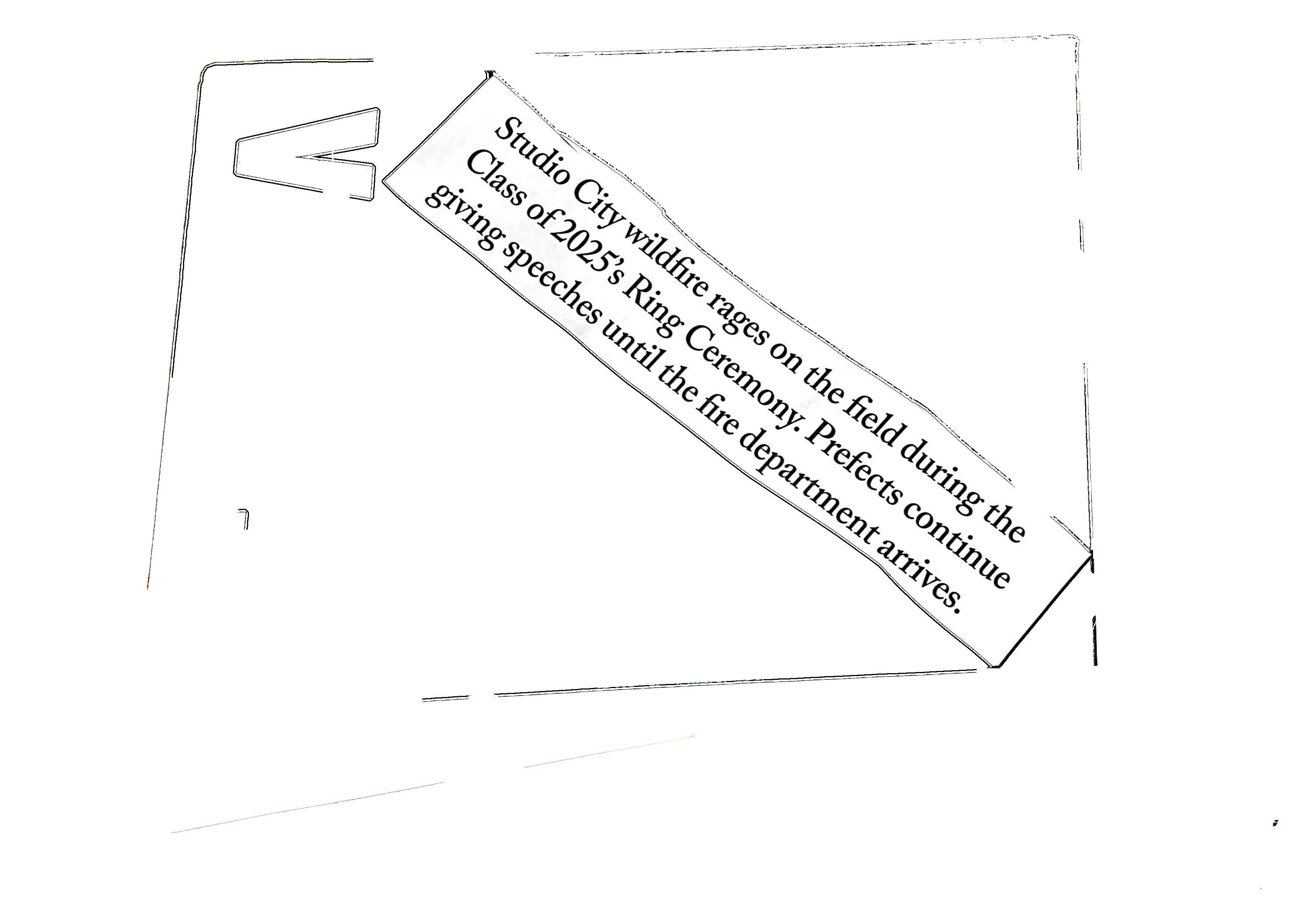
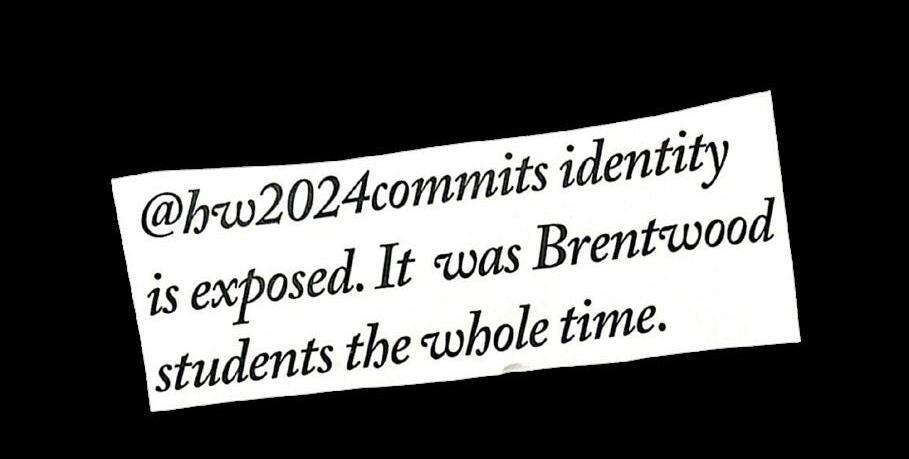

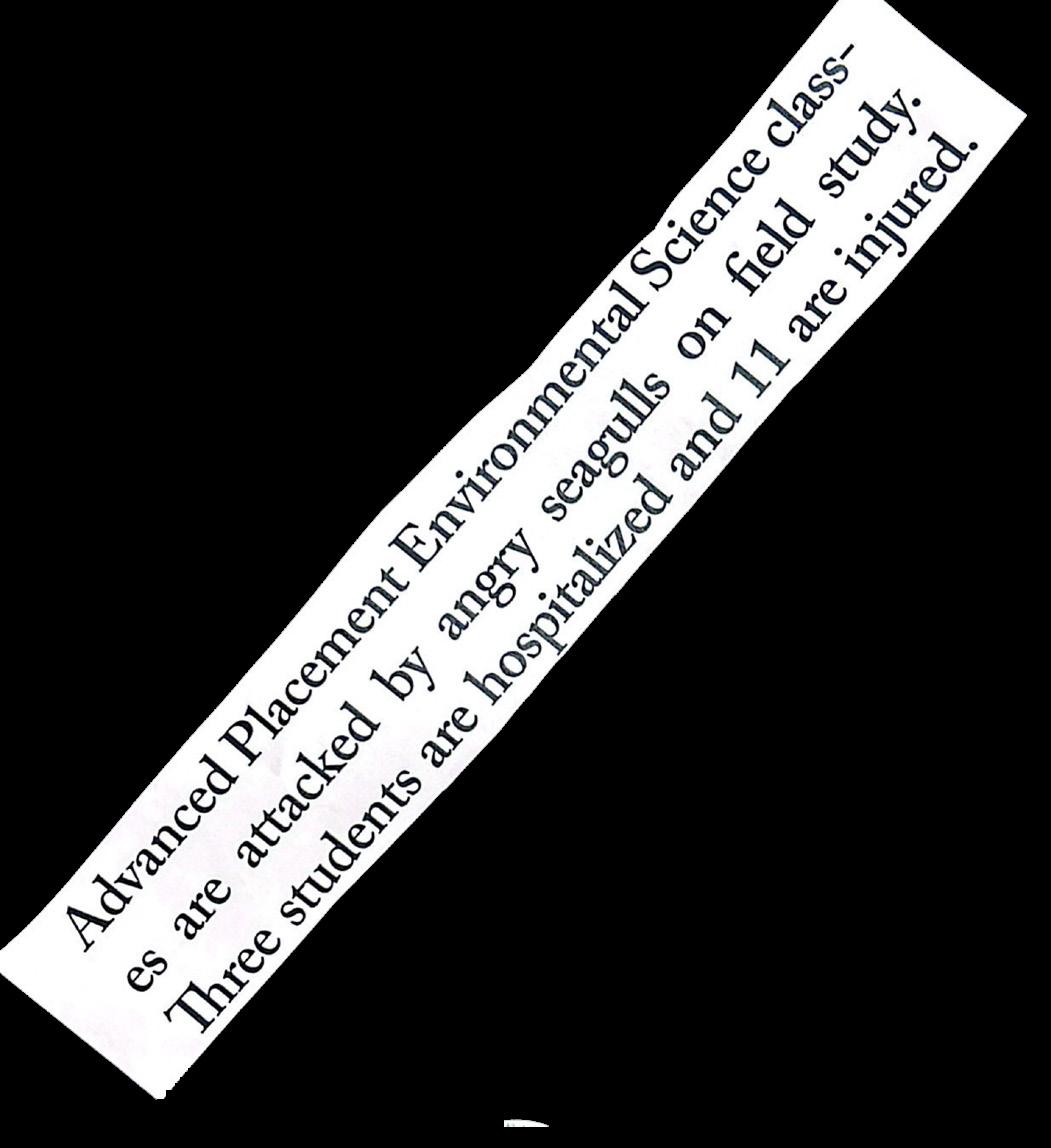
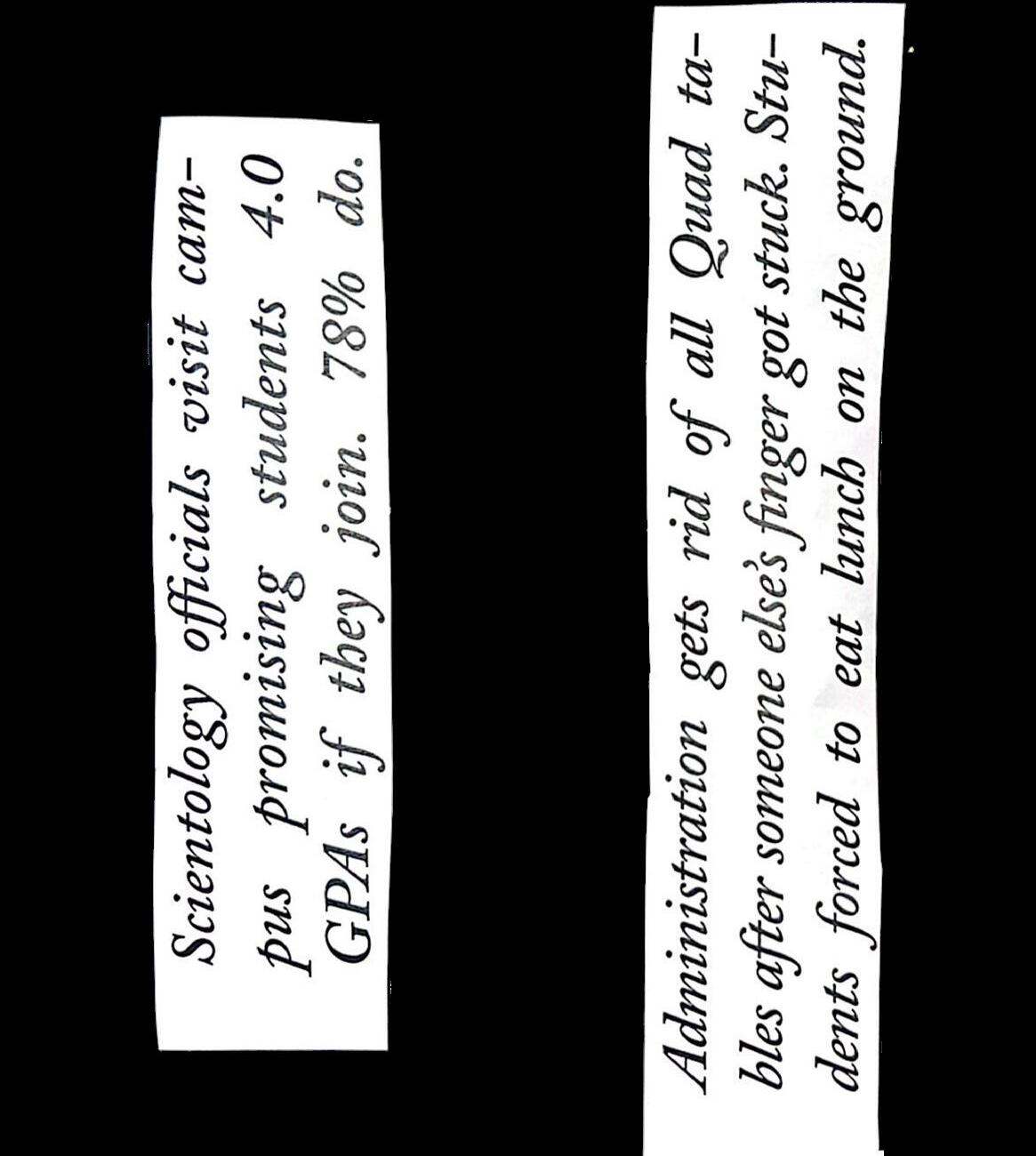
NEWS
Looking ahead to 2024 Chronicle Headlines.
BREAKING

STANDING ON
BUSINESS
BOYS’ SOCCER IS BACK FOR MORE.
Sports The Chronicle • Feb. 1, 2024
MICAH ROSSEN | WOLVERINES BASEBALL | TRENT PERRY | KAMARI Mcneely
• Continued on D2
PRINTED WITH PERMISSION OF NICOLAS MONROE

coach Erush's HAt Trick
By Justin Tang and Nathan Wang
It was boys’ soccer Program Head Michael Erush’s first day at work. Erush felt the cool spring weather on his jacket as he entered practice with the team as its new head coach. After introducing himself, Erush instructed the players on the field to do passing drills, where he analyzed their different playing styles. However, after the first practice, Erush said he knew there was a lot of work to be done with the whole group.
“I smile when I think about day one,” Erush said. “Obviously, it was during COVID, but the culture was dif ferent. Not many players, due to many different reasons, played at high-level club soccer. But again, they worked hard, and we had to create a game model based on the players we had.”
Senior defender JT Federman ’24, who was a freshman when Erush became head coach, said the team has changed signifi cantly for the better under Erush’s leadership.
“Everything was new,” Feder man said. “I was a fresh man then and even though I wasn’t close with everybody else, I could tell that the other grades of guys weren’t that close either, and it wasn’t a bonded team. We had an okay year, but it wasn’t what we wanted. Those first few seasons were important for everybody to get to know Coach Erush and see that he’s a really good coach who has a lot of talent. He deserves a lot of credit for these past couple of years.”
playoffs and is currently on the Open Division watchlist. Erush said the consistent dedication of the senior class has been a major factor in the team’s success.
“Ever since day one, this senior class three years ago really bought in,” Erush said. “Now, each one is playing at a very high level throughout the year with club soccer and Harvard-Westlake. They know what it’s like to be successful.”
Federman said the team has embraced a new mindset and shown more dedication to the game.

“It was a big culture change,” Federman said. “Especially these past two years, everybody has been really committed to accomplishing all of our goals. We set the same goals in my freshman and sophomore years, but we didn’t work as hard as we needed to actually accomplish them. These past two years, everybody’s been extremely focused and committed to winning.”
Erush said the team has emphasized a high standard of upperclassmen leadership.
especially since last year, they understood what needed to be done to help the team,” Rossen said. “[Federman] has grown a lot. He used to only send text messages, but now he speaks during team meetings. [Spencer Casamassima ’24 and Nathan Casmassima ’24] have really acclimatized to the roles of captain as well. They always keep us in check so we’re not messing around and stay focused, which is really important because we’ve never really had that on the team.”
Rossen has returned this season after suffering a tibial tubercle fracture in his knee over the summer, when he took a penalty shot in the Elite Clubs National League (ECNL) playoffs. Despite scoring the penalty to win the game, an awkward landing caused his knee to bend in the opposite direction, ultimately tearing a tendon in his knee. Rossen said his teammates supported him during his very difficult injury process over the summer.
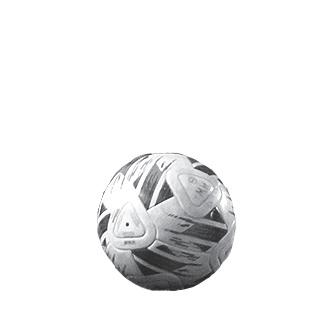
Erush and the Wolverines are currently first in the Mission League, following a historic season where the team won its first Mission League title in over two decades. The team is also predicted to be placed in Division 1 for the California Interscholastic Federation (CIF)
“For me, leadership is greater than talent,” Erush said. “The seniors lead by example, and they know what to do. The juniors still have a lot to learn, even though they think they might know ev erything. But I think for [the se niors], seeing the recent success of the program creates a little more intensity with our opponents. To continue being successful, you need to put in the work. So for the junior class for the following year, they know what it takes, and they can’t cut any corners because they’re going to be held accountable.”
Junior striker Micah Rossen ’25 said the senior captains have emphasized intensity as well as accountability for the team this season.
“Once [the seniors] started winning,
having him early in the season was a really big deal because he’s a big key to our success. Having him back is really nice,” Federman said. “He’s already scoring goals and assisting, and he’s back to his usual ways. He has a good presence on the field that I think we were missing the first couple of games of the year.”
“ Especially these past two years, everybody’s been really committed to accomplishing all of our goals.”
Earlier in the season, the team competed in the Socal College Showcase from Dec. 27 to Dec. 30, where they played against several ranked teams in the country, including Gulliver Preparatory (FL), ranked second in the country, and Servite High School, ranked 11th in California, according to MaxPreps. Although the team went 1-2 during the showcase, winger Tyler Ullrich ’24 said the games were a great opportunity for the whole team to gain much more in-game experience against highlevel competition.
JT Federman ’24
“It was a struggle,” Rossen said. “My friends were always there. Once I got back, my friends even showed up at my house. They were really supportive, and my parents were always there for me too. But, it was a struggle because I couldn’t really do anything for a while.”
Rossen has been cleared to play since the beginning of the season, where he has made an immediate impact on the team’s offense. Rossen said being able to finally play soccer has been fulfilling for him.
“It’s great,” Rossen said. “I love [playing soccer]. It’s definitely a big part of why I’m so happy now. I really looked forward to playing, and this was a big jump from before.”
Federman said having Rossen back in the lineup has been crucial for the team’s success this season.
“[Rossen] is really talented and not
“Going into the games, we were nervous a little because of how highly [the teams] were ranked,” Ullrich said. “The whole team performed very well, but unfortunately, the score didn’t go our way. There were definitely games that we could have at least tied or maybe won if we just finished our chances. For me at least, playing such good teams is more fun and enjoyable because it’s such high competition.”
Ullrich said the team looks to close out Mission League strong for a second consecutive title and that he is confident in the team’s ability to pull off a successful playoff run.
“Personally, winning Mission League is a really big goal,” Ullrich said. “We’re in a spot right now where it’s definitely doable and something that we can accomplish if we stick with it. If we let up one game, or we lose at the end of the season, we could almost lose Mission League. So, everyone has to stay focused.”
Feb. 1 2024 D2 Sports The Chronicle
WITH PERMISSION OF DARLENE BIBLE
PRINTED
Boys’ basketball back up to speed after losing two in a row
By Hana Mehdi Williams
Over Martin Luther King Day weekend, the boys’ basketball team traveled to Springfield, Massachusetts to participate for the first time in the HoopHall East Classic, which is “the most prestigious high school [basketball] event on the calendar,” according to ESPN.
The team played McEachern High School (GA) on Jan. 15, ranked 11th in the United States (U.S.), according to MaxPreps. They defeated the Indians from Georgia 60-59 in overtime, and four-star forward Nik Khamenia ’25 was named Player of the Game, finishing with 21 points, eight rebounds and two assists. Khamenia said the game was a team effort and that without his teammates, his achievement would not have been possible.
“They found me open spots [on the court], and [Coach Rebibo] put me in a lot of positions to be successful,” Khamenia said.
Two days later, the Wolverines played Notre Dame High School, a highly anticipated opponent, who they beat 8578 in double overtime last year. The team had the support of a packed school student section in Taper Gymnasium and over three thousand broadcast viewers on HWTV.
To start the game, the Wolverines came out in the first quarter with a 21-10 lead, forc-
ing multiple timeouts from Notre Dame. The Knights then took a 23-21 lead after nine straight points from four-star Houston commit Mercy Miller.
Guard Christian Horry ’24 said that the team was not playing up to their standard.
“Honestly, we weren’t playing our best basketball, especially when it came to rebounding as a team,” Horry said. “We didn’t do our job of containing [Miller] as much as we should have.”
The Wolverines were able to keep the game close, which was tied 44-44 at the end of the third. In the end, the defense could not stop Notre Dame’s Miller, who finished the game with 29 points. The Knights left with a victory, the final score being 5459. Despite the team’s loss, Horry finished with 12 points, and guard Trent Perry ’24 finished with 22 points. It would be their first loss in the Mission League in over a year, breaking a streak that lasted 18 games.
Two days after that, the Wolverines looked to redeem themselves against Sierra Canyon High School, California’s No. 5 team, Jan. 19. They kept their offense strong and held their lead up until the fourth quarter. However, with five minutes left in the fourth, senior shooting guard Justin Pippen, with the help of junior guard Bryce Cofield, led an 18-0 run against the Wolverines with six threes. The
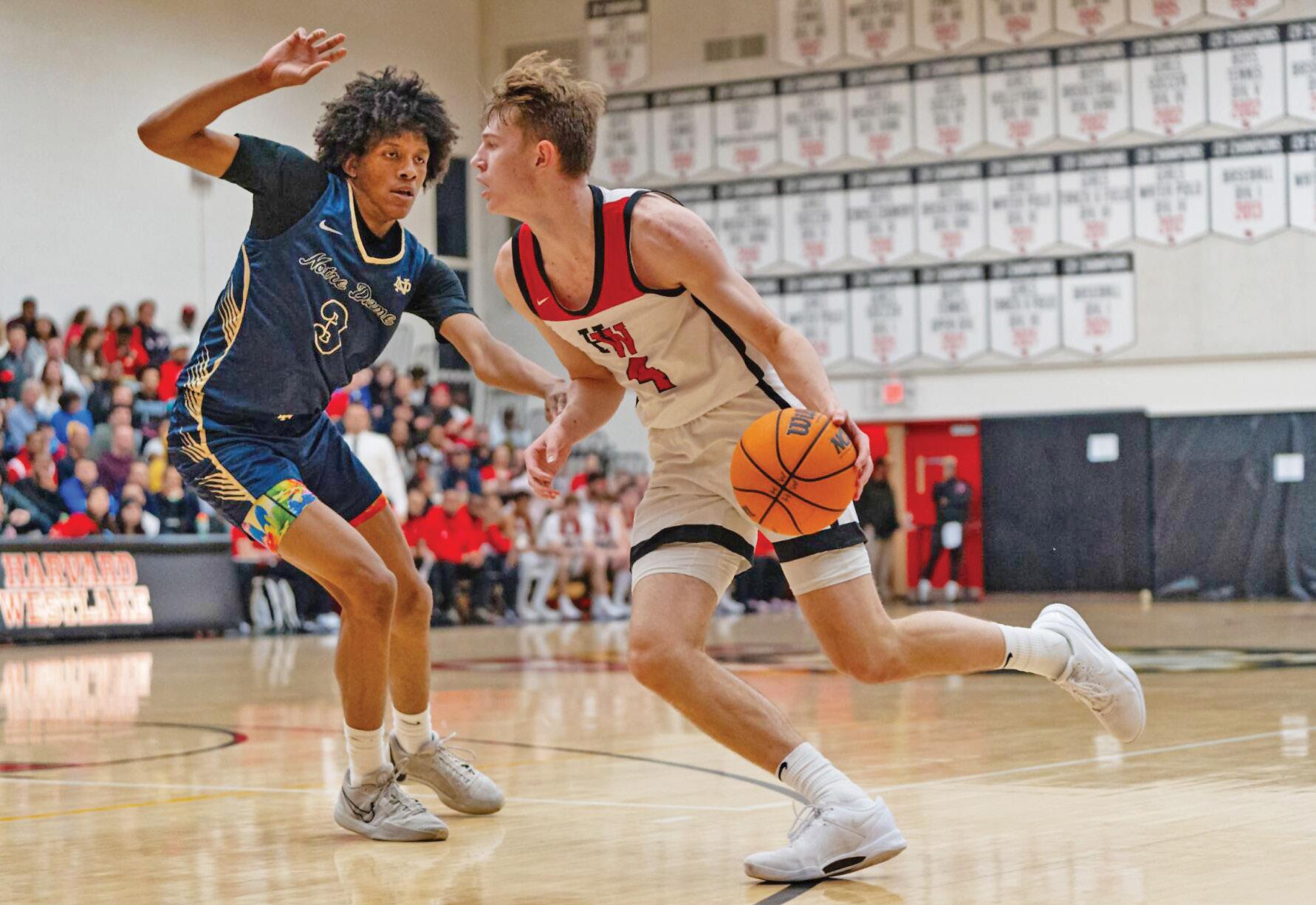
final score of the game was 6874. It would be the first time the team had lost back-to-back games since the 2021 season.
The week after, the Wolverines went on the road to play against Chaminade High School, beating them 7846 in Mission League game on Jan. 24. Then on senior night against St. Francis High School, the Wolverines beat
Wrestling cut from Mission League final, now looks for individual wins
By Sabrina Hamideh
The boys’ wrestling team has currently won two out of five dual meets in Mission League play.
In their most recent meet, they lost by one point against Bishop Alemany due to forfeiting. Since the opponent had more wrestlers in each weight class, the team lost several individual matches, which cost them many points and ultimately led to a loss.
Consequently, the team failed to qualify for Mission League finals, but certain wres-
tlers were selected to Mission League individuals.
Select wrestlers will look to return to the California Interscholastic Federation (CIF) Individuals and Masters, most notably Cutter East ’24. East secured first place in the Downey 32 Way tournament earlier this season.
Following the Mission League competition, qualifying individual wrestlers will be selected from each round to advance to CIF Individuals, Masters and then State.
Nathaniel Levin ’25 said despite the loss to Bishop Alemany,
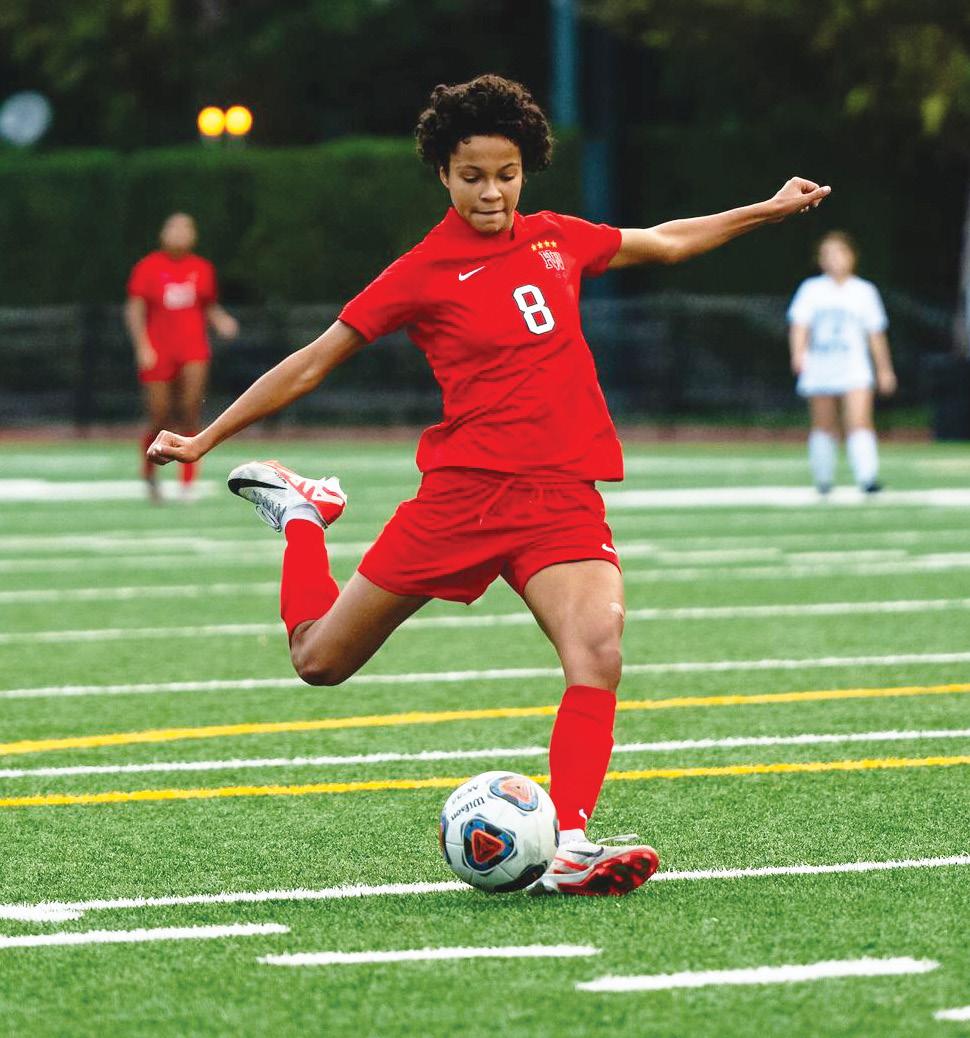
many wrestlers still performed. “We forfeited several matches in each dual meet, which led to us losing,” Levin said. “The losses hurt because we wrestled better than them and won the majority of the matches that we wrestled.”
Likewise, Henry Rutherford ’25 said the loss to Bishop Alemany was unfortunate.
“Even though I individually won, our team lost to theirs because of forfeits,” said Rutherford. “That really frustrated me because of how hard our guys have been working. It’s [good] though be-
the Golden Knights 64-33. Just a day later, the team would play in the Nike Extravaganza, an annual showcase Jan. 27. In the final game of the regular season against Foothill High School, the team put up a strong defensive performance against the Knights, pulling away with a double-digit lead in the second half. The team finished the reg-
ular season record 22-3 and a league record of 5-2.
The Mission League Tournament begins Jan. 30, where the team will play the winner of Alemany and Loyola at home. If the Wolverines win, the team will advance to play Notre Dame on the road. If they win the semifinal, they will play Sierra Canyon on the road Jan. 27.
Wrestling is a sport with the most work and the smallest material reward at the end of the tunnel. This alone makes it worth it for me.”
— Alec Avedissian ’25
cause the season isn’t over, and we will face them in the mission tournament this year.”
Alec Avedissian ’25 said he has learned to embrace the adversity of practice, and he has continued to push himself further throughout the season.
“Originally I didn’t like it,” Avedissian said. “I would feel my stomach drop on my way to prac-

tice because I was so uncomfortable, but I always found that no matter how nervous I was going into practice, I always left feeling glad that I endured it. Wrestling is a sport with the most work and the smallest material reward at the end of the tunnel. This alone makes it worth it for me.”
Individuals will be at Crespi Carmelite High School Feb. 3.
Girls’ soccer striving for playoff success
By William Liu
In their latest game, the girls’ soccer team won 2-1 against Marymount High School on Jan. 26. The team improved to an overall record of 11-4-3 and a league record of 6-1-1. As of Jan. 27, they have two remaining games against Flintridge Sacred Heart and Chaminade, teams that they have won and lost to, respectively.
This season, notable players include strikers Vicky Pugh ’25 and Kaia Santomarco-King ’26, who have led the team’s offense in scoring. Midfielders Gemma Ozturk ’25, Simone Puathasnanon ’26 and Madisyn Grant ’25, who has returned back from a longterm injury that put her out of her sophomore season, have also been crucial for the team.
Additionally, Pugh and Puathasnanon have been selected to the United States Youth Na-
tional Team (USYNT) ID center, a preliminary tryout that will determine the future of the USYNT.
Head Coach Richard Simms said he is happy with the team’s progress throughout the season.
“I’ve been very pleased with our mentality and commitment,” Simms said. “The team is battling hard in every game and competing at a high level. We have been more focused on scoring off of set pieces and doing a better job defending them.”
Defender Ashle Reese ’25 said the team has been flexible with their game schematics, experimenting with different play styles and techniques.
“We have tried different formations and putting different players in different positions in order to figure out what can work and how we can be the most successful,” Reese said. “In the future, we will most likely continue to switch things
around, so we’re not as easy of a team to guard against because we have so many different things we can do.”
Reese said the team has tried hard to regularly condition themselves for success.
“With the amount of games we have within this short amount of time, it’s really important to work hard in practice and make sure you stay game-ready,” Reese said. “It’s good to do preventative stuff like rolling out your legs and stretching regularly to be able to perform at high levels.”
Ozturk said she is particularly proud of the younger players in contributing to the team’s success.
“Our season is going well so far, we have only one loss and one tie,” Ozturk said. “We look to come out of the Mission League on top. Our underclassmen have played a huge role in our season, and I’m extremely impressed with their ability to step up.”
hwchronicle.com/sports Sports D3 Feb. 1, 2024
YOUNG TALENT: Striker Kaia Santomarco-King ’26 rears up to deliver a ball. Only in her sophomore season, she has been crucial to the team’s success.
PRINTED WITH PERMISSION OF NICOLAS MONROE
TO THE RACK: Nik Khamenia ’25 looks to drive from the left elbow to the rim in a game agsint Notre Dame. After going 1-2 against three top opponents, the team secured two victories against two other Mission League teams.
L. Wood
PRINTED WITH PERMISSION
NICOLAS MONROE
“
OF
#9
Cade Goldstein

Wolverines’ Baseball 2024 FuLL SchedulE

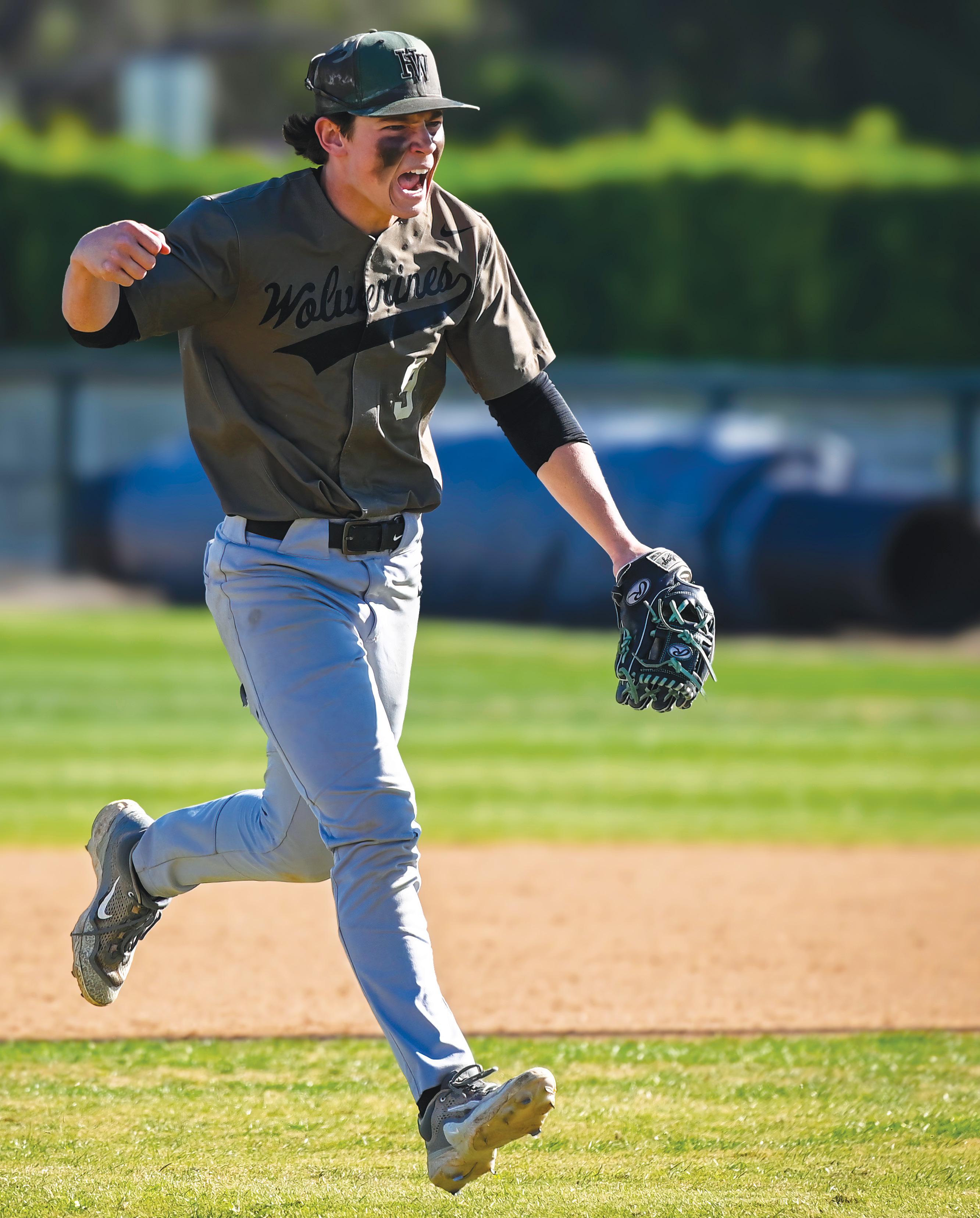

D4 Sports The Chronicle
PRINTED WITH PERMISSION OF CHARLIE GOLDSTEIN



PBR Invitational
Great Park (Irvine, CA)
Marcus High
O’Malley Family Field
Sierra Canyon
M.J. Siegel Stadium
SierrA Canyon
O’Malley Family Field
Francis
O’Malley Family Field

@ ST. Francis
March 6, 3:00 p.m.
Glendale Sports Complex

VS ST. Francis
March 8, 3:00 p.m.
O’Malley Family Field

VS Notre Dame
March 12, 3:30 p.m.
O’Malley Family Field

@ Notre Dame
March 13, 3:30 p.m.
Notre Dame High School

CreSpi
March 19, 3:30 p.m.
Hartunian Field
Crespi
March 20, 3:30 p.m.
O’Malley Family Field
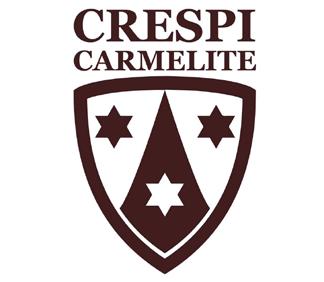
@ CreSpi
March 22, 3:30 p.m.
Hartunian Field

@ Chaminade
March 26, 3:30 p.m.
Chaminade High

VS Chaminade
March 27, 3:30 p.m.
O’Malley Family Field

@ Villa Park
April 2, 3:30 p.m.
Villa Park High School

@ Orange Lutheran
April 3, 6:00 p.m.
Orange Luthern High School

@ NHSI
April 10 -13
USA Baseball Training Complex

VS Loyola HS
April 16, 3:30 p.m.
O’Malley Family Field

@ Loyola HS
April 17, 3:30 p.m.
Hank Hernandez Field

VS Loyola HS
April 19, 3:30 p.m.
O’Malley Family Field

VS ALEMANY HS
April 23, 3:30 p.m.
O’Malley Family Field

@ ALEMANY HS
April 24, 3:30 p.m.
Alemany High School
Sports D5
Thompson returns for home game
By Connor Tang
Girls' soccer alum Alyssa Thompson ’23 returned to her alma mater before the team's match against Notre Dame High School on Jan. 24. Thompson met and took pictures with students and parents, who were able to enter a free raffle for one of her autographed United States Women's National Team (USWNT) uniforms. The girls' soccer players were sporting her jersey in warmups as a welcome nod to her visit.
Before she graduated, Thopson was the youngest player to ever be picked first overall in the National Women's Soccer League by Angel City Football Club (ACFC). While she was a student, she actively competed in the U-20 national team and was called up to play for the USWNT team. Shortly after graduating, she played in the women's World Cup over the summer in Australia.
Thompson has remained local, playing for ACFC in Los Angeles. ACFC is currently in their offseason, and Thompson is attempting to make the roster for the women's the Confederation of North, Central America and Caribbean Association Football, (CONCACAF) Gold Cup in February.
Head of Athletics Terry Barnum said he was grateful to welcome Thompson back to campus.
“Having Alyssa back has been amazing,” Barnum said. “She was an amazing athlete here, an amazing person and great for our community in the fact that she still feels so connected to us. We're just blessed to have her around.”
In the fall, ACFC also picked sister Gisele Thompson ’24, to play for the club. She signed a three-year contract and will immediately join the club after graduating. With her sister on the same team, Alyssa Thompson said she is even more thrilled to play with the upcoming 2024 National Women's Soccer League (NWSL) season in March.
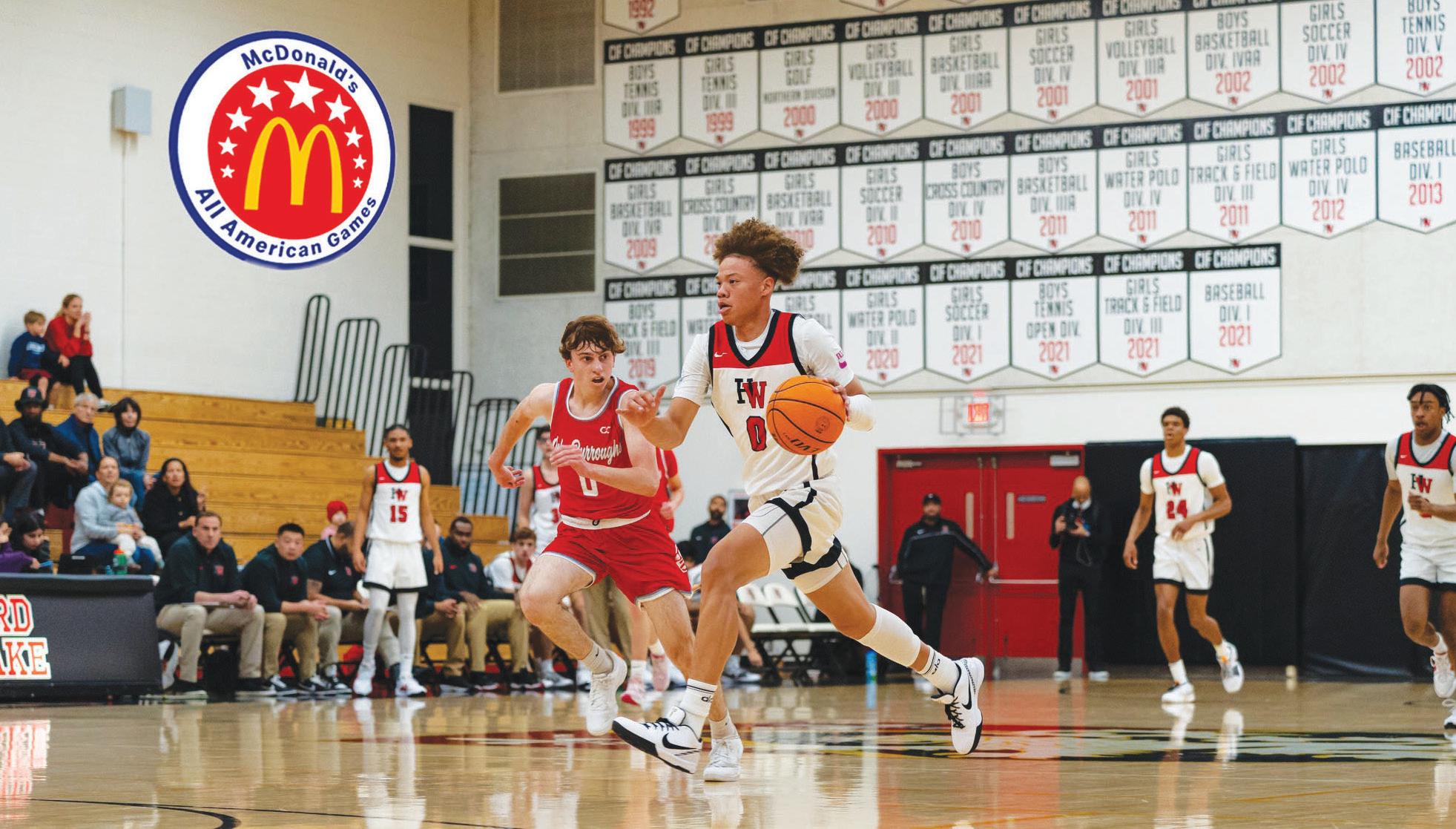
USC basketball commit selected to play on 2024 McDonald's All-American West team
By Nathan Wang
University of Southern California (USC) basketball commit Trent Perry ’24 was selected to the 2024 McDonald’s Western All-American team. The team competes in the annual McDonald's All-American Game, formatted in an East versus West competition. The 2024 All-American game will be played at the Toyota Center in Houston on April 2.
eration (CIF) State Southern California Regional Open Division Championship.
Perry said he is grateful to be part of the All-American team because many of his National Basketball Association (NBA) idols were selected as well.
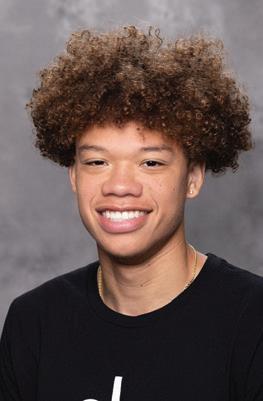
Perry is nationally ranked in the top 50 players and is the fifth-ranked point guard, according to SBLive Sports. He was named the Mission League’s most valued player (MVP) after averaging 16 points, seven rebounds and six assists per game in the same season that the boys' basketball team won the California Interscholastic Fed -
“It's an extreme honor and something that I've been dreaming about [since I was] a kid,” Perry said. “A lot of great NBA players played that game like LeBron [James], Kobe [Bryant] and Carmelo [Anthony]. It's an extreme honor just to be a part of that class.”
Head of Athletics
Terry Barnum said Perry’s selection to such a prestigious level of high school basketball reflects school pride.
“We're just so proud of him,” Barnum said. “He has represented our school in an amazing way for all six years that he's been here. I think that
Baseball prepares for new season
By Eden Conner
It is 6:45 a.m. as pitcher Tommy Bridges ’24 wakes up to the sound of his alarm and looks at his phone. The words ‘win the day’ stare back at him on his screen as he turns off the ringing sound. Reading the phrase, Bridges remembers pitching in the Wolverines' 2021 California Interscholastic Federation (CIF) Southern Section win. He remembers the group’s second round exit last year. He remembers he has a team behind him that became a true community in the offseason — one that is willing to give their all this year to win.
“The group fights,” Bridges said. “I think it all comes down to the fact that we all want it. We’re not taking a pitch off. We’re fighting through every at-bat, no matter the score. The inner fire is also coming from [Head Coach Jared Halp -
ert]. He knows what this group can accomplish. He’s setting that "fire" mentality from the top, and it’s going through the whole team.”
The team finished the 2022-2023 season 21-9. In this year's Perfect Game preseason high school rankings, the Wolverines rank seventh in the nation. Following the loss of multiple seniors, the lineup will look different with all three outfielders, both catchers and multiple pitchers being underclassmen. Middle infielder Cade Goldstein ’25 said he is happy to see how much of the team has stepped into leadership positions.
“All of the juniors and especially returning players are, as a whole, trying to lead a team of some younger guys who haven’t played a full season and haven’t had to deal with big, tough games,” Goldstein said. “The players who have been there and
[played a full season] are really stepping up and taking bigger leadership roles.”
Returning to the mound this year are two potential first round draft picks Bryce Rainer ’24 and Duncan Marsten ’24 as well as Bridges, who is committed to Texas Christian University. First baseman Miguel Villegas ’25 said in addition to the deep pitching staff, the team’s focus on smaller details will be a game-changer in the upcoming season.
“We have multiple first round picks in the senior class, and our pitching staff is also a big help because we have so much depth,” Villegas said. “More than that, though, we take pride in the little details because they are what make the difference in a very close game. The preseason was a great opportunity for us as a team to capitalize on working on our flaws and paying attention to the little things.”
that's special. This is a kid who started Harvard-Westlake in seventh grade. This wasn't some kid who came in as a transfer. He is a Harvard-Westlake kid through and through. I'm super proud of him for reaching the pinnacle of [high school basketball], which is being a McDonald's All-American.”
Selection to the All-American team requires being a well-rounded student-athlete.
Troy Perry (Trent ’24) said his son’s discipline on and off the court helped him overcome challenges and grow as an All-American player.
“When you come from Harvard-Westlake, it is not all about what you do on the court,” Troy Perry said. “It's also what you do off the court because you’re supposed to be [an] all-American. Being disciplined helped [Trent] not only keep his grades up but also helped him achieve greater things in basketball over time. I'm not saying that
[Trent] didn't have his struggles, but staying disciplined, focused and organized helped them go away.”
Trent Perry said his defining characteristic as a player on the court is his energy and positive attitude to competition.
“I never really have a serious face on the court. I’m always just smiling [and] having fun," Trent Perry said. "It just makes [playing basketball] a whole lot easier for me when I'm having fun and [when I'm] able to play with my teammates.”
Trent Perry said he is expecting to work hard and connect with other talented high school basketball players.
“I’m looking forward to being able to have a great experience,” Trent Perry said. “I'm probably going to be out [at the All-American game] for about five to seven days. [I’m excited to] bond with the other players that are with me and play well in the scrimmages and in the [All-American] game.”
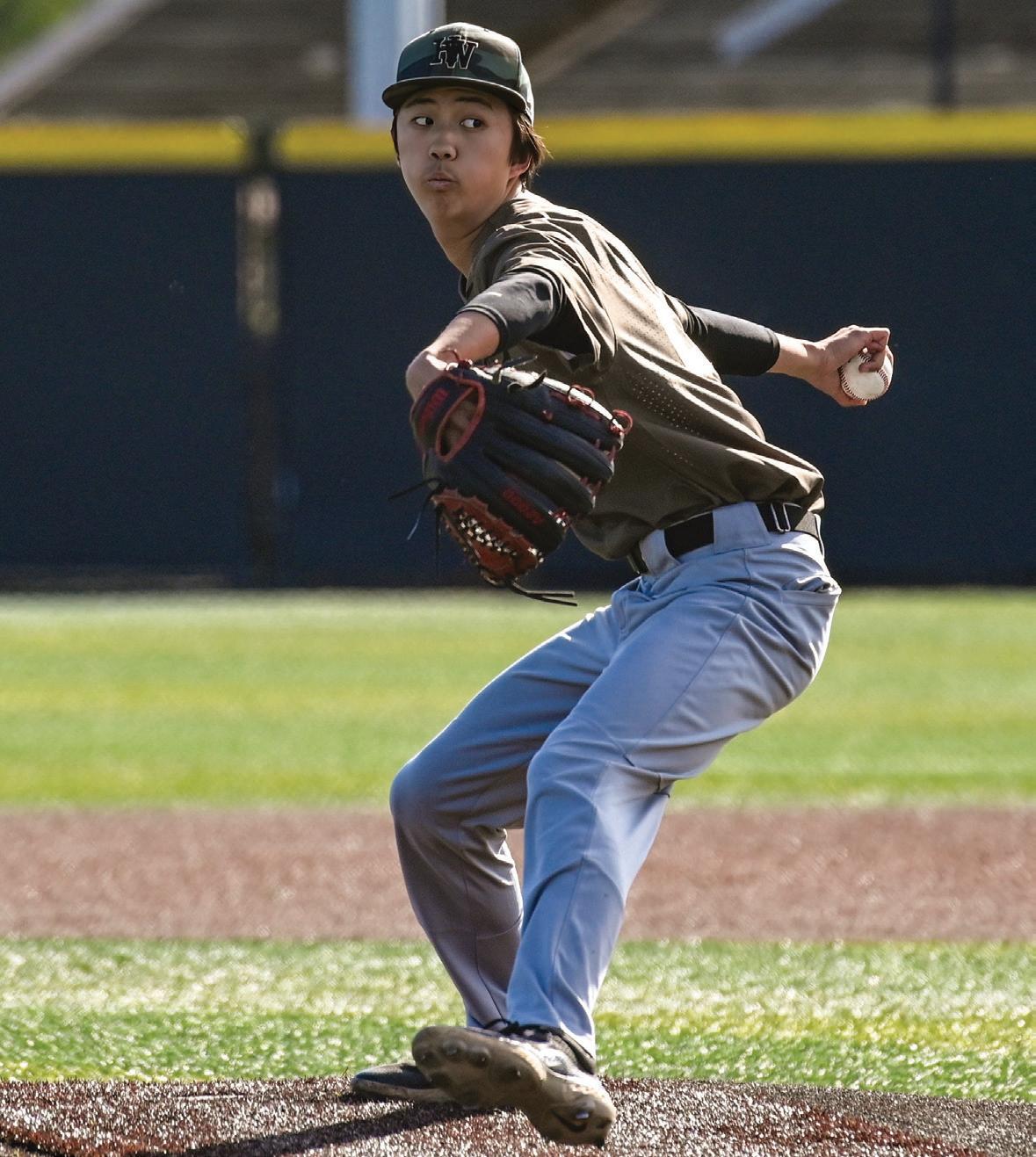
Feb. 1, 2024 D6 Sports The Chronicle
HUNGRY FOR MORE: Point guard Trent Perry ’ 24 sprints down the court. He was accepted to the 2024 annual McDonald's All-American Game which will be played in Houston on April 2. Perry is the fourth basketball player from the school to be selected for the prestigious team.
PRINTED WITH PERMISSION OF DARLENE BIBLE, ILLUSTRATION BY NATHAN WANG
PRINTED WITH PERMISSION OF CHARLIE GOLDSTEIN
L. Wood Trent Perry ’24
PITCHING WITH POWER: Sophomore pitcher Jake Chung 26 winds up on the mound. The team is looking to improve with its new leadership.
• Continued on hwchronicle.com • Continued on
hwchronicle.com
The CHRONICLE's Winter TAKES
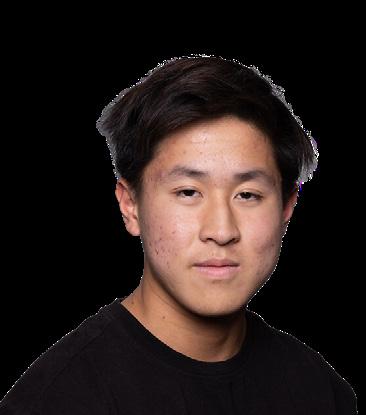

Four Chronicle staffers gave their thoughts on select winter season sports. Here are their opinions on boys ’ basketball and crucial role players on some teams.


Boys' basketball has work to do before league playoffs
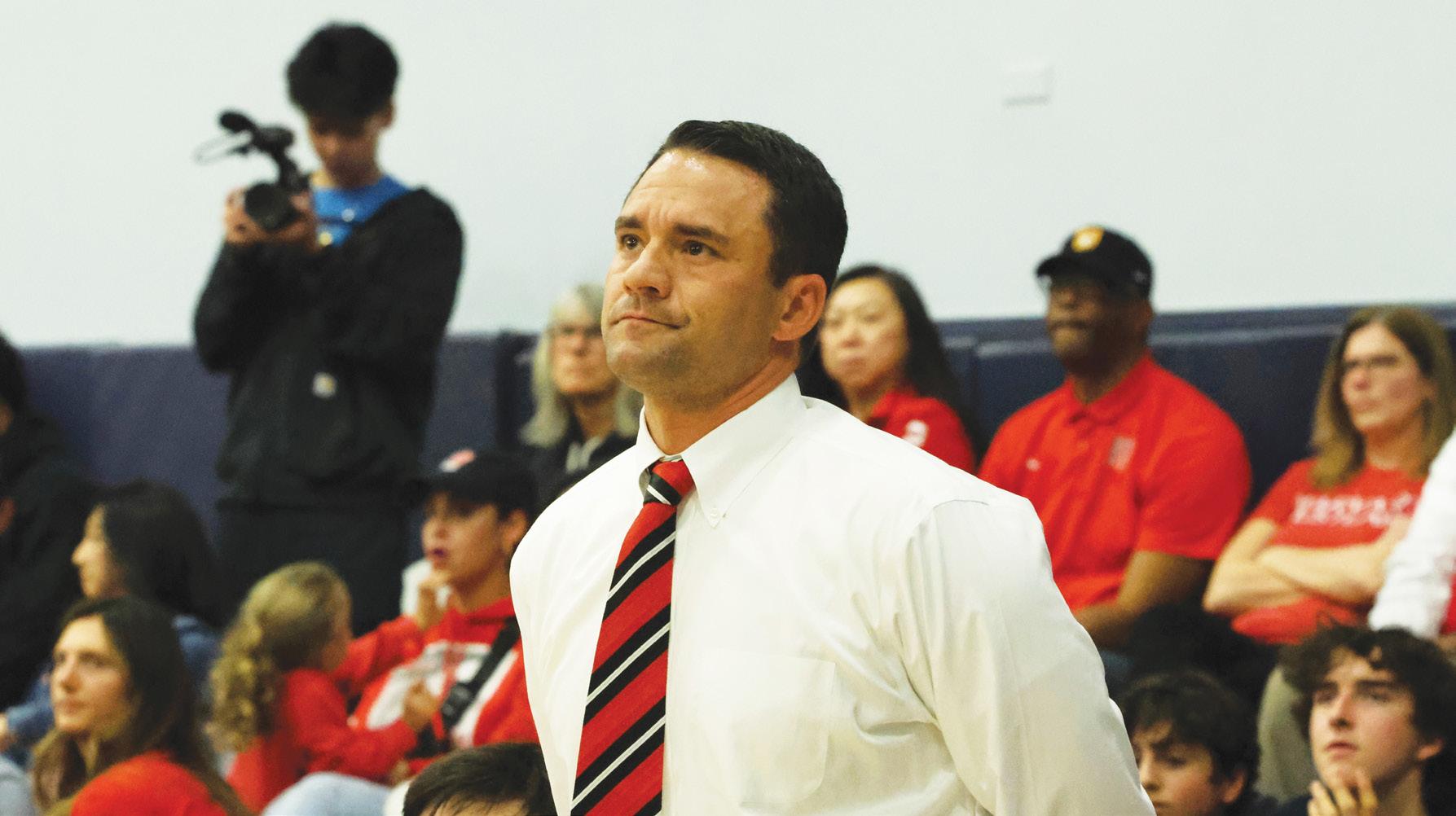
The boys' basketball team picked up back-to-back defeats in tight games against Mission League contenders Sierra Canyon and Notre Dame, both teams that they did not lose to last year. The team is now faced with a third place standing in the Mission League, and will likely have to play these teams again. Our writers discuss whether or not the losses should be a source of concern for the team moving forward.
Justin Tang
Losses are concerning
The Wolverines have not looked like the same team offensively. For the team to compete with other offensive powerhouses like Notre Dame and Sierra Canyon, the squad's big three of Trent Perry ’24, Robert Hinton ’24 and Nik Khamenia ’25 all need to deliver offensively.
Although Perry and Khamenia haven’t had trouble scoring in these games, Hinton hasn’t
looked as comfortable as he was earlier in the season, when he was easily scoring midrange and three-point opportunities.
On the defensive side, rebounding has been a major issue for the Wolverines. Head Coach David Rebibo has shown a tendency to run a small-ball, fast-paced lineup with Isaiah Carroll ’25 at the forward position for Dom Bentho ’26, but he has paid the price, losing offensive and defensive rebounds. This was apparent in their ranked matchups against Columbus School (FL) and McEachern School (GA), where missed rebounds played a major difference down the stretch for the Wolverines. Rebibo will have to decide whether he prefers the quick offense or a larger presence on the glass as the team looks to retake control of the Mission League.
Hana Mehdi Williams
Losses are not concerning
Up until mid-January, the defending state champions had our students convinced that they would once again take home the trophy. After two consecutive losses against Notre Dame and Sierra Canyon, some are concerned that Wolverines can only be a one-hit wonder.
But now is not the time to lose hope. Just two days before the Notre Dame game, the Wolverines traveled across the country and defeat McEachern High School, led by 5-star recruit Ace Bailey, who is definitely NBAbound. Two days after Notre Dame, they played Sierra Canyon. The team had little to no time to recover and practice for opposing teams. Additionally, these three games were the first truly competitive games of their season, with most of their past games as blowouts. The losses
Our picks for underrated players
Justin Tang
Athlete: Isaiah Carroll ’25
Boys' Basketball
Forward Isaiah Carroll ’25 has developed into a great sixth man option for the Wolverines. Standing at 6’6 ”, Carroll has been a strong defensive presence for the team when in the game and has also shown an ability to shoot the ball with confidence. Carroll has developed an impressive level of awareness in his first year on the varsity team and has learned the Wolverines’ offensive and defensive schemes quickly. The only thing for him to improve on, however, is his defensive strength and rebounding. He has some struggles with boxing out stronger opponents. Going into CIF playoffs and next year, expect Carroll to become an essential part of this Wolverines squad.
Hana Mehdi Williams
Athlete: Deana Thompson ’25
Girls' Basketball
The girls’ basketball team is often overshadowed by the boys’ basketball program. Nevertheless, their players are equally as impressive, specifically, guard Deana Thompson ’25. The Wolverines played Notre Dame, and Thompson hit the 1000th point of her career Jan. 25. In doing so, she has cemented herself as one of the most skilled girls basketball players to ever go through the program. Despite only being a junior, Thompson has joined Trent Perry ’24 in elite standing, who also hit the 1000-point mark this year. She has been an all-star her entire career. In her freshman year, she was the only freshman on the team selected to first Team Mission League and was top three in scoring amongst freshmen in the CIF Southern
Section Division 1. Thompson is a superstar in the making and deserves all the praise and more.
Alex Dinh
Athlete: Stella Jurado ’27
Girls' Soccer
Defender Stella Jurado ’27, standing at 4’11”, is flying under the radar, but don't be mistaken — she has been a key contributor for the girls’ soccer team in her first season. After starting the season on the junior varsity (JV) team, Jurado is now a starting midfielder, making plays on both the offensive and defensive ends. In a league match against Flintridge Sacred Heart on Jan. 10, Jurado made her presence known with her first-ever high school goal. Forward number 22 Skyla Wilkins ’25 sent a cross into the box, and Jurado, who was wearing the number 22 JV jersey with a piece of tape over
aren't a sign of failure, but a dire wake-up call for the team. If the team can watch enough film to recover their mistakes and begin finding their strides in practice to build back confidence, future games against these teams are going to look very different. Rebibo and the Wolverines have shown their ability to bounce back before, and they are without a doubt able to do it again.
Alex Dinh
Losses are concerning
After dropping two straight league games to Notre Dame and Sierra Canyon, there are some clear problems that Rebibo and the squad are going to need to get fixed before the end of the season.
The problems for the team start with the holes left by graduating seniors last year. Although the loss of Brady Dunlap ’23 was vital, it is the loss of 6’11” Jacob Huggins ’23 that truly affected the team. Bentho and Barron Linnekens ’26 have showed splashes of greatness as bigs in their sophomore season, however, they don't provide the squad with the same stability that Huggins did.
In addition, the team has been too prone to losing their large leads. Against McEachern, the team was up by 18 but was forced to pull off a win in overtime. Against Notre Dame, the team got out to an 11 point lead in the first six minutes but ended up losing the game 59-54. Against Sierra Canyon, the Wolverines led 58-50 early in the fourth quarter until they blew the lead. This all happened in one week. The Wolverines can fix these issues, but they must be
addressed before playoffs.
Connor Tang
Losses are not concerning
There's no doubt that the losses are surprising. Although at first glance, the two losses looked like bitter defeats, the team actually showcased their strongest performances. Against one of the most explosive and energetic teams they have played, Notre Dame, the Wolverines came out blazing with a clear 21-10 point lead. In a back-and-forth game against a star-studded and new-looking Sierra Canyon team, they went on a dominant run to take an eight point lead with almost five minutes left, demonstrating control and poise in a hostile environment. The win-loss record doesn’t accurately display this team’s strengths and weaknesses. They have struggled in critical minutes, which can be easily prevented with adjustments to game prep and leaders to step up and say, “look, we're good.”
Because we know Khamenia and Hinton can find the mid-range. We know Perry can get to the free throw line. We know Christian Horry ’24 can knock down shots from behind the arc. But this can only come with confidence. When faced with ranked opponents full of four and five star recruits, the team needs to continue playing the way they do in practice and in dominant games.
The naysayers and other teams shouldn’t dictate how confident they play. Only the team should. Rebibo lost games to Liberty (NV) and St. John Bosco last year, but remember how it ended.

the second two, headed the ball in. Jurado has now been given her spot on varsity, and the new number 28 is a vital piece of the team’s young core of players.
No one appreciates the secret behind the success of the boys’ soccer offense. A squad needs crucial midfielders, who are able to skillfully receive and thread
passes, and not allow turnovers to feed into another team's offense. Race Serota ’25 is a premier example of such — he's an outstanding ball handler, who is physical with his opponents, yet outmaneuvers them to get the ball to the offense. He knows how to quickly find seams to get the ball down to the corners, which allows for scoring opportunities. Just this season, Serota has already done an excellent job with the team, and he will only improve.
hwchronicle.com/sports Sports D7 Feb. 1, 2024
Justin Tang Assistant Sports Editor Boys' Basketball Reporter
Alex Dinh Sports Section Contributor
Hana Mehdi Williams Sports Section Contributor
Connor Tang Sports Section Contributor
Connor Tang Athlete: Race Serota ’25 Boys' Soccer
CONNOR TANG/CHRONICLE
PRINTED WITH PERMISSION OF NICOLAS MONROE
BY KAMARI MCNEELY
For all my life, I’ve been surrounded by sports. I began playing basketball when I was three years old. I remember sitting on the bleachers while my dad played basketball and feeling pointy blades of grass against my skin and dirt under my fingernails as I watched my sister’s soccer games. Countless weekends have been devoted to traveling to various locations for my sports, waking up early for 8 a.m. matches or doing homework on the way to practice.
Despite still playing soccer, I knew basketball was the sport I was going to play in high school. So, when I came to the school, I was really excited when I got called up to varsity. My first year was a blur. COVID-19 protocols kept us distanced, making it hard to connect with my teammates. Sophomore year was probably the most memorable year because it was the hardest. School officially opened back up, and I was bombarded with so many readings and homework. I had basketball practices and lifts five times a week. On top of that, I started club soccer again. So, while I was trying to acclimate to the Upper School, I was running from one practice to the other. I was stretching myself too thin, and I felt like there wasn’t a single instance in which everything was going great. If I was doing well in school, I wasn’t doing well in basketball. If I put more effort into basketball, my grades would slip. If I didn’t go to my soccer practices, I wasn't a starter. These things
constantly ran through my mind, and I felt even more stressed and overwhelmed.
I remember when I met with [Sports Psychologist] Kat Scardino before one of our league games. I expressed how nervous I was. There were so many what-ifs swirling through my head that it was hard to calm down. I remember that Kat told me to, “focus on what you can control.” I can't control my playing time, the referees or my coach. What I can control is my defense, effort and attitude. When I focus on the things I can control, not only do I keep myself present but I also keep the self-doubt away. I think that was one of the most important pieces of advice I’ve ever received and still apply today.
When basketball season finally came to an end, I was so relieved. I was in desperate need of a break, and I finally had it. During the offseason, I began club soccer again in the spring. With my soccer team, I rediscovered the confidence and support I desperately craved on the basketball court. That year, we won our regional league, [won the] National Cup and got the opportunity to play at the Far West Regionals Championships. Because of my success at soccer, I thought that I should continue pursuing it. I had lost confidence, motivation and love for basketball, so why not? I remember telling my coach that I was considering quitting, and she told me that she really wanted me to be part of the team, but ultimately, it was best to do what

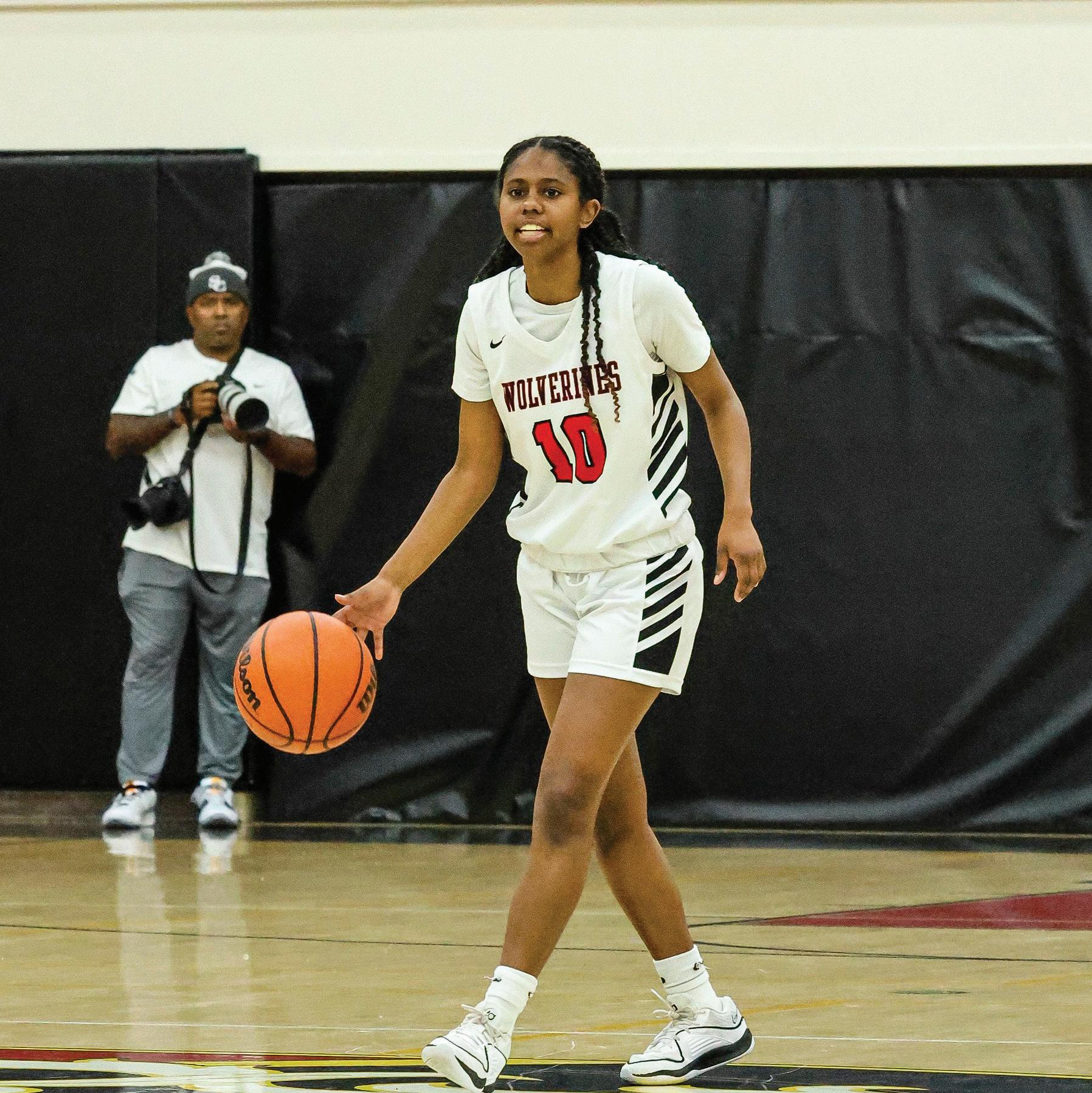
made me happy. I talked to my mom, and we decided to give basketball one more chance for the summer and see what happened.
The summer before junior year was promising enough that I returned. Not for the sport, but for the bond with my teammates. The shared anxieties before a Friday practice, whispered jokes and knowing glances from across the court are the things that kept me going. When basketball season ended again, I decided to try track. It was a new experience, and I wasn’t the best at it. Yet, the support and encouragement I received from my teammates, was enough to make the 400 seem durable.
Now, in my senior year, the realization that everything I do will be for the last time has fueled a determination to give it my all. This season, our team has had its ups and downs, but I’m trying to enjoy every second of it because I know that I’ll never meet a more amazing or funny basketball team than the one right now.
My journey through sports has felt like a marathon. It has taught me the grit of resilience, the power of connection and the bittersweetness of letting go. Though I don’t know if I want to play any sports in college, I know that the school has equipped me with the experiences and resilience to thrive in any sport I choose. For now, I’m going to cherish every moment, laugh and layup with my teammates as I culminate the end of my sports journey.
WOLVERINESONLY PRINTED WITH PERMISSION OF DARLENE BIBLE Feb. 1, 2024 D8 Sports The Chronicle







 SENIOR STATS: Seniors focus on a lecture in Advanced Placement (AP) Statistics after receiving college decisions. From the Class of 2024, 206 students applied Early Decision, Restrictive Early Action or Single Choice Early Action.
HANNAH SHAHIDI/CHRONICLE
SENIOR STATS: Seniors focus on a lecture in Advanced Placement (AP) Statistics after receiving college decisions. From the Class of 2024, 206 students applied Early Decision, Restrictive Early Action or Single Choice Early Action.
HANNAH SHAHIDI/CHRONICLE




 EXCHANGE EXPERIENCE: Lisa Suen, a foreign exchange student from the World Leading Schools Association in Shanghai (WLSA), paints on a collaborative canvas installed in Feldman-Horn Gallery. Suen is one of the six high school students the school hosted from Jan. 22 to Feb. 2.
CONNOR TANG/CHRONICLE
EXCHANGE EXPERIENCE: Lisa Suen, a foreign exchange student from the World Leading Schools Association in Shanghai (WLSA), paints on a collaborative canvas installed in Feldman-Horn Gallery. Suen is one of the six high school students the school hosted from Jan. 22 to Feb. 2.
CONNOR TANG/CHRONICLE















 CHUNG
CHUNG































































































